AMID DESPERATION IN PALESTINE, A CHRISTIAN CALL FOR ADVOCACY

DISPLAY UNTIL 7/31/2023


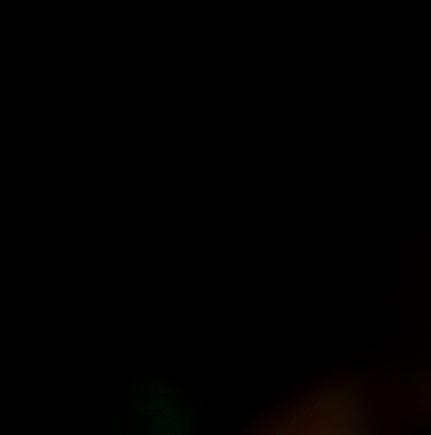












DISPLAY UNTIL 7/31/2023













Volume XLII, No. 4
June/July 2023
INTERPRETING THE MIDDLE EAST FOR NORTH AMERICANS ✮ INTERPRETING NORTH AMERICA FOR THE MIDDLE EAST
8 Israel at 75: A Colonial Project Unmasked —Ida Audeh
12 The 75th Anniversary of the Nakba—Two Views Dr. Ramzy Baroud, Rev. Alex Awad
16 Khader Adnan’s Martyrdom Mariam Barghouti
18 Radio Personality Lubna Al Turki Brings Hope to Loyal Listeners in Palestine Hasan Aga
20 Experiencing Ethnic Cleansing in Real Time Photos and article by Cassandra Dixon
24 The Campaign Against the U.N.’s Human Rights Official on Palestine Al Jazeera Staff
26 Three Political Visits to Israel Dr. James Zogby
28 Amid Desperation in Palestine, a Christian Call for Unapologetic Advocacy Dale Sprusansky
34 Israel Didn’t Want Quiet Gideon Levy
35 Gazans Carry On During Latest Israeli Assault Khaled El-Hessy
36 A Love Story Cut Short by Israeli Aggression in Gaza Mahmoud Mushtaha
SPECIAL REPORTS
22 The ICC and U.S. Hypocrisy Walter L. Hixson
30 George Washington University Students Battle Zionist Bullying on Campus Priya Aravindhan
32 For Judaism, It Is Increasingly Clear, Zionism Was a Dangerous Wrong Turn Allan C. Brownfeld
38 Surprise Boycott Move Costs Indonesia Soccer Hosting Rights John Gee
40 Firas Zreik: The Paco de Lucia of the Qanun Emilie Pons
42 Guantánamo Detainees May Start Dying if the U.S. Does Not Act Yumna Rizvi
44 NATO’s Intervention Threatens Libya’s Unique Man-Made River Mustafa Fetouri
47 Canadians Remain in Northern Syrian Detention Camps Despite Court Ruling Candice Bodnaruk
ON THE COVER: Amina al-Dibai, one of nearly 6 million Palestinian refugees, recounts her story during an interview at the Rafah camp in the southern Gaza Strip on April 12, 2023. Born in 1934, al-Dibai was still only a child during the Nakba, or catastrophe, during which more than 600 communities were destroyed or depopulated by Jewish forces. See articles pp. 8-14.
(PHOTO BY MAHMUD HAMS/AFP VIA GETTY IMAGES)The Price of Solidarity: Palestine, Indonesia and The “Human Rights” Dilemma, Ramzy Baroud, www.ramzybaroud.net
Oslo, the Capital of Norway, Announces Boycott of Goods Produced in the IsraeliOccupied Territories, Juan Cole, www.juancole.com
How to Ignore Israel’s Apartheid: Learn From Ursula von der Leyen, Andrew Mitrovica, www.aljazeera.com
“Death to Christians”: Violence Steps up Under New Israeli Government, Steven Davidson, www.aljazeera.com
Foreign Affairs Magazine Lays Down the Facts About Israel Apartheid and Jewish Supremacy, Nasim Ahmed, www.middleeastmonitor.com
Israelis “Have No Other Country”?, Gideon Levy, Haaretz
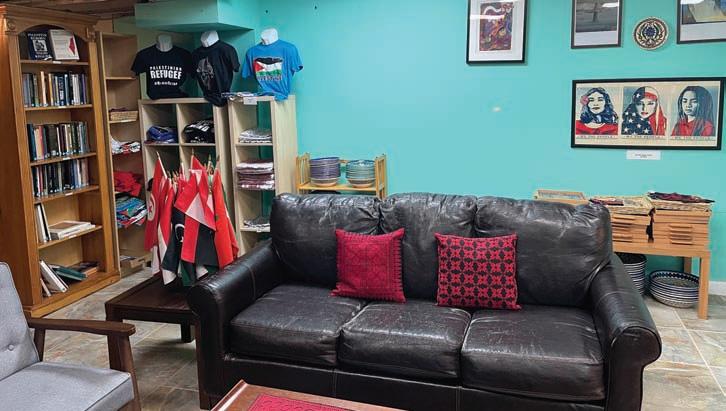 Compiled by Janet McMahon
Compiled by Janet McMahon
Is the U.S. Finally Losing Influence in the Middle East?, Melvin Goodman, counterpunch.org
Free Will Trumps Determinism In Gulf Politics, M.K. Bhadrakumar, www.peoplesdispatch.org
Son of Iran’s Last Shah Gets Mixed Reactions to Visit to Israel, Maziar Motamedi, www.aljazeera.com
Sudan’s Tragedy: Rogue Generals and Failed Coups, Marwan Bishara, www.aljazeera.com
Arab Americans Are a Much More Diverse Group Than Many of Their Neighbors Mistakenly Assume, Yasmin Moll,
A Small Dip in Islamophobia in The U.S. Gives Us Hope, Corey Saylor, www.aljazeera.com
This issue went to press on the one-year anniversary of the killing of Al Jazeera journalist Shireen Abu Akleh by Israeli forces. In the past year, extraordinary work has been done by journalists, private analysts and human rights organizations to prove unequivocally that the Palestinian-American journalist was deliberately assassinated by the Israeli army while she was reporting from occupied Jenin.
Despite the abundance of evidence, Israel has refused to hold those responsible for Abu Akleh’s killing accountable. Meanwhile, the Biden administration has been, at best, tepid in its pursuit of justice and accountability, even in the face of rare bipartisan congressional support for a transparent and decisive investigation into the slaying. Much can be said about the hypocrisy of the U.S. pertaining to Abu Akleh’s killing (and almost everything Palestine related), but the bottom line is that it’s far past time for Washington to treat Israel like a normal country and hold it accountable to uphold basic standards of human rights.
Remembrances of Shireen Abu Akleh coincided with commemorations of the 75th anniversary of the Nakba, when Palestinians were first driven from their homes by Jewish militias in order to create the State of Israel. Unsurprisingly, Speaker of the House Kevin McCarthy (R-CA) decreed remembering the Nakba to be an anti-Semitic act and prohibited a Nakba memorial event from taking place in the Capitol Visitor Center on May 10. Nonetheless, the event, headlined by Rep. Rashida Tlaib (D-MI), went on thanks to Sen. Bernie Sanders (I-VT) providing a last-minute venue in the Senate. “Let the headlines read ‘McCarthy tries to erase Palestine but fails,’” Tlaib tweeted after the event.
Perhaps if McCarthy read the issues of
this magazine delivered to his office, he would have realized that the sumud (steadfastness) of the Palestinian people cannot be quelled via petty political games. See pp. 12-14 of this issue for more on 75 years of Palestinian sumud Also be sure to read Ida Audeh’s authoritative overview (p. 8-10) of Israel’s failure to erase the Palestinian people.
As we went to press, Gaza was again under attack by Israel. Per usual, Israel and its propagandists tried to blame Palestinians for their own suffering, even as they keep the refugee-majority enclave blockaded and impoverished. This issue features two accounts from Gaza (pp. 35-36), including a heartbreaking story of a man losing his fiancée to Israeli bombardment. Gideon Levy (p. 34) also explains the Israeli penchant for desiring violence. The Israeli insistence on calling Palestinians terrorists for responding to Israeli provocations and ethnic cleansing reminds us of lyrics from “Joe McDonnell,” a song written by the Irish group The Wolfe Tones regarding the British: And you dare to call me a terrorist, while you look down your gun. When I think of all the deeds that you have done…You brought this reign of terror to my land
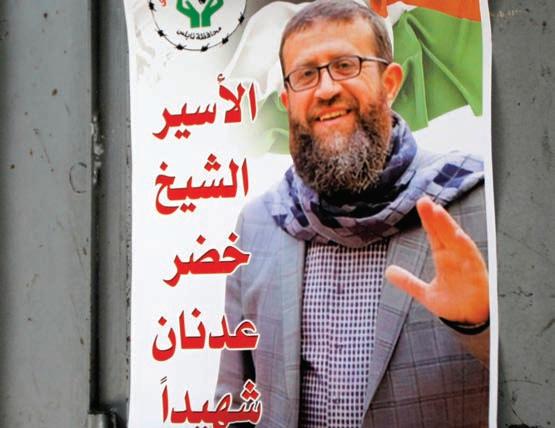
After enduring many hunger strikes protesting his administrative detention without charge or trial, Khader Adnan died in Israeli custody in May. Mariam Barghouti (p. 16) outlines his history of resistance and the Palestinian response to his martyrdom. Be sure to read Adnan’s final will and testimony at the end of the article, which outlines his love of God, family and country, as well as his faith that his act of resistance will pay long-term dividends. His testimony again reminds us of other words from the song “Joe McDonnell,” named after an Irish hunger striker: Through those many months internment in the Maidstone and the Maze, I thought about my land throughout those days. Why my country was divided. Why I was now in jail. Imprisoned without cause or without trial. And though I love my country, I am not a bitter man.
Our plan to expand Middle East Books and More is moving forward! After meeting with an architect, we are prepared to begin obtaining city permits and review renderings of our expanded community space. Lest anyone doubt the need for this expansion, we hosted a sold-out event with the Museum of the Palestinian People in our current space on May 11. The new space will allow us to more than double our capacity and reduce the likelihood of having to turn people away from our events! While we have received many generous donations to fund the initial stages of the expansion, we still need funds to cover the total cost of construction. As you receive our mid-year donation appeal in the mail, we ask you to be generous and ensure the long-term success of the bookstore and this magazine.
Make a Difference Today!
Executive Editor: DELINDA C. HANLEY
Managing Editor: DALE SPRUSANSKY
Contributing Editors: WALTER L. HIXSON JULIA PITNER IDA AUDEH
Other Voices Editor: JANET McMAHON
Middle East Books
and More Director: NATHANIEL BAILEY
Finance & Admin. Dir.: CHARLES R. CARTER
Assistant Bookstore Dir.: HAJIRA ASGHAR
Art Director: RALPH UWE SCHERER
Founding Publisher: ANDREW I. KILLGORE (1919-2016)
Founding Exec. Editor: RICHARD H. CURTISS (1927-2013)
Board of Directors: HENRIETTA FANNER
JANET McMAHON
JANE KILLGORE
Washington Report on Middle East Affairs (ISSN 87554917) is published 7 times a year, monthly except Jan./Feb., March/April, June/July, Aug./Sept. and Nov./Dec. combined, at 1902 18th St., NW, Washington, DC 20009-1707. Tel. (202) 939-6050. Subscription prices (United States and possessions): one year, $29; two years, $55; three years, $75. For Canadian and Mexican subscriptions, $35 per year; for other foreign subscriptions, $70 per year. Periodicals, postage paid at Washington, DC and additional mailing offices. POSTMASTER: Send address changes to Washington Report on Middle East Affairs, P.O. Box 292380, Kettering, OH 45429.
Published by the American Educational Trust (AET), a nonprofit foundation incorporated in Washington, DC by retired U.S. foreign service officers to provide the American public with balanced and accurate information concerning U.S. relations with Middle Eastern states. AET’s Foreign Policy Committee has included former U.S. ambassadors, government officials, and members of Congress, including the late Democratic Sen. J. William Fulbright and Republican Sen. Charles Percy, both former chairmen of the Senate Foreign Relations Committee. Members of AET’s Board of Directors and advisory committees receive no fees for their services. The new Board of Advisers includes: Anisa Mehdi, John Gareeb, Dr. Najat Khelil Arafat, William Lightfoot, George W. Aldridge and Susan Abulhawa.
The Washington Report on Middle East Affairs does not take partisan domestic political positions. As a solution to the Palestinian-Israeli dispute, it endorses U.N. Security Council Resolution 242’s land-for-peace formula, supported by nine successive U.S. presidents. In general, it supports Middle East solutions which it judges to be consistent with the charter of the United Nations and traditional American support for human rights, self-determination, and fair play. Material from the Washington Report may be reprinted without charge with attribution to Washington Report on Middle East Affairs. Bylined material must also be attributed to the author. This release does not apply to photographs, cartoons or reprints from other publications.
Indexed by ProQuest, Gale, Ebsco Information Services, InfoTrac, LexisNexis, Public Affairs Information Service, Index to Jewish Periodicals, Ethnic News Watch, Periodica Islamica.
CONTACT INFORMATION:
Washington Report on Middle East Affairs
Editorial Office and Bookstore: 1902 18th St. NW, Washington, DC 20009-9062
Phone: (202) 939-6050 (800) 368-5788
Fax: (202) 265-4574
E-mail: wrmea@wrmea.org • bookstore@wrmea.org
circulation@wrmea.org
advertising@wrmea.org • donations@wrmea.org
Web sites:
http://www.wrmea.org
http://www.middleeastbooks.com
Subscriptions, sample copies and donations: P.O. Box 292380, Kettering, OH 45429
Phone: (800) 607-4410 • Fax: (937)-890-0221
Printed in the USA
Israel continues to subject its imprisoned Palestinian population to additional cruel and humiliating treatment. ln its latest report, Amnesty International highlights the latest indignity: the use of an experimental facial recognition system to track and control Palestinian movements. The report reveals an ever-growing surveillance network in the occupied West Bank city of Hebron and East Jerusalem, where Israeli settlements are continually expanding within Palestinian areas.
It is shameful that our government continues to reward Israel’s criminal behavior with $3.8 billion each year and permits members of Congress to attend Israel lobby-paid junkets to the country. Israel’s democracy has died by a thousand cuts and no longer merits our support.
It is outrageous that Rep. Kevin McCarthy (R-CA), the Speaker of the House, has invited Israeli Prime Minister Binyamin Netanyahu—who has been charged with serious corruption charges, eviscerated the power of the Israeli judiciary and attacked Palestinians—to address Congress.
Jagjit Singh, Los Altos, CA
A recent Associated Press article titled “U.S. Sanctions Russia, Iran Entities for Detaining Americans” shows the hypocrisy in our foreign policy. Last year, Israeli occupation forces beat a Palestinian-American citizen in his late 70s to death and then assassinated PalestinianAmerican journalist Shireen Abu Akleh in cold blood. Now, Israel holds another American citizen, Jamal Niser, in administrative detention, meaning no charges and no trial for over a year.
Where are the U.S. sanctions on the apartheid nation of Israel? When will the leaders of our country end our subservience to Israel and find the courage to investigate these atrocities that Israel
routinely commits against American citizens?
Ray Gordon, Venice, FL
Re: “American Zionists Accuse Israel of De-Judaizing The Jewish State,” published in the May 2023 “Other Voices” supplement. If, according to Israel’s “Law of Return,” being considered Jewish requires proving one has (or had) at least one Jewish grandparent, wouldn’t one also have to prove that that grandparent was Jewish by proving that that grandparent had a Jewish grandparent, and so on? (Sorry for the run-on sentence, but in this case it suits the subject.) How far back would one have to go—the time of King David? Abraham? Moses in Egypt? Adam and Eve? (No, Adam and Eve couldn’t have been Jewish by that definition.)
No wonder Adam Keller of Gush Shalom refers to Israel as a “crazy country.” But aren’t all racial, ethnic, religious, gender and etc. distinctions as a basis for citizenship?
Gregory DeSylva, Rhinebeck, NY
Thanks to Washington Report managing editor Dale Sprusansky for addressing our group on the topic “Israel, the U.S. and Questions Of Democracy” in April. He did a super job. A friend wrote a note to me this morning and said she very much liked the conversational style of presentation. So did I. It’s both refreshing and engaging.
We especially appreciate that he gave listeners specific things to do. And we agree totally with him that the “way in” to a conversation with people who are on the fence or who “like Israel” or feel defensive of it is to focus on justice. All people deserve justice.
Kathleen Campbell (who moderated the virtual discussion hosted by Middle East Peace Now)
The entire conversation can be
viewed online at this link: <www. youtube.com/watch?v=5zTLQwNZ0iI>.
Also see p. 55 for a summary of a recent event on the Israel lobby hosted by Voices From the Holy Land and cosponsored by the Washington Report.
The “Middle East Books Review” is my favorite component of the March/April 2023 issue. Steve France’s review of Palestine Hijacked is excellent and I truly was moved by Delinda C. Hanley’s sensitive account of Mosab Abu Toha’s book reading of Things You May Find Hidden in My Ear: Poems from Gaza, and personal accounts of what he and others have endured as Gazans.
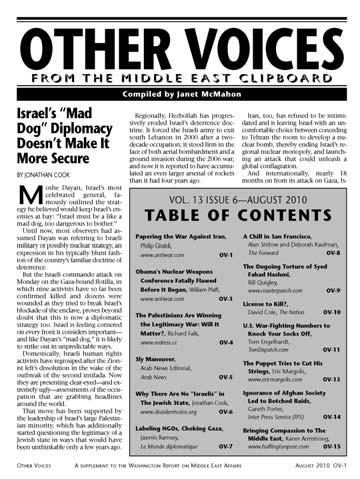
Copies of Dr. Walter L. Hixson’s biting account of hypocrisy among those who cite Dr. Martin Luther King, Jr.’s legacy while avoiding any discussion—much less denunciation—of Israeli apartheid should be sent to the Congressional Black Caucus and numerous Black civil rights organizations.
One activism deserved a higher profile in my opinion: Dale Sprusansky’s writeup of Jehad Abusalim’s discussion of supposed anti-Semitism among Palestinians, “Exploring Palestinian Views on AntiSemitism.” This has long been an issue that has rankled me personally, and I suspect most other Arab Americans. It’s akin to that “self-hating Jew” nonsense. People from all ethnic and religious backgrounds should be able to object to specific policies and actions undertaken by any person, group, society or nation without being labeled a hater.
George
Aldridge, Bissen, Luxembourg“A Requiem for a Lost Iraq,” published in the May 2023 issue, painted a rosier picture than was realistic about the U.S. destruction of the country. About a decade ago, one study estimated Iraqi deaths as a result of the invasion to be over one million. The U.S. did not try to introduce democracy as much as to introduce a totally privatized society with no public services. Iraq’s income plummeted because the U.S. was ripping off the country’s resources. The U.S.-made
Send your letters to the editor to the Washington Report, P.O. Box 53062, Washington, DC 20009 or e-mail <letters@wrmea.org>.
constitution was to guarantee dissension between Iraq’s factions, not to benefit Iraqis in any way. ISIS was created under U.S. control.
I was also disappointed in the article on Yemen, focusing only on the landmine situation, as it ignores the major problems facing Yemen. I was outraged by the blame placed on the Houthis, which escalates the widespread misunderstanding of Yemen’s entire conflict.
Karin Brothers, Toronto, Canada
Cancel my subscription to the Washington Report . I don’t want to support a magazine that echoes the imperialist narrative about the Islamic Republic of Iran. Since 1979, no other nation-state has consistently and unwaveringly supported the Palestinian people’s struggle against Zionist oppression and apartheid. All Palestinian liberation forces recognize the revolutionary government’s contributions and efforts to support their struggle. While the so-called international community continuously looks the other way during Israeli murder and tyranny, Iran stands up for Palestine. As many Arab governments embrace normalization with the apartheid state, Iran and it’s allies, the Axis of Resistance continues to support Palestinian liberation.
Despite all the Western and Israeli sanctions and assassinations, the Islamic Republic stands stronger than before. Your January/February 2023 issue included an
article, “The Next Iran” by Sohrab Ahmari, that advocated the replacement of this revolutionary government by a “nationalist government.” Then Iran could be as selfish as other nation-states, only caring about themselves. Sudan did, and now they are seeking normalization of ties with the Zionist apartheid state, while the Sudanese people are enraged!
There is much more to be said about this. I will publicly debate anyone about Iran’s solidarity with Palestine. Shame on the Washington Report for supporting regime change to the most consistent supporter for Palestinian liberation.
Timothy Kaminski, St. Louis, MO■
OTHER VOICES is an optional 16-page supplement available only to subscribers of the Washington Report on Middle East Affairs. For an additional $15 per year (see postcard insert for Wash ington Re port subscription rates), subscribers will receive Other Voices inside each issue of their Washington Report on Middle East Affairs.
Back issues of both publications are avail able. To subscribe, telephone (800) 607-4410, e-mail <circulation@wrmea. org>, or write to P.O. Box 292380, Kettering, OH 45429.
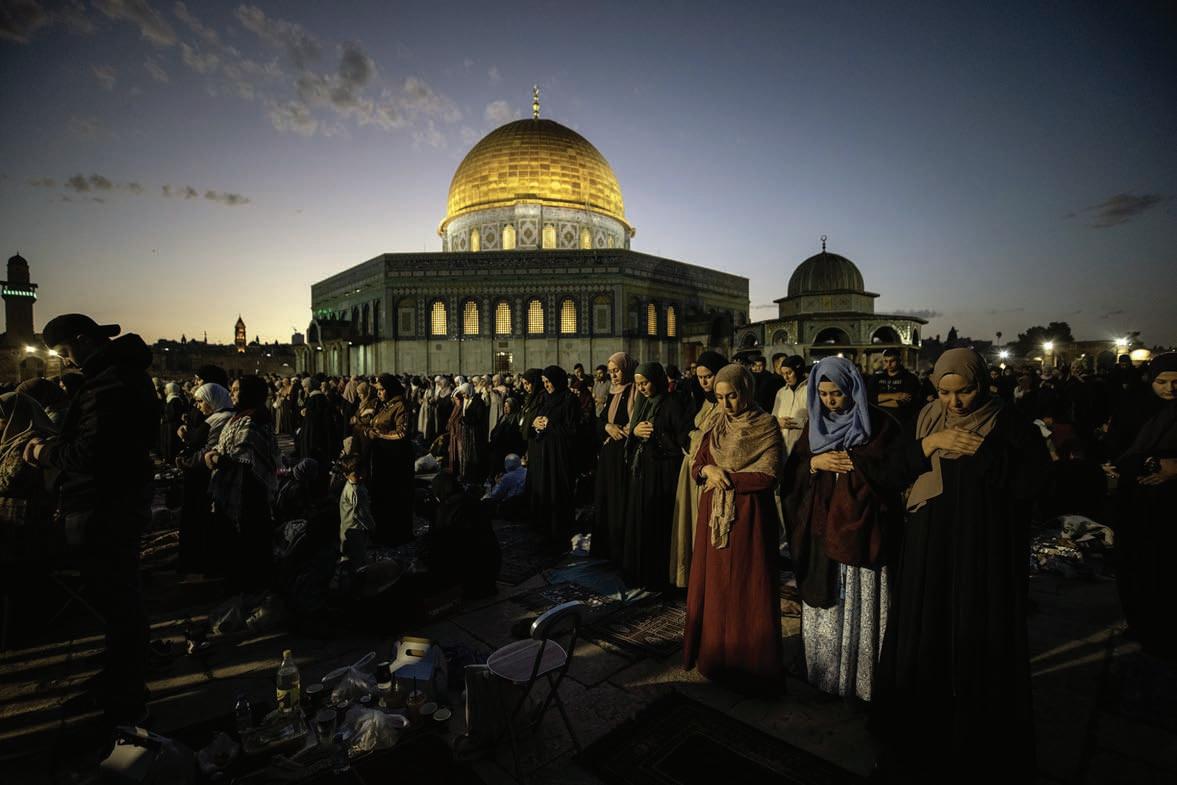 By Ida Audeh
By Ida Audeh
ISRAEL MARKED ITS DIAMOND JUBILEE in May, and although 75 years is a mere hiccup in the history of nations whose people are actually rooted in a geography, it provides sufficient time to get a handle on the nature of a fabricated state. On its 75th birthday, Israel stands unmasked as an apartheid regime, an anachronism in the 21st century. Its Palestinian victims have known its true nature all along—after all, Israel took its place in the United Nations only after sweeping ethnic cleansing and imposition of military rule on the indigenous population it could not expel. South African and Black American visitors to the country
and its occupied territories detected the stench of apartheid and Jim Crow decades ago, but now the world knows it as well: Israel’s current government proudly and unapologetically parades its thuggish nature for the world to see.
It has always been thuggish, but it eluded meaningful censure because it had orchestras of enablers obfuscating the obvious. What did it hide? For starters, it is the only unregulated nuclear power in the world whose arsenal is not even acknowledged publicly, let alone subject to international inspection, and this at a time when North Korea and Iran are sanctioned for possibly having or planning to have nuclear bombs. It gets away with claiming to be a Jewish democracy, clearly an oxymoron, when it has more than 65 laws that discriminate directly or indirectly against Palestinians, whether they are citizens of
Israel or residents of the Palestinian territories occupied in 1967.
From 1948 until 1966 Palestinians in Israel were under military rule, unlike Jewish citizens, who enjoyed what we think of as the typical rights of citizens everywhere. In the Palestinian territories occupied in 1967, two legal systems govern the lives of Palestinians and Israeli Jews who choose to live on confiscated West Bank land—the former military law, the latter civil law. It is the textbook definition of apartheid, and more people are using that label to describe Israel. The fiction of Jewish democracy is a hard sell these days after the Knesset passed the Nation-State Law in 2018, which makes Jewish colonization a national value, explicitly privileges Jews over non-Jewish citizens of the state, and strips Arabic of the status it had as an official language of the state.
What else does it hide? It is a colonialist project, an army masquerading as a state. It has no end game other than perpetual rule over and control of the indigenous population who remain in Palestine, those who stubbornly refuse to leave despite every measure Israel implements to make their lives unliveable.
On the list of enablers, pride of place must be given to the United States, and those of us who live in it have a duty and a responsibility to understand what the government that ostensibly represents us does with our tax dollars (and perhaps of secondary interest, how it squanders the country’s prestige). Years from now, students of U.S. foreign policy will struggle to explain why the United States allowed itself to become a vassal of what is ostensibly a client state. It is a curious thing when the only superpower in the world develops such an imbalanced relationship with its “ally” that it does not dare express disagreement with it: the ally’s foot soldiers—in Congress, in the media, Israel’s lobbyists—will simply not stand for it.
The U.S. expresses its love in many ways. The monetary form is impressive: Israel gets $10.5 million dollars a day in military aid, courtesy of U.S. taxpayers. Congress pleads poverty when proposals are made to fix the country’s crumbling infra-
structure and finds that guaranteeing clean drinking water to citizens is prohibitively expensive, but Israel is always assured that it will get a handsome share of taxpayers’ money, with no real strings attached.
The months leading to presidential and congressional elections provide especially nauseating examples of candidates’ groveling to Israel, and they are never asked why fealty to a foreign country should endear them to U.S. voters. To date, the country tolerates criticism of U.S. government policies but not those of Israel. Stifling dissent is foreign to U.S. political discourse, but there is an Israel exception, it would appear, and it is enforced in true Stalinist manner by both political parties, both of which are eager to retain AIPAC’s seal of approval.
If the U.S. government and the U.S. Congress are Israeli-occupied territories, it is a real shame that U.S. citizens can’t expect the media to do its job and shed light on a foreign government’s machinations in the country’s affairs. Alas, the media is no less loyal to Israel than the U.S. government. Its obfuscation, capitulation to Israel, and censorship of news unfavorable to Israel would take several articles to explore. Consider a recent example of a news item that never really caught traction: the Haaretz report of an undercover unit that has been involved in hacking into, sabotaging and spreading misinformation in 33 presidential elections, including in the U.S. Considering how quickly and energetically the U.S. media has repeated vague claims about Russian interference in U.S. elections as facts (generated by the Democratic Party to explain Hillary Clinton’s humiliating loss to Donald Trump), one might think news organizations that pontificate regularly about the importance of free and fair elections and the peaceful transfer of power should look into credible reports of Israeli interference in U.S.
elections. But the fourth estate is generally silent, an indication of how thoroughly it has been tamed by Israel and its minions— donors and foot soldiers alike.
Not leaving anything to chance, Israel’s enablers succeeded in subverting the language to shield it from criticism. The recent redefinition of “anti-Semitism” to include language that is critical of Israel has to be recognized as an example of Israel’s power. Israel at 75 is in desperate need for such linguistic sleights of hand. Since its policies cannot stand scrutiny, better to criminalize speech altogether.
The implications of these moves became apparent in late February, when the small village of Huwara was the site of Israeli Jewish rage. Crazed Jewish settlers swarmed into the village, terrorizing Palestinian residents, shooting one and preventing the ambulance from treating him (he subsequently bled to death), and torching homes and cars. An Israeli minister, recently elected by the democratic population of Israel, calls for the village to be wiped out. Israeli media describes the barbaric assault on Huwara as a pogrom. Can U.S. citizens be critical of this savagery paid for by their tax dollars, or will their speech be criminalized because the actors are Jews acting with (Jewish) government support?
With U.S. (and other) government support assured, public criticism of Israeli policy criminalized, and a mighty army with global reach, the argument that Israel at 75 is not really sitting as securely as it wants to be might seem like a stretch. But the evidence is all around us.
Seventy-five years after expelling Palestinians from their homes, creating conditions that made it dangerous for them to remain, and making it impossible for those who left to return—in total, about 750,000— Israel has still not finished with them. They continue to demand the right to return, a right that international law guarantees everyone who leaves their home during violence for whatever reason. Israel bombs them repeatedly—in Gaza, in Lebanon, elsewhere—and their demand remains the same. They want to go home.
The Palestinians who managed to remain in what became Israel in 1948 are now a sizable percentage of the population. They know their presence is barely tolerated; they listen as their fellow citizens discuss the advisability of expelling them beyond the state’s (undeclared) borders. In Israel, property of non-Jewish citizens can be confiscated by the state, where it becomes the property of Jews.
Israel has its own version of Jim Crow, which is no less repulsive and unsustainable as the U.S. version has been and which, like the U.S. version, is being fought in the streets. The daily body count of Palestinians is matched only by the daily body count of Black men. Palestinians and Blacks make the connection. It should come as no surprise to anyone that the killers of Palestinians are training officers from the most aggressive police forces in the United States.
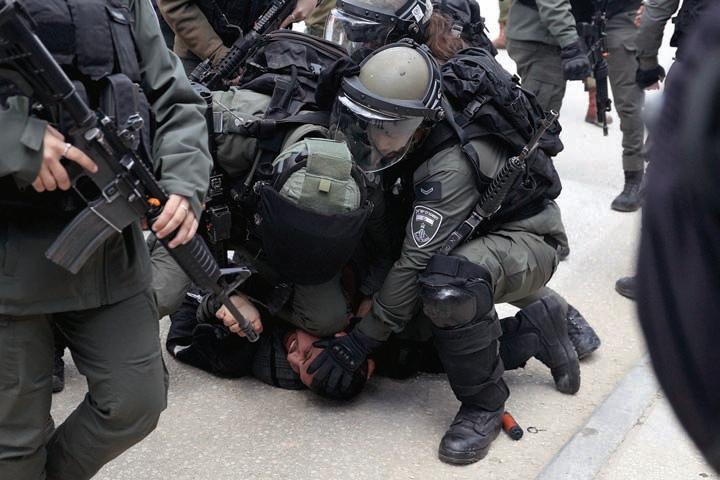
Israel has massive military might and substantial governmental support no matter what it does—international law remains elusive where Israel is concerned—yet the Jewish state comes across as insecure, even neurotic. It demands that the world, but especially those it bombs, assert that it has a right to exist. The statement itself is meaningless, yet Israel is obsessive on the subject. Did a slave-owning America have a right to exist? Did Nazi Germany or Apartheid South Africa have a right to exist? States exist, but the idea that people have to endorse states as lawful entities irrespective of their policies and treatment of their inhabitants places the state above the people who live in it. Unjust systems must be transformed. That’s just common sense.
But in fairness, Israel’s insecurity did not come from thin air. People are responding to the Boycott, Divestment and Sanctions (BDS) movement which Israel correctly perceives as aimed straight at the heart of the Jewish supremacist state.
Israelis might look at the international support that Palestinians receive and feel dismayed. In the recent World Cup games
in Qatar, Palestine was not competing but it won anyway. Every Israeli reporter who tried to interview attendees about the game was lectured about Palestine and dismissed as unwelcome in an Arab country. In demonstrations throughout the United States in recent years demanding accountability for Black and Indigenous victims of trigger-happy cops and denouncing the system that treats their community with colonial disregard, it is impossible not to see a Palestinian flag somewhere in the crowd. Activists in Palestine advised activists in Ferguson on ways to minimize the effects of tear gas. On U.S. campuses, student groups that promote BDS face organized, well-funded opposition designed to muzzle them, and in every case U.S. courts rule in their favor: the courts are not yet ready to gut the First Amendment, not even to please Israel.
Israel has the governments, but Palestine has the streets. For struggling people around the globe, the question of Palestine resonates, and its outcome is interconnected with their own struggles.
But there is a more fundamental reason for Israel to be uneasy, and it is related to the Palestinians themselves. For 75 years, Israel has been saying that Palestinians
don’t exist, and that even if they do, they are terrorists and thus of no account. It has done what it can to make life unliveable by exerting maniacal control on their movements and requiring that they carry the right permit to move even trivial distances between towns. It denies them a life with dignity. To humiliate them further, it enters into “security coordination” arrangements with the Palestinian Authority, using it to quell popular unrest. The PA’s willingness to do Israel’s bidding enrages all Palestinians.
Israel claims God gave it the land, which would be a hard sell even if they were worthy stewards. But when you look at how it ravages that land—destroying farmland, erecting the apartheid wall, setting up watchtowers and checkpoints, constructing ugly cookie-cutter settlements, in general scarring the landscape to facilitate their control of it—that claim is hard to support. They even burn fruit-bearing trees. Who does that?
The failure of Israel’s 75-year-old project is plain to see. The Palestinian poet Tamim Barghouti said it best in comments he made on the assassination of Al Jazeera correspondent Shireen Abu Akleh. Barghouti noted that Abu Akleh was killed covering the story of Israel’s assault on Jenin refugee camp, a camp she was very familiar with because she had covered pre-
vious Israeli assaults on it. When Israel repeatedly attacks the same camp over and over and continues to meet resistance each time, any sane observer should conclude that it is following a failed policy. For 75 years it has been trying to convince Palestinians that they are a defeated people, but Palestinians are not buying it.
An example of Israel’s policy and Palestinian resistance to it is provided by Jerusalem, now off limits to most Palestinians. It is a city under high-tech surveillance, a city that Jerusalem’s city planners have managed with the goal of ensuring a decisive Jewish majority. Palestinians in the suburbs Sheikh Jarrah and Silwan are resisting active settler attempts, supported by the state, to expel them. In Silwan, children as young as 8 and 9 are arrested by Israel to induce the parents to relocate, but families stay put. In response to Israel’s attempts to isolate the al-Aqsa Mosque, Palestinian Jerusalemites made it their second home.

Palestinians in Israel, whose existence as a community is threatened like it hasn’t been since 1948, know their fate is linked with Palestinians in the occupied territories, and they flock to the mosque to defend it from Jewish hooligans who have dreams of blowing it up. When Israel stormed alAqsa Mosque, firing ammunition and tear
gas inside the mosque, the Gaza Strip rose up and responded to the attack with a barrage of rocket fire, knowing that it was risking retaliation but unwilling to sit idly while Jerusalem was under attack. This past Ramadan, on the holiest night of the month, when Muslims believe that the skies of heaven are open to the prayers of believers, the Waqf estimated that 280,000 Palestinians spent the evening in worship there. Nablus and Jenin, home to the Lion’s Den of resistance fighters, have been under siege for months and their defenders have been killed, but other fighters take their place. The generation born after the signing of the Oslo accords seems unfazed by Israeli bullets.
Palestinians throughout historic Palestine, from the river to the sea, know that their power is limited in comparison with Israel—a nuclear power controlled by overt fascists who are indifferent to international public opinion (which they have learned has little muscle in any case) and whose ideology justifies genocide of nonJews. Palestinians are well aware that Israel can put them all at the mercy of the brownshirts who stormed Huwara in February. The example it has made of the Gaza Strip—placed under siege and blockade and periodically bombed whether to ensure compliance, exact re-
venge, or boost domestic government ratings—is not lost on them.
But we are not a defeated people. We refuse to succumb to a supremacist ideology so foreign to a land that has cradled three monotheistic religions, so alien to basic decency. Our history is much longer than 75 years, and we recall that would-be conquerors of Palestine from foreign lands eventually had to call it quits. We know that Israel and the philosophy it espouses will join other discredited 19th-century European colonialist distortions in the dustbin of history. Whether we never left Palestine or spent our lives in the diaspora, Palestine is our north star. For people around the globe, the Palestinian struggle against Israeli settler colonialism is a just cause, a moral cause. It inspires freedom-seeking people around the world.
Israel at 75 remains what it always was, a European settler colonial outpost in the Arab world that has tried, through its military, its surveillance technology, its cruel system of control, and its prisons, to beat a proud people into submission. But today it is Palestinians who are writing the legends that resonate around the world.
Children not yet born will learn about the six prisoners who dug a tunnel out of an Israeli prison and made their way to freedom. It was shortlived, true, but it shook the colonial prison system to its core. They will learn about Khader Adnan, a baker and father of nine whose repeated incarcerations without charge or trial prompted seven hunger strikes, the last ending with his death, on day 86, waged to assert a demand that he be left to live with his family. They will learn about the awful price paid by the people of Gaza, under siege and blockade for more than 17 years, periodically bombed and always droned but still defiant. And about the people of Jerusalem and Hebron, who are at the mercy of rabid settlers and under constant surveillance yet remain constant in their demand for a life with dignity, a demand heard by oppressed people around the world that states and armies have been unable to silence. We know the future is ours. ■
Palestinian refugees brandish keys symbolizing the homes they lost during the 1948 war, during a demonstration at the Daheisheh refugee camp outside the West Bank town of Bethlehem on May 13, 1998 . Some 500 schoolchildren joined the “march of the keys” to mark the 50th anniversary of the Nakba and the exodus of nearly 800,000 Palestinian refugees from their land.
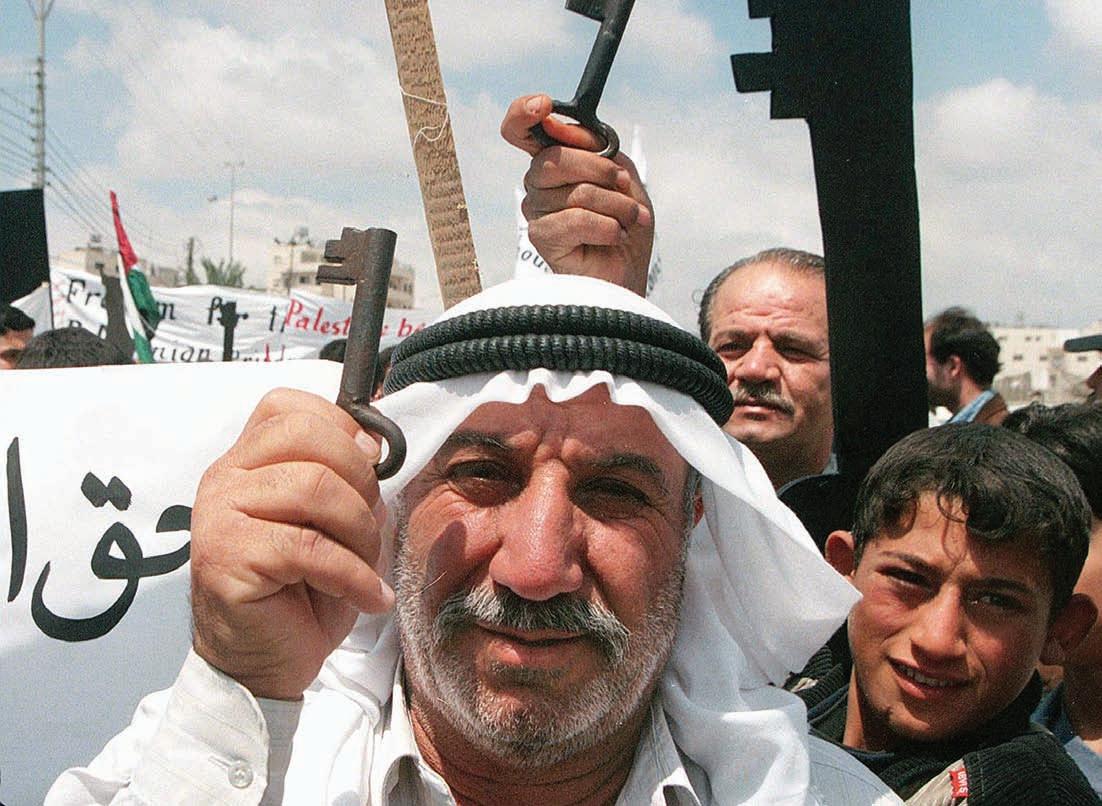
ON MAY 15, 2023, the Palestinian Nakba turned 75 years old.
Palestinians all over the world commemorated the tragic occasion, known as the Catastrophe, when nearly 800,000 Palestinians were made refugees and nearly 500 towns and villages were ethnically cleansed of their inhabitants in historic Palestine between late 1947 and mid-1948.
The depopulation of Palestine carried on for months—in fact, for
years after the Nakba was supposedly concluded. But the Nakba has never actually ended. Until this day, Palestinian communities in East Jerusalem, in the southern Hebron hills, in the Naqab Desert and elsewhere are still suffering the consequences of Israel’s quest for demographic supremacy. And millions of refugees remain stateless, denied basic political and human rights.
Dr. Ramzy Baroud is a journalist, author and editor of Palestine Chronicle. He is the author of six books, including My Father was a Freedom Fighter and The Last Earth. His latest book, co‐edited with Ilan Pappé, Our Vision for Liberation: Engaged Palestinian Leaders and Intellectuals Speak Out, is available from Middle East Books & More. Dr. Baroud is a non‐resident senior research fellow at the Center for Islam and Global Affairs (CIGA). His website is <www.ramzybaroud.net>.
In a speech delivered at the “U.N. World Conference Against Racism in 2001,” Palestinian intellectual Dr. Hanan Ashrawi aptly described the Palestinian people as “a nation in captivity held hostage to an ongoing Nakba.” Ashrawi described this “ongoing Nakba” as “the most intricate and pervasive expression of persistent colonialism, apartheid, racism and victimization.” In other words, the Palestinian Nakba does not refer to a single historical event.
Though the massive exodus of refugees in 1947-48 was a direct outcome of the Zionist ethnic cleansing campaign as devised in Plan Dalet, that event had officially ushered in a greater Nakba, which continues to this day. Plan Dalet, or Plan D, was initiated by the Zionist leadership and carried out by the Zionist militias (and later, the Israeli army) with the aim of emptying Palestine of most of its native inhabitants. They did so successfully, while paving the way for decades of violence and suffering, the brunt of which was borne by the Palestinian people.
In fact, the current Israeli occupation and entrenched racial apartheid regime in Palestine are not simply the intended or unintended outcomes of the Nakba, but rather direct manifestations of a Nakba that never truly concluded.
It is widely acknowledged, though sadly unfulfilled, that Palestinian refugees, regardless of the specific events which triggered their forceful displacement, have “inalienable” rights under international law. United Nations Resolution 194 makes it illegal for Israel to flout these rights.
Indeed, UNGA Res. 194 (III) of 1948 resolved that “refugees wishing to return to their homes and live at peace with their neighbors should be permitted to do so at the earliest practicable date.” This must be carried out, according to the U.N., by “governments or authorities responsible.”
Since Israel is the government responsible, Tel Aviv quickly moved to shelter itself from any blame or responsibility. “Top secret” files retrieved by Israeli researchers and reported in the Israeli newspaper Haaretz include the file GL-18/17028. The document demonstrates how Israel’s first prime minister, David BenGurion, attempted to “rewrite history” soon after the first and major phase of the ethnic cleansing of Palestine was completed. To achieve his aim, Ben-Gurion chose the most scandalous of all strategies: blaming the supposed flight of Palestinians on the Palestinian victims themselves.
But why would the victorious Zionists concern themselves with seemingly trivial issues as narratives?
“Just as Zionism had forged a new narrative for the Jewish people within a few decades, (Ben-Gurion) understood that the other nation that had resided in the country before the advent of Zionism would also strive to formulate a narrative of its own,” Haaretz wrote. This “other nation” is, of course, the Palestinian people.
The crux of the Zionist narrative on the ethnic cleansing of Palestine was, thus, predicated on the drummed-up claim that Palestinians had left “by choice,” even though it was becoming clear to the Zionists themselves that “only in a handful of cases did villagers leave at the instructions of their (local) leaders or mukhtars.”
However, even in these few isolated cases, seeking safety elsewhere during times of war is still not an offense, and should not cost a refugee his/her inalienable right. If the bizarre Zionist logic becomes the standard in international law, then refugees from Syria, Ukraine, Libya, Sudan and all other war zones would lose their legal rights to their property and to citizenship in their respective homelands.
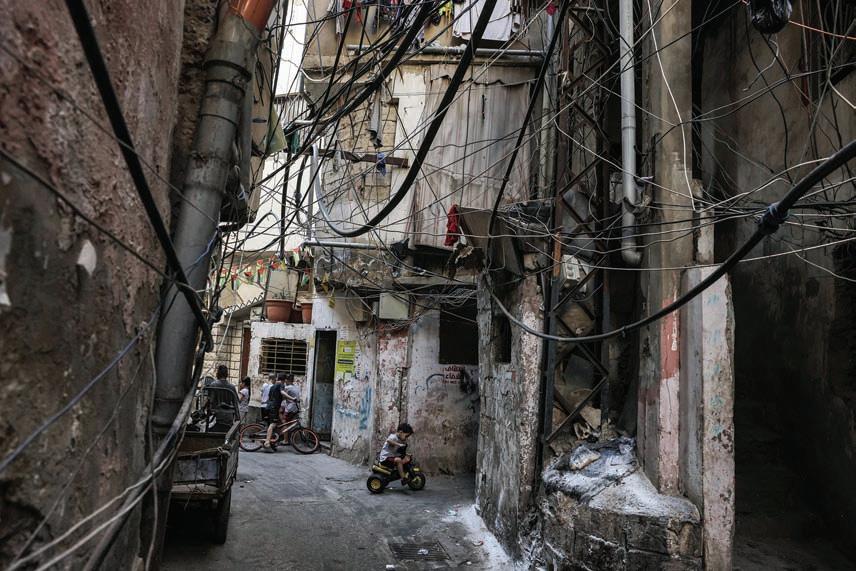
But the Zionist logic was not intended just to challenge the Palestinian people’s legal or political rights; it was part and parcel of a greater process known to Palestinian intellectuals as erasure, the systematic destruction of Palestine, its history, culture, language, memory and people. This process was reflected in early Zionist discourses, even decades before Palestine was emptied of its inhabitants, where the homeland of the Palestinian people was maliciously perceived as a “land without a people.”
The denial of the very existence of the Palestinians was expressed numerous times in the Zionist discourse and continues to be employed to this day.
All of this means that 75 years of an ongoing Nakba and the denial of the very existence of the enormous crime by Israel and its supporters require a much deeper understanding of what has fallen— and continues to befall—the Palestinian people.
Palestinians must insist that the Nakba is not a single historical event to be discussed with Israel or bargained away by those claiming to represent the Palestinian people. “The Palestinians have no moral or legal obligation to accommodate Israelis at their own expense. By any standards, Israel has such an obligation to correct the monumental injustice it has committed,” wrote famed Palestinian historian Salman Abu Sitta in reference to the Nakba and the right
of return for Palestinian refugees.
Indeed, the Nakba is an all-encompassing Palestinian story of the past, present and future. It is not only a story of victimization, but also of Palestinian sumud—steadfastness—and resistance. It is the single most unifying platform that brings all Palestinians together, beyond the restrictions of factions, politics or geography.
For Palestinians, the Nakba is not a single event. It is the whole story of their encounter with Zionism, the conclusion of which will be written, this time, by the Palestinians themselves.
I WAS BORN IN JERUSALEM in 1946. In 1948, Jewish militias and the Haganah terror groups began attacking Palestinian Muslim and Christian neighborhoods in Jerusalem. In May 1948, my father, who was a civilian, was shot and killed by a Jewish sniper, right in front of our home in Musrara (a neighborhood in Jerusalem). This left my mother with seven children and a heartbroken mother-inlaw. Soon after we buried my father, we were forced out of our home, leaving everything behind to the new invaders; we ran to the Old City for refuge. We were among 300,000 Palestinians who took refuge in East Jerusalem to escape the Zionist terror.
For those Palestinian refugees who survived, life became extremely challenging. My mother immediately went to college to become a registered nurse while volunteering in a hospital to sharpen
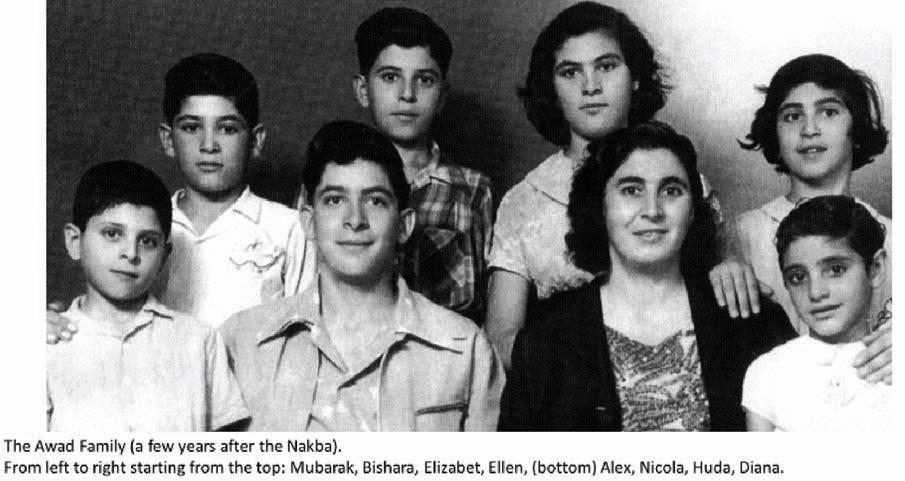
Rev. Dr. Alex Awad is a retired United Methodist Missionary. He and his wife, Brenda, served in Jerusalem and in Bethlehem for more than 25 years. Rev. Awad served as pastor of East Jerusalem Baptist Church, dean of students at Bethlehem Bible College and director of the Shepherd Society. Awad has written two books, Through the Eyes of the Victims and Palestinian Memories . Rev. Awad is a member of the Palestinian Christian Alliance for Peace (PCAP).
her medical skills. New orphanages were established in Jerusalem to provide shelter for hundreds of Palestinian children who lost one or both parents during the Zionist invasion. My mother placed my siblings and me in these homes. Through God’s grace we survived to tell our story to future generations. In 1947–1948 nearly 800,000 Palestinians were ethnically cleansed and became refugees in neighboring Arab countries. Moreover, thousands of Palestinians were internally displaced and became refugees within their homeland in what is called the State of Israel.

I look forward to the day when my Palestinian compatriots and I will stop remembering this horrific catastrophe we call the Nakba However, since Israelis continue to oppress Palestinians, besieging two million people in Gaza, stealing land in the West Bank, demolishing homes, incarcerating children and denying Palestinians their human rights, the Nakba continues, and so will Nakba remembrance.
On this occasion, my message to our Zionist oppressors is this: 75 years of killing, wounding, torturing, stealing, demolishing homes and destroying Palestinian lives and properties are enough. You have the power to make peace with us if you desire to do so. We have been waiting for decades for you to accept a fair and reasonable peace treaty. We are not calling on you to go back to Europe
(Continued on page 27)

ON MAY 2, the Palestinian hunger striker and political activist, Sheikh Khader Adnan, died inside the Ramleh prison clinic.
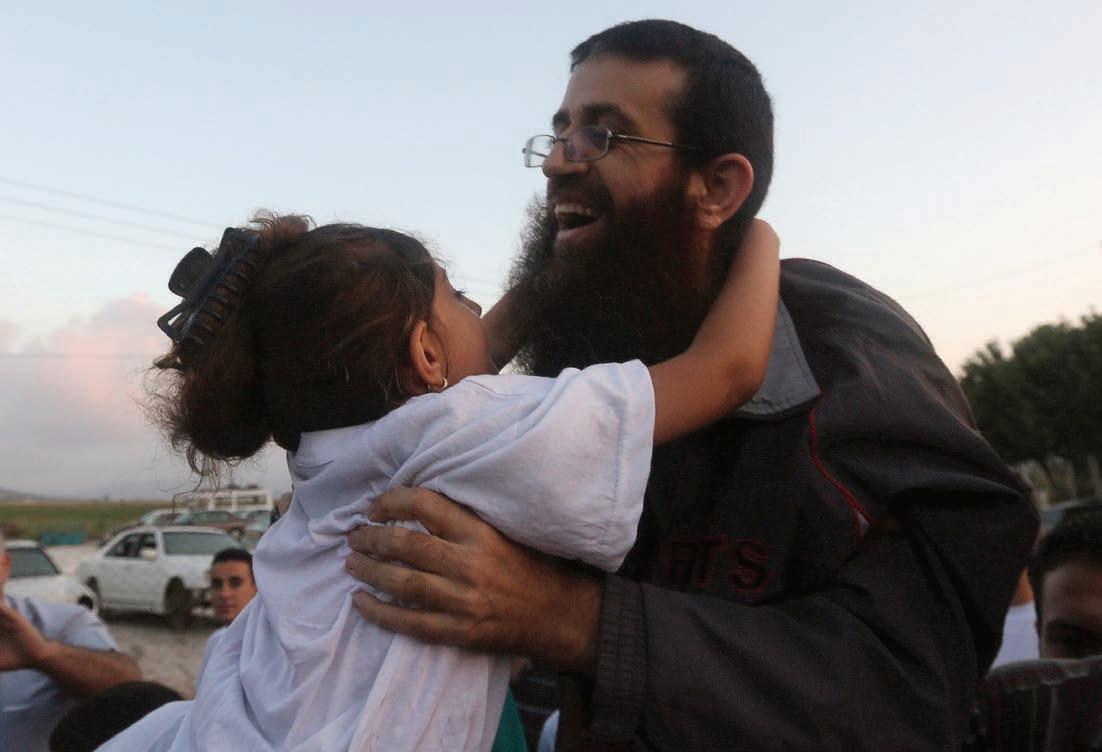
Since Feb. 5, 2023, Adnan, 44, has been on hunger strike protesting his imprisonment by Israel, which has been targeting and harassing the Palestinian political figure and advocate for resistance over the past decade. Adnan was the veteran of seven previous hunger strikes before his most recent one and was unlawfully imprisoned by the Israeli authorities without charge or trial several times in the past decade.
Adnan’s latest arrest was due to his affiliation with the militant Palestinian resistance group, the Palestinian Islamic Jihad (PIJ), whose armed wing, Saraya al-Quds, is part of the umbrella faction of the Jenin Brigade—the armed resistance group operating out of Jenin refugee camp. But beyond the immediate reasons for his im-
prisonment, the Israeli authorities have constantly harassed Adnan over the years because he has continued to be a well-known proponent of resistance during a period of political atrophy and persisted in advocating for the prisoners’ movement, for the families of martyrs, and opposition to the Palestinian Authority’s collaborationism and security coordination at a time when such advocates of political struggle have been scarce. Moreover, after Adnan’s first victory over the Israeli Prison Service (IPS) in 2012 during his first hunger strike, after which he obtained his freedom, he became an icon of Palestinian defiance in the face of injustice.
His eighth hunger strike was his last. Adnan is the first Palestinian hunger striker to die since the 1970s when several Palestinian hunger strikers were killed as a result of being force-fed by the Israeli prison authorities. Adnan is also the 237th Palestinian to be killed inside Israeli
Adnan
prisons since 1967. is from Arrabeh, Jenin, and is survived by his wife, Randa Moussa, 41, and their nine children. Less than two weeks beforehis death, Moussa had warned this writer that Adnan’s life was in peril due to the cumulative toll that his hunger strike and previous hunger strikes have had on his body and due to the intransigence and medical negligence of the IPS.
According to the IPS, Adnan “was found unconscious in his cell” on the day of his death. The IPS also emphasized that Adnan had been refusing medical treatment, a statement repudiated by his lawyer, who stated that Adnan’s death came as a direct result of intentional Israeli medical negligence.
Adnan’s wife Randa noted in our previous interview that the Israeli prison’s clinic was insufficient for providing the necessary care for a hunger striker and that her husband was being intentionally kept in the clinic for purposes of overriding international law concerning prisoners’ rights, which would allow for the prison’s medical personnel to forcefeed Adnan should he fall into a coma.
Despite his deteriorating health, Adnan’s next court hearing was scheduled to take place on May 10.
On Sunday afternoon, April 30, the Ofer military court refused the appeal put forth by Adnan’s legal team to enforce a previous court order for releasing Adnan. Due to his deteriorating health, Adnan had been joining his court trials via video. By late Tuesday morning on the day of his death, Israeli authorities moved the hunger striker’s corpse to the Abu Kabir medical facility near Jerusalem.
On Tuesday afternoon, hours after his death, Israeli authorities moved forward to perform an autopsy on the hunger striker’s body, against Adnan’s final will that his body not be cut open and autopsied in the event of his death.
According to statements made to the press by Adnan’s legal team, an appeal was submitted to the Israeli courts to ban the autopsy. Meanwhile, Adnan’s family awaits the ruling of Israeli authorities on whether the family will be able to receive and bury Adnan next to his father’s grave, in accordance with his final wishes.
In light of Khader Adnan’s martyrdom, Palestinian cities and towns were closed in the West Bank, while protests were already spreading sporadically, most prominently in Jenin, Adnan’s hometown.
In a statement to the press, Randa Moussa stated that “there will be no funeral wake for the Sheikh, but we will receive those that will congratulate us in celebration of his martyrdom,” echoing the common Palestinian reverence for martyrs—not only for martyrdom’s religious significance but because it is seen as a necessary sacrifice in the fight against colonialism and its injustices.
Palestinian protests and vigils have emphasized the intentional nature of Adnan’s death, describing it as a cold-blooded execution, especially in connection with his previous hunger strikes in 2012 and 2018, which had already caused permanent damage to his body and put him at greater risk of death.
By the early afternoon, Palestinian youth began joining protests near military checkpoints and illegal settlements in the West Bank, protesting Adnan’s killing and abuses against Palestinian detainees.
According to Palestinian legal experts, the killing of Khader Adnan is also part of Israel’s ongoing targeting of Palestinian political detainees, and the most recent policy pushed forward in the Israeli Knesset has called for the death penalty to be applied to Palestinian detainees convicted of “terrorism.”
The Palestinian Higher Emergency Committee for Palestinian Detainees released a statement on the occasion of Adnan’s killing, calling on all Palestinian political factions to rally against the crime, which resulted in Adnan’s slow killing. The statement asserted that Adnan’s death is a reminder of the moral obligation toward Palestinian political detainees.
Adnan left behind a final will that he wrote in April, in anticipation of his death. It reads:
As my soul approaches martyrdom, it is my duty to write my final will…
Praise be to God that he enabled me to undergo a hunger strike for freedom…
I am writing to you my final words from our beloved Palestinian town of al-Ramleh, as my flesh has dissolved and my bones have wasted away and my strength has failed me. This is my final will to my family, my children, my wife and my people.
To my wife, I implore you and my children to fear God…and to speak the truth in every time and place…and to know that the greatest Palestinian homes are the houses of martyrs and the injured and the righteous.
I implore my uncles, my relatives, my neighbors…not to leave anyone with a moral or material right over me, for I who loves you am in greatest need of God’s mercy…if I am martyred, do not let the occupier cut up my body, and bury me near my father, and write upon my grave “Here lies the impoverished servant of God, Khader Adnan”…and make my grave a simple one and ask of God to forgive me…
To [my wife] Um Abdulrahman, and to my children Maali, Bisan, Abdulrahman, Muhammad, Ali, Hamza, Mariam, Omar, and Zaynab, please forgive me…
To my people, I send you this will with love and greetings, with complete confidence in God’s mercy…this is God’s land, and it is ours, and it contains a promise, the promise of the afterlife. Do not despair, for whatever the occupiers may do, no matter how much they may trespass upon us with their occupation and injustice…God’s victory is near…
My greetings to the families of martyrs and prisoners, my greetings to them and to all revolutionaries and free peoples.
To Um Abdulrahman: I am your loving husband,
To my children: I am your loving father, To my siblings: I am your loving brother, To my people: I am your loving son, Pray for me that He may accept me as his devoted martyr.
With love,
Khader Adnan, Al-Ramleh clinic. ■
IN THE CITY OF HEBRON, Palestine, the door of a well-lit, air-conditioned meeting room opens and Lubna Al Turki strides in. Tall and slim, covered in modest yet stylish clothing and a hijab, she walks with a sense of purpose and extends her arm to shake my hand and that of my male colleague.
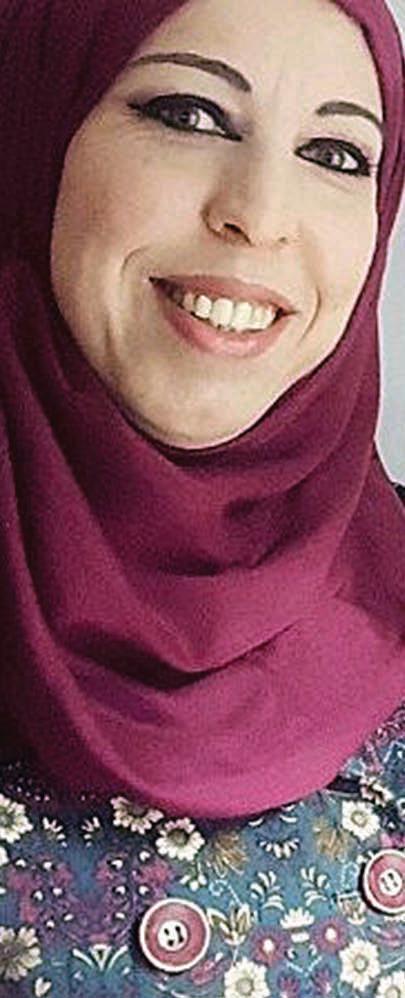
Usually this wouldn’t be an action worth mentioning. However, in this ultra-conservative city it is rare to find a female who shakes the hand of a man who isn’t a relative, demonstrating a level of confidence and authority not found in most Hebron women. A warm smile and an apology for being late; one of her radio programs was due to go on air soon.
A well-known radio personality, TV presenter and journalist, Al Turki takes a seat and tells us she will do her best to answer all our questions. She began her career in 2009 as a TV presenter, and after a few years she decided she wanted a new challenge.
Transitioning to radio, she began working for the ever popular Al Hurriya News Agency Radio with her first program, one of three which are still on the air today, delving into self-care, psychology and social issues. A popular segment of this program led to the creation of a radio show on Palestinian youth. To this day it is the most listened to radio program on the air in Palestine.
“This is for children, students, university students and young professionals, everyone is welcome. The focus is on Palestinian talent, to help build their confidence, to encourage them to continue working hard on their talent. They feel immense pride after coming on my show. All their family and friends hear them and it motivates them to not give up and keep going. Since 2011 the program has brought exposure to the great talent of Palestinian youth. Alhamdullilah, this is my best achievement on the radio.”
Having spoken to many young people in Palestine myself, I found
many of them to be as frustrated with the Palestinian culture and society as they were with the Israeli occupation itself. Many conveyed their frustrations about how some of their traditions, customs and the mindset of people stopped them from progressing in the way they wanted. With Al Turki regularly engaging with the youth, I wanted to know whether she agreed with them and how change could be effected.
“Because I deal with the youth in general, I know their issues. The biggest challenge to them is that they want to change their society, its mentality and they want to participate in the responsibility of changing their society. This is what I always hear when we talk. They say they want to be like me because I work hard for myself so they also want to work hard on themselves,” Al Turki said.
“Nobody wants the situation to remain as it is. The youth of this city and this country don’t want to live the lives of their fathers and mothers and grandfathers. They are desperate for change but every change needs time. They are frustrated because they don’t have the opportunity to be in the decision-making process. The ones who are in control of that process don’t want to let that power go. So it’s a combination of things holding back the Palestinian youth, but it is this youth that will grow up and be the change they want to see. It will change, but it will take time.”
I asked her whether she thinks it’s fair to say that being conservative is what is holding Palestine back. She thought about it for a moment. “It’s about balance, we need to be more open-minded in a positive way, so that we can look after our society, build organizations, have activities for our youth so that they can experience participation in every level of society, this is what I think is needed, not conservatism to this level.”
Her mission is a noble and much needed one. Only the Palestinian youth know what it’s like dealing with the traumas which come from living under an occupation among settlers and the need for individuals like Al Turki, who aim to bring positivity, hope and optimism back into their society. At what cost? Journalists the world over are
aware of the acute danger that comes with the nature of their job, so I ask: in a place such as Palestine how difficult is it to speak out, do you have to be careful about what you say, are there topics you can’t discuss?
She smiles. “Of course. My radio station has been demolished five times by Israeli soldiers because we speak about the occupation, about what they do on a daily basis, what happens in the old city, how the settlers attack, how they continue to build illegal settlements and take more of our land, and then we get raided. They confiscate everything, all our equipment, our computers, even down to our coffee cups they have taken. The second time they destroyed our station it was Eid, the fourth time they took everything and closed us down for six months.”
I asked if Israeli authorities had ever arrested anyone at the station. “No,” she answered, “however they did threaten us saying they would arrest everyone if we were to say the words ‘occupation’ or ‘Israel’ again...that was the fifth time and along with taking all our equipment and computers they demolished the entire station, ripped
down all the walls and broke everything.”
I was shocked. “How can they do that? You are journalists, are you not protected by any legislation, nationally or internationally? Are there no agencies you can turn to?”
“We went to the International Criminal Court and were not surprised it led to nothing. Palestinian journalists have no rights. We went to our Minister of Information but again, nothing. The Israeli government just denied they ever did it and we’ve never received anything in compensation. Our radio station is quite popular in Palestine, so the people know when we’re off the air. Even President Mahmoud Abbas made a statement saying he will help us because we make an important contribution to society but then, silence. No help, no justice. This is the life of a journalist in Palestine.”
So have these repeated shutdowns of your radio station made an impact? “Unfortunately yes. We have reduced the amount of attention we give to these issues, every time our radio station has been closed we have reopened it ourselves, without any help or assistance, financial or otherwise. It
(Advertisement)
has all come from our own pockets and our end goal is to continue to be operational. There is no point if we are shutdown permanently, though I’m sure some people would want that.”
Throughout the interview Al Turki has spoken with a dignified air of defiance. She accepts the multitude of issues she faces as a journalist and as a Palestinian, but it doesn’t seem to faze her one bit. It is clear that she believes in what she’s doing, and her hard work is clearly paying off, given that every person I spoke to in Hebron about her not only knew her but held her in very high esteem, especially young women who view her as a role model.
She ended the interview the way she ends her radio shows—with a plea for mutual respect and for unity. “I have just one message, since 2009 until today. Please just respect and love each other. We don’t want war, we don’t want problems, and if you cannot love each other, then at the very least respect one another. We must be united, we must act in the way we hope for our futures to be.” ■
$20 plants 3 olive trees or 6 almond trees. Last year friends of Palestinian farmers gifted 49,000 olive and almond saplings to over 350 farmers. Farmers who have lost land due to the occupation, young farmers, and women farmers are given priority in Trees for Life.
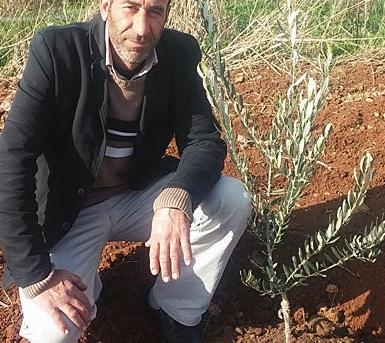
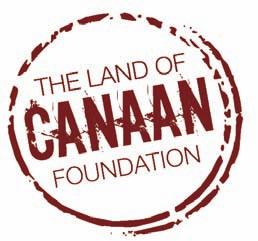
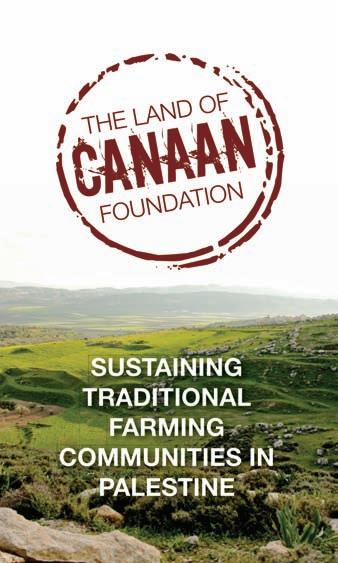
I’M A 64-YEAR-OLD WOMAN from Wisconsin. On March 7, 2023, I was attacked by an Israeli settler while standing with another international on the outskirts of Tuba village, one of 15 villages that make up Masafer Yatta, at the southernmost end of the West Bank. I was hit hard from behind with a large stick, and my companion barely escaped from another settler wielding an iron bar. The blow fractured my skull and caused a bleed in my brain.
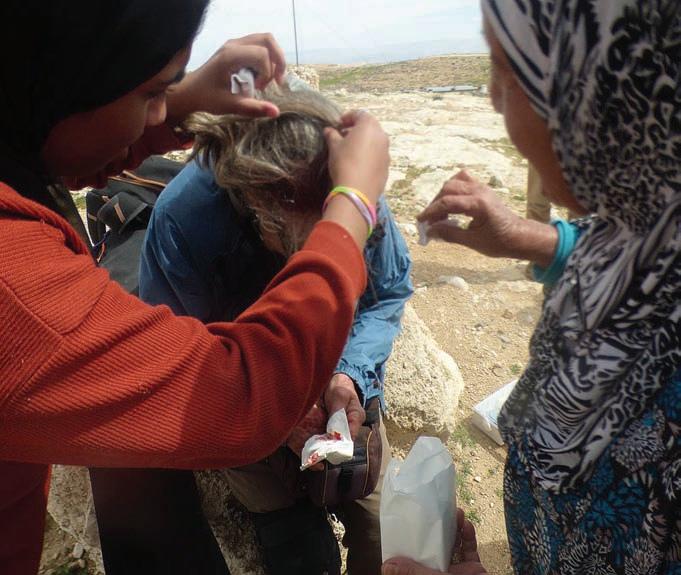
Because (and only because) I am a U.S. citizen able to enlist the State Department and my senator’s office to pressure Israel, the settler who hit me has been arrested and charged with assault. Whether he will face conviction or serious consequences is far from assured.
My case provides just a tiny glimpse of what Israel’s settler colonialism looks like for Palestinian families living in Masafer Yatta. Supported by Israeli military and police, illegal settlers are systematically stealing Palestinian grazing land, destroying crops and property, and violently attacking people and animals. The vast majority of
legal complaints filed by Palestinians are dismissed by Israeli courts, giving settlers free rein. To make matters worse, the area’s 1,300 residents are facing imminent destruction of their homes to make way for Israeli military war exercises.
To be in these 15 villages now is to witness ethnic cleansing in real time.
In the l980s, as Israeli settlers began to seize land for settlements and outposts, Israeli authorities designated a portion of Masafer Yatta as “Firing Zone 918,” one of many such zones that now occupy 18 percent of the West Bank. Former Prime Minister Ariel Sharon, who served in the IDF for more than 25 years, explained at a 1979 meeting of the World Zionist Organization: “As the person who initiated the military fire zones in 1967, they were all intended for one purpose: to provide an opportunity for Jewish settlement in the area.”
Now, 569 Palestinian children are facing eviction from their homes inside Israeli Firing Zone 918. Israeli soldiers train for war on the land surrounding their houses and schools. Tanks crush their families’ crops while helicopters terrorize the sheep and goats that are the backbone of their rural economy.
An Israeli high court decision in May 2022 ended a years-long legal battle by residents for the right to remain, and now the largest forced relocation of Palestinians since 1967 could happen at any moment. Israeli forces have already demolished schools, homes,
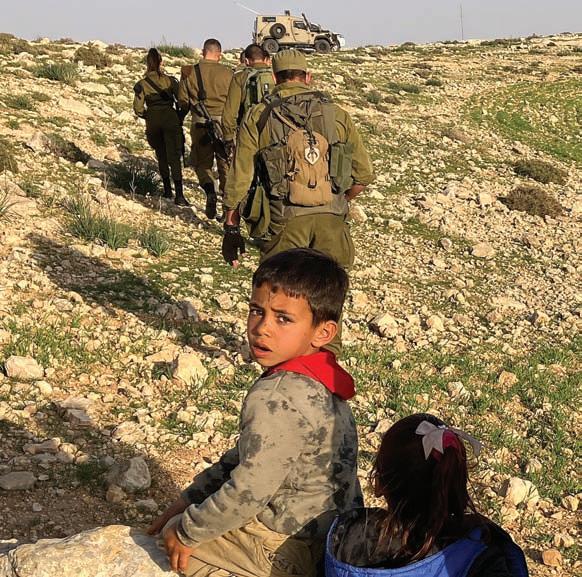
roads, wells, olive trees and agricultural buildings, and they have delivered demolition orders to every structure in the villages.
U.S. taxpayers give Israel more than $8 million a day. This is what we are buying: The strangulation of villages pinned down between illegal outposts. Shepherds forced to sell sheep to buy feed because they cannot access the land they planted a month ago. Women in labor attacked while trying to reach a hospital. Children watching their classrooms demolished by Israeli soldiers with their desks and papers still inside. Families waking to the sight of entire olive groves burned or uprooted in the night by settlers. A young man about to be married shot and paralyzed trying to save his village’s only generator from confiscation. The death of a beloved elderly man run over and dragged by a heavy equipment trailer during a police raid to confiscate cars in his village.
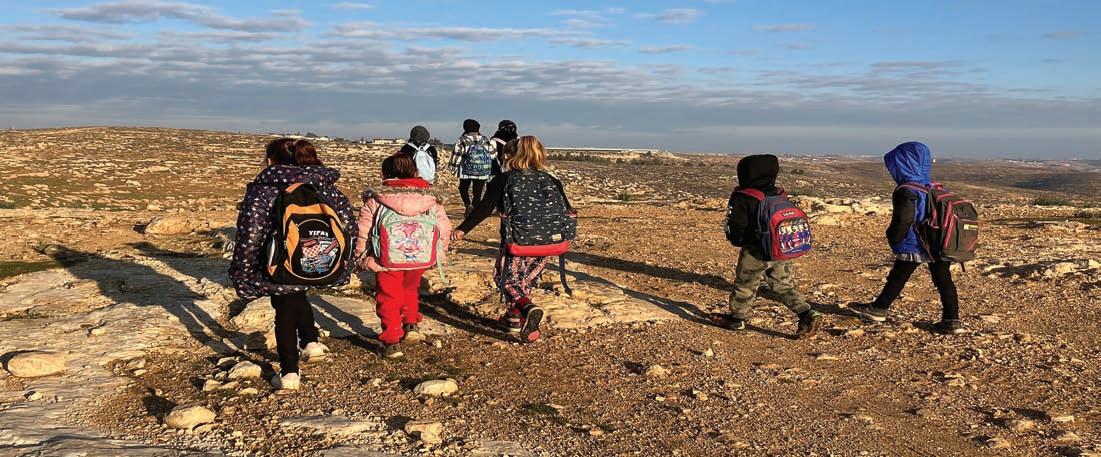
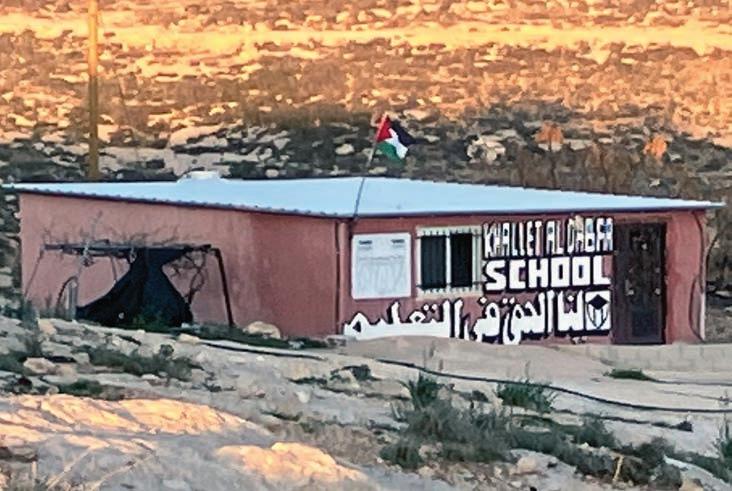
The residents in Masafer Yatta desperately need the world to witness the bitterness of settler colonialism, which is laying waste to their fields and killing olive groves. They desperately need for us to pay attention and do something to stop this cruelty.
EDITOR: A trial for the settler who attacked Cassandra Dixon has been scheduled for July of this year. Donations toward the cost of returning for the trial, pursuing the legal case against the settler, and medical costs resulting from the attack, can be made at https://gofund.me/c1da60f5. ■
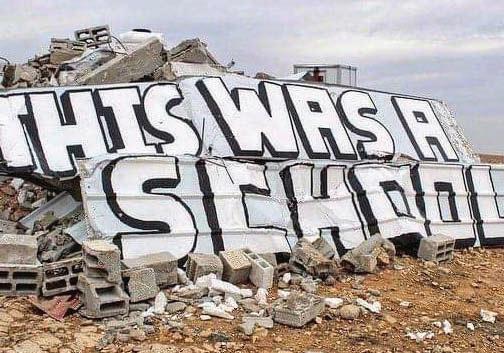
THERE HAS BEEN NO SHORTAGE of hypocrisy in U.S. foreign policy positions over the years, but U.S. demands for Russia to be investigated and prosecuted by the International Criminal Court (ICC) ranks near the top. The United States is not a state
History’s Shadows, a regular column by contributing editor Walter L. Hixson, seeks to place various aspects of Middle East politics and diplomacy in historical perspective. Hixson is the author of Architects of Repression: How Israel and Its Lobby Put Racism, Violence and Injustice at the Center of US Middle East Policy and Israel’s Armor: The Israel Lobby and the First Generation of the Palestine Conflict (available from Middle East Books and More), along with several other books and journal articles. He was a professor of history for 36 years, achieving the rank of distinguished professor.
party to the ICC and has persistently undermined the international court throughout its history.
Washington has sought to hamstring the ICC out of concern that it might investigate and prosecute the United States over its use of torture and commission of war crimes in Iraq and Afghanistan. And then there is the matter of Israel, an apartheid state with a long record of egregious war crimes against Palestinians, among others. Israel is America’s closest ally in the Middle East and recipient of billions of U.S. taxpayer dollars annually that better enable it to bomb indiscriminately, shoot on sight, incarcerate without charge (including children), and conduct ethnic cleansing campaigns to make way for illegal Jewish-only settlements, among other unsavory practices.
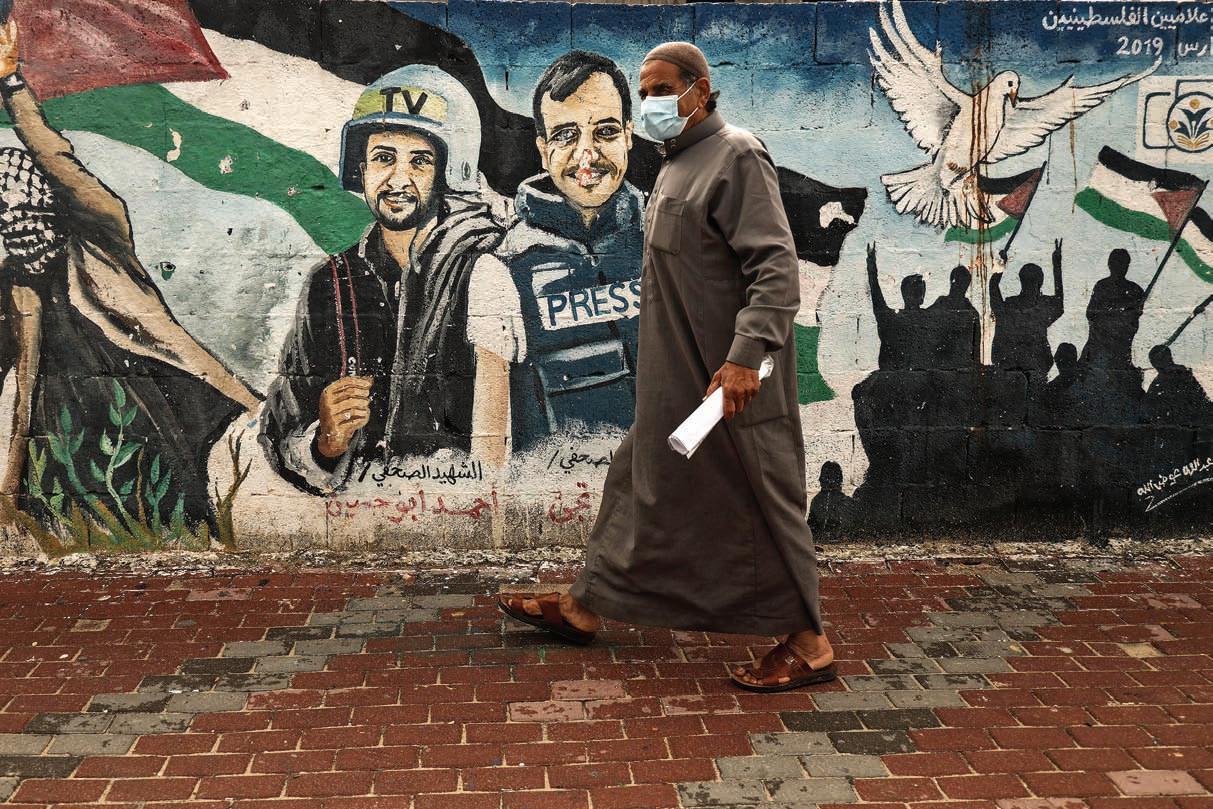 In Gaza City, a Palestinian man walks past a mural of journalists killed in the seven‐week war in 2014 between Palestinians and Israel, on March 4, 2021. The International Criminal Court opened a formal investigation on March 4, 2021 into alleged war crimes in the Palestin‐ian territories, in a move blasted by Israeli Prime Minister Binyamin Netanyahu as the “essence of anti ‐Semitism.”
In Gaza City, a Palestinian man walks past a mural of journalists killed in the seven‐week war in 2014 between Palestinians and Israel, on March 4, 2021. The International Criminal Court opened a formal investigation on March 4, 2021 into alleged war crimes in the Palestin‐ian territories, in a move blasted by Israeli Prime Minister Binyamin Netanyahu as the “essence of anti ‐Semitism.”
Russia may very well be guilty of war crimes, though President Joe Biden’s application of the term genocide is over the top. Ukraine, on the other hand (and as all consumers of U.S. mainstream media know) is pure as the driven snow, a bastion of democracy, a complete innocent, and Volodymyr Zelenskyy is a regular Winston Churchill. But the Ukraine war is not the point here; the point is the hypocrisy that inheres in embracing the ICC when it is convenient and undermining international law when it is not.
After participating in the negotiations that led to creation of the ICC, the United States became one of only seven countries in the world to vote against the Rome Statute that created the court. It was joined by such well-known democracies as Israel, Iraq, China, Yemen, Libya and Qatar. In 2000 President Bill Clinton did sign the statute but never sent it for ratification to the Senate, where it would have been dead on arrival.
President George W. Bush, who oversaw U.S. war crimes in Iraq, effectively “unsigned” the treaty by means of a letter to the U.N. secretary-general in 2002. In 2018 President Donald Trump declared before the U.N. General Assembly that the United States “will provide no support or recognition to the [ICC]. As far as America is concerned the ICC has no jurisdiction, no legitimacy, and no authority.” The Trump administration also threatened to sanction ICC officials if they dared to investigate either the United States or Israel for war crimes.
In 2021 the Office of the Prosecutor of the ICC again drew the wrath of the United States (and Israel) when it announced the opening of an investigation “into the situation in the State of Palestine.” U.S. Secretary of State Antony Blinken—a longtime dedicated Zionist— condemned the action, declaring that the ICC “has no jurisdiction over this matter,” adding that “the Palestinians do not qualify as a sovereign state” and
(Advertisement)
therefore could not come under the purview of the ICC.
Blinken’s response reassured his friends in AIPAC and its minions in Congress that the United States would “continue to uphold our strong commitment to Israel and its security, including by opposing actions that seek to target Israel unfairly.” While displaying its disdain for Palestinian human rights, the United States this past March then declared its support for an investigation into the alleged Russian war crimes.

The ICC has made its share of missteps over the years. But throughout its relatively brief history this potentially vital international institution in support of peace and justice has been persistently undermined rather than strengthened by the hypocrisy of the world’s leading superpower.
The ICC should proceed with its investigation and potential prosecution of Russia—as well as of Israel, the United States and any other nation that commits war crimes. ■
A STRONG CAMPAIGN in support of the United Nations Special Rapporteur on the occupied Palestinian territory Francesca Albanese has emerged in response to an ongoing campaign to sack her.

Three former rapporteurs urged the U.N. on April 27 to publicly defend their successor, stating that she has been the target of attacks that have been “slanderous” and “personal.”
In her second year in the role, Albanese tweeted on May 3, she “saw too many deaths, too much arbitrariness, zero accountability” and faced accusations against her work to uncover
Ian Williams, our U.N. correspondent, is away. His column will re‐turn next issue. This article was published by Al Jazeera on May 4 and is reprinted with permission.
these abuses—“hideous words…to hide a much more hideous reality.”
The Italian international human rights lawyer was appointed to the role on May 1, 2022, the first woman to hold the position, which was established in 1993, to monitor the human rights situation in the occupied Palestinian territory.
In the letter addressed to U.N. leadership, former rapporteurs John Dugard, Richard Falk and Michael Lynk said they too were the target of such attacks during their terms, but the smears against Albanese are of “greater ferocity and mean-spiritedness.”
The letter was written by South African Dugard, who served in the role from 2001 to 2008, American Falk (2008 to 2014) and Canadian Lynk (2016 to 2022).
“During our respective terms as U.N. Special Rapporteur for human rights in the OPT (occupied Palestinian territory), the U.N. leadership did not do nearly enough to speak out against the unremitting attacks against us,” the group stated.
“The silence of the U.N. leadership in the face of these attacks only emboldened those organizations and individuals to continue with this behavior and to seek to throw mud at the mandate at every available opportunity,” they added.
Albanese has faced calls for her dismissal from multiple fronts, largely accusing her of making anti-Semitic comments and having an anti-Israel bias.
In January, a bipartisan letter by 11 representatives in the U.S. Congress accused Albanese of “old anti-Semitic tropes,” and called on U.N. SecretaryGeneral Antonio Guterres and the U.N. High Commissioner for Human Rights Volker Turk to remove her from her post.
Other calls for her dismissal have come from Amichai Chikli, Israel’s minister of diaspora affairs and social equality, who in April accused her of having a “bias against Israel.”
Additionally, Israeli NGOs International Legal Forum and Monitor have joined the chorus of calls for her dismissal.
Monitor’s board includes Elliot Abrams, the neoconservative former foreign policy adviser for U.S. presidents Ronald Reagan, George W. Bush and Donald Trump, who has been described as “a passionate advocate of Israel.”
The International Legal Forum’s board includes Michael Mukasey, a former U.S. attorney general during the Bush era who in 2014 defended that administration’s waterboarding torture tactics during the U.S.’ socalled “war on terror,” CNN reported then.
Hundreds of civil society organizations, academics, jurists and politicians have come to Albanese’s defense.
(Advertisement)
On April 26, Amnesty International Italy released a letter in support of the U.N. human rights official, which included dozens of Italian rights groups, MPs, jurists and academics as signatories.
An earlier statement in support of Albanese in January 2023 included 116 human rights groups, civil society organizations, and academic institutions from all over the world.
It was in response to a statement made in December 2022 by Israel’s mission to the U.N. in Geneva accusing the rapporteur of “anti-Semitic comments.”
“Our organizations and groups warn that this smear campaign against UNSR Albanese constitutes the latest manifestation in a pattern of Israeli attacks aimed at silencing any legitimate criticism of the inhuman manner in which it treats Palestinians in the Occupied Palestinian Territory (OPT),” the 116 international organization and academic signatories said. ■

DURING A 10-DAY stretch in April, there were three visits to Israel by prominent U.S. political leaders. What made them noteworthy weren’t the visits themselves, but what they revealed about the evolving U.S.-Israel relationship.
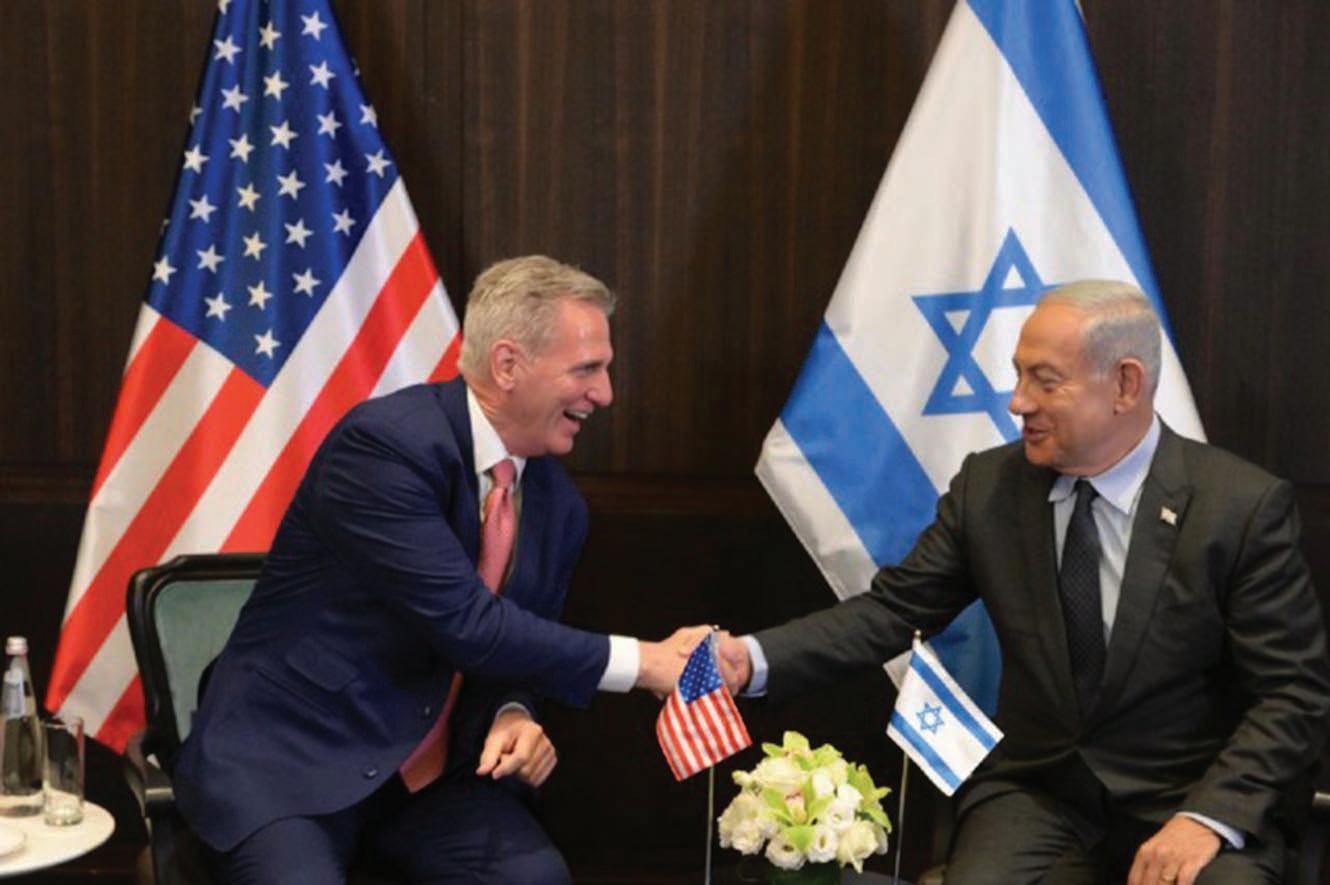
From April 22–25, House of Representatives Minority Leader Hakeem Jeffries visited Israel with a delegation of 11 Democratic members of Congress. From April 27–29, the Republican governor of Florida Ron DeSantis led a delegation to Israel as part of a fournation tour to promote Florida business. And then from April 30–May 2, Republican Speaker of the House of Representatives Kevin McCarthy came calling.
No one was fooled by the stated purpose of the DeSantis visit. He is testing the waters to challenge Donald Trump for the Republican presidential nomination in 2024. And despite coyly dodging questions about his potential candidacy, everything DeSantis did during his time in Israel was seen through that lens.
Shortly after his arrival in Jerusalem, DeSantis signed an antihate crime bill passed by the Florida legislature. It was, to say the least, unusual for a governor to sign a piece of domestic legislation while overseas. While the bill imposes penalties for a range of actions that harass individuals for their religion or ethnicity, DeSantis focused his public comments on anti-Semitism making it clear that he accepts the expanded interpretation of that term to include criticism of Israel and support for BDS. DeSantis also used the occasion of his visit to highlight another proclamation he signed affirming Florida’s special relationship with Israel.
In remarks he made during his short visit, DeSantis was careful to endorse former President Trump’s policies toward Israel: moving the U.S. Embassy to Jerusalem (although he curiously suggested that he would have done it sooner); trashing of the Iran nuclear deal; and promoting the Abrahamic Accords. DeSantis did find occasion to criticize President Joe Biden for “butting into Israel’s internal affairs” by cautioning the current Israeli government to rethink its radical “judicial reform” legislation.
It is worth noting that Prime Minister Binyamin Netanyahu did
meet with DeSantis but kept the visit lowkey and without official comment—most likely because Netanyahu didn’t want to provoke a reaction from Mr. Trump.
Speaker McCarthy’s time in Israel had more of the formal trappings of an official visit. He addressed the Knesset (making him the second Speaker to do so—Newt Gingrich being the first in 1998) and had a very public sit-down with the prime minister. Like DeSantis, McCarthy endorsed the Trumpian agenda for the Middle East and followed the well-worn script of “unwavering support,” “unbreakable ties,” pledging military aid, attacks on Iran and support for expanding the Abrahamic Accords.
Unlike the DeSantis visit, McCarthy’s was largely ignored by the press. He only succeeded in making news when, in an obvious criticism of President Biden’s failure to invite Netanyahu to Washington, the Speaker offered his own invitation. Should that occur, it would represent the third time a Republican Speaker of the House invited Netanyahu to address Congress in order to attack a sitting U.S. Democratic president (Gingrich invited Netanyahu in 1998, using the opportunity to rail against Bill Clinton’s embrace of the Oslo peace process, and John Boehner invited Netanyahu in 2015 to attack Barack Obama’s Iran nuclear deal).
The least publicized of the three visits was the Democratic delegation led by Minority Leader Jeffries. He had the same meetings, used largely the same talking points, and differed only in “raising concerns about the proposed judicial reforms that hundreds of thousands have protested in the streets”—not exactly a headline maker.
What can be learned from the three visits is that while Israel remains a central issue in U.S. politics, there is a fundamental shift in the role it plays. Polls show that Democrats now favor Palestinians over Israelis by a 49 percent to 38 percent margin and American Jews, the vast majority of whom are Democrats, are increasingly alienated from the policies of the Netanyahu government. So, the targets of the DeSantis and McCarthy visits were not Jewish voters. They were playing, instead to the very pro-
Israel right-wing Christian evangelicals who make up 40 percent of the Republican vote.
Recall that exactly two years ago outgoing Israeli Ambassador to the U.S. Ron Dermer (who, while he was a U.S. citizen, was a Republican operative) advised Israel not to rely on the support of American Jews. They were, he cautioned, too small in number and too deeply divided on Israel. Instead, he said, Israel’s strongest supporters were the far more numerous right-wing Christians, whose ideology made them uncompromising devotees of Israel. And as that rock-solid, religiously motivated base of the GOP are also Trump supporters, it becomes clear why DeSantis and McCarthy would go to great lengths to endorse the former president’s agenda.
The purpose of Mr. Jeffries’ visit was more difficult to discern. He pledged his commitment to bipartisan support for Israel—by which he means keeping in line most Democratic members of Congress. At the same time, with the party’s progressive base moving in a different direction, there is an increasing restiveness in his caucus, with many of his Democratic colleagues speaking out in ways that are critical of many Israeli policies.
So if the overwhelming majority of American Jews will vote for Democrats and growing numbers aren’t wedded to Israel, why is Jeffries’ singing off the same old page? A recent article in Jewish Currents quotes a New York Jewish Democratic operative providing the answer: “You need a lot of money to stay in power” and “Jeffries is out reestablishing his credentials with Jews, particularly donors.” Pro-Israel PACs and “dark money” groups spent tens of millions of dollars in recent election cycles and it appears that Jeffries doesn’t want to risk losing their support.
The bottom line is that the three recent visits to Israel reflect the changing dynamic in U.S. politics and the policy debate. There’s a deep partisan split on the issue of Israel. With Trump and his religiously conservative pro-Israel voters dominating the GOP side, Republicans are of one mind on the issue. Democratic leaders, on the
Continued from page 14
other hand, are stuck between courting their big donors who are very pro-Israel and appealing to their more progressive voters. Despite Jeffries’ pledge of bipartisan support for Israel, both the Democrat/Republican inter-party and the Democrats’ intraparty tension are real and growing. ■ or to any other country you came from. Just accept us as equal citizens with equal rights either in a one-state solution or as good neighbors in a two-state solution. One thing is certain: we are destined to live together on this land and neither you nor we will succeed in getting rid of the other. Nor do we gain by postponing peacemaking.
I say to policymakers in the United States: through your iron-clad support for the State of Israel over the last 75 years, you helped create an apartheid state in the Middle East. Now it is time to reexamine the harmful consequences of your policies and implement strategies that would lead both Israelis and Palestinians to achieve genuine democracies.
To church leaders and laypeople in the United States I say this: take an honest look at what is going on in Palestine. See how your end-time theologies have caused much harm to Muslims, Jews and fellow Christians. Instead of accepting your calling as peacemakers and ushering in the Kingdom of God, you added to the death, destruction and suffering of the Palestinian people. It is time to change course and stand with the oppressed.
We will celebrate freedom one day, along with all our friends and advocates around the world, and justice will embrace us. We will reconcile and live at peace with those who once oppressed us.
I look toward the horizon, and I see justice rising. I look toward the horizon, and I envision the near end to the 75-year-old nightmare. I look toward the horizon and see freedom thriving sooner than we ever imagined. ■
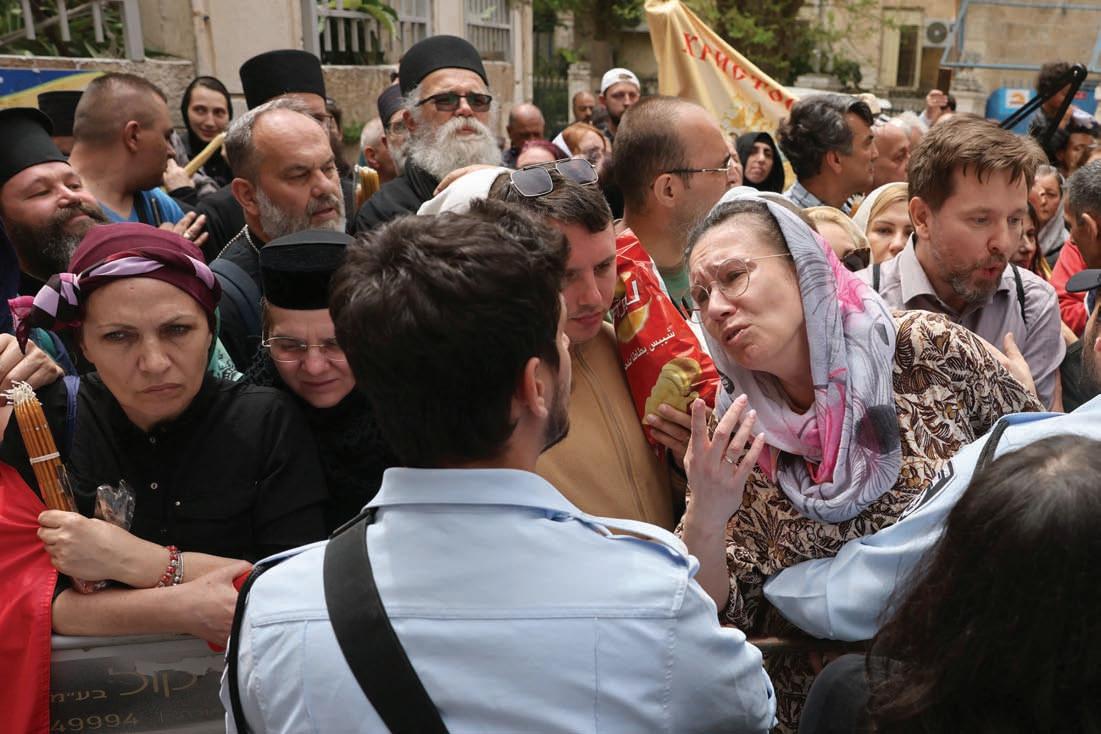 By Dale Sprusansky
By Dale Sprusansky
CHURCHES FOR MIDDLE EAST PEACE held its annual national advocacy summit titled “Seeking Comprehensive Peace: Advocating for Human Rights in Israel and Palestine” on April 20 at the Lutheran Church of the Reformation on Capitol Hill. The event featured a panel of pastors from Palestine, as well as advice on how to effectively lobby members of Congress. The day after the meeting, attendees dispersed throughout the halls of Congress to meet with congressional staff.
Rev. Mitri Raheb, the president of Dar al-Kalima University in Bethlehem, provided a bleak portrait of the current reality in Palestine. Under Israel’s latest right-wing government, violence against Palestinians has escalated, evidenced by the fourfold increase in acts of anti-Christian hatred this year. It’s not uncommon for set-
tlers to throw garbage on monasteries, destroy crucifixes, graffiti “death to Christians” on buildings and spit on nuns, he reported. All of this is happening under the rule of a government that is “not shy about being racist” and actively promotes a philosophy of Jewish supremacy, he said.
With the situation worsening, Palestinians are increasingly dispirited, Raheb pointed out. “There isn’t a day that passes without a young [Palestinian] man being shot,” he said, comparing the situation to the lynching of Black men in Jim Crow America. Knowing they can be killed at any moment, “young people carry their last testimony in their pockets,” he related. The testimony found on one recently killed young man began, “We have many dreams, but we cannot fulfill one of them.” Raheb chillingly summarized this growing sense of temporal powerlessness: “We are facing a generation of young people who have no problem be-
lieving in life after death, but have real trouble believing that there is life before death worth living.”

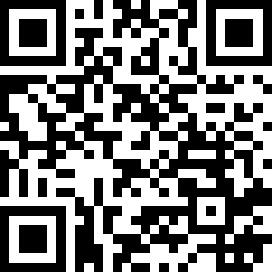
In the face of such deep suffering, Raheb chastised the West for its indifference. He expressed exasperation at the sentiment he hears repeatedly from U.S. officials: “Yes we are concerned, but it’s complicated.” He posited that such a response is used as a shield to avoid having to take bold and uncomfortable action. He also noted the double standard of those hiding behind the alleged complexity of Israel’s occupation. “When it comes to Ukraine, you won’t hear anyone saying, ‘it’s complicated,’” he pointed out.
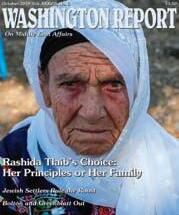
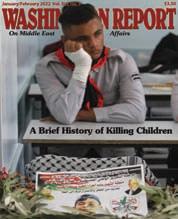
Despite his grim remarks, Raheb encouraged those working for justice to not become dispirited. “Hopeless people cannot change the world,” he said.

Rev. Munther Isaac, the academic dean at Bethlehem Bible College, exhorted Christians to be bold in responding to Israeli human rights violations. Following Jesus is a “radical calling” that entails ac-
cepting risk, challenging the status quo and speaking truth to power, he said. The Gospel mandate to be a peacemaker does not mean being neutral, he added. “Peacemaking involves taking sides,” he said. “In the Bible, it’s very clear that God takes sides” with the poor, oppressed and marginalized, he added.
In this vein, Isaac said churches must cease being afraid of offending others and instead be clear and unapologetic in naming Israeli apartheid. “We need prophetic peacemaking,” he said, stressing that old approaches focused on being “strategic” and likeable have not worked. Those tempted to compromise or soften their language in order to avoid pushback must remember that Christianity sees suffering as meritorious and that crosses must be accepted rather than resisted in order to achieve victory, he said. Indeed, the Palestinian principle of sumud (steadfastness) is rooted in unwaveringly enduring challenges for the greater good, he said.
Jack Sara, the president of Bethlehem Bible College, identified the Israeli occupation as “the main reason for [Palestinian] Christians leaving the country.” He said Palestinians are no longer focused on the two-state solution, but “just want a solution” that affords them their basic human dignity.

“We need more advocates on this side of the world,” Sara told summit attendees, as he shared a painful example of a lack of solidarity. When his church in Jerusalem was attacked by Jewish extremists in 2010, the vast majority of Western Christian news outlets he contacted refused to cover the story. One outlet that did report on the fire expressed skepticism that the attack was not actually carried out by Muslims or the result of an electrical issue. This is just one of many instances in which violence against Palestinians is ignored or belittled by those who purport to stand with the marginalized, thus enabling the ethnic cleansing of Palestinians, Sara said. ■

IN THE LAST WEEK of March, George Washington University’s chapter of Students for Justice in Palestine (GW SJP) launched Israeli Apartheid Week (IAW) to combat the university’s ongoing discrimination and suppression of the Palestinian community.
The week began on March 27 with a teach-in, “Confronting Zionism.” GW SJP partnered with the Palestinian Youth Movement’s
Priya Aravindhan is a rising senior studying anthropology and international affairs, with an interest in the Middle East and South Asia,
local chapter to help students identify and resist Zionism on campus. In the following days, students held various events, such as a dabke workshop and “A Night in Palestine” cultural celebration.
Throughout the week, SJP set up and maintained an apartheid wall with resistance art and calls for “land back.” IAW culminated in a rally on the school’s Kogan Plaza on March 31, in which various students formed a united front against the university’s ongoing oppression of Palestinian and anti-Zionist students and faculty.
This year’s IAW came at a time when Palestinian identity is becoming increasingly targeted by GW’s administration. A month prior to IAW, GW professor Dr. Lara Sheehi was wrongfully accused of
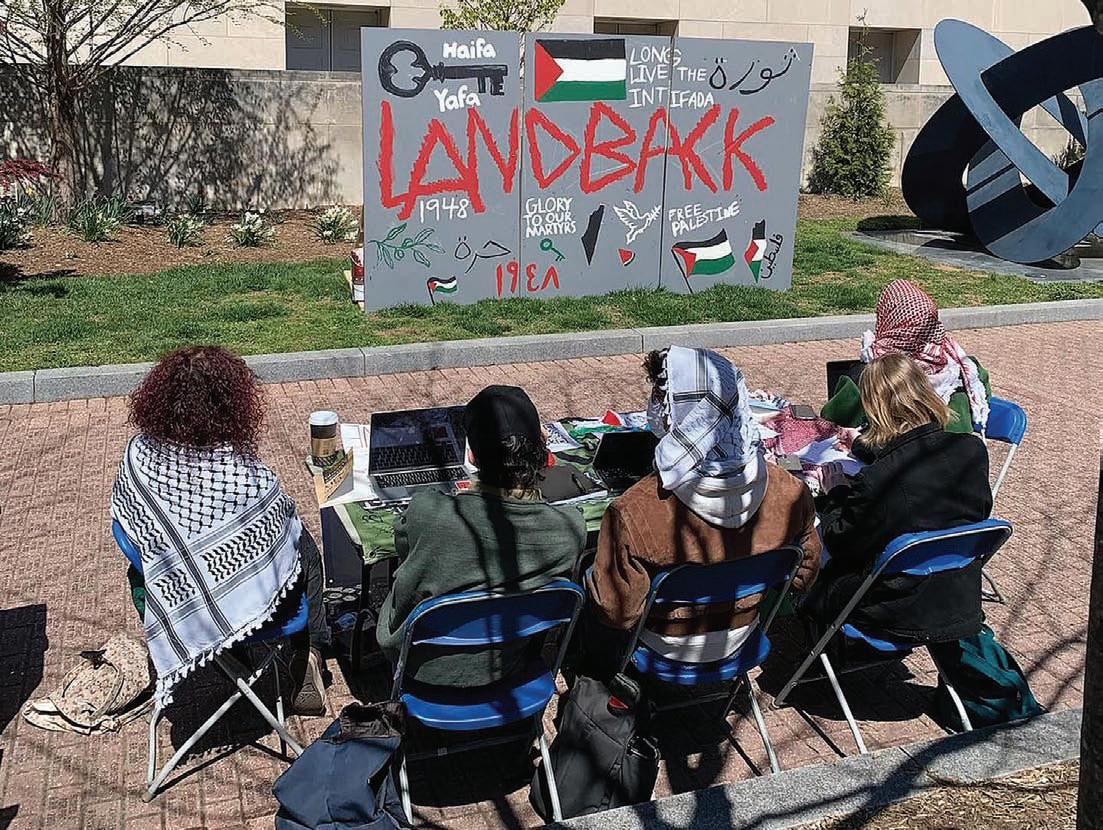
discriminating against Jewish students by StandWithUs, a right-wing pro-Israel activist group. The university cleared Sheehi of all charges. In a statement, the Office of the University President said those bringing the charges “advocated for an expansive view of the definition of anti-Semitism, which, if accepted in the university environment, could infringe on free speech principles and academic freedom.”
Despite this favorable ruling, many feel GW remains a hostile place for Palestinians. Laila, an organizer from GW SJP, said the university “is an incredibly Zionist campus in multiple facets” and that the administration is “particularly open about their support for Zionism.” (The student, like others quoted in this article, wished to remain anonymous due to fears of being slandered by pro-Israel groups, such as Canary Mission, that regularly target those advocating for Palestine on campus.)
Indeed, in 2021 the university removed counseling services for Palestinian students experiencing trauma as a result of Israeli violence due to complaints from a pro-Israel group. The school was later reprimanded by the District of Columbia’s Office for Human Rights for discriminating against Palestinian students. The academic institution has also prevented SJP from receiving funds as a student organization.
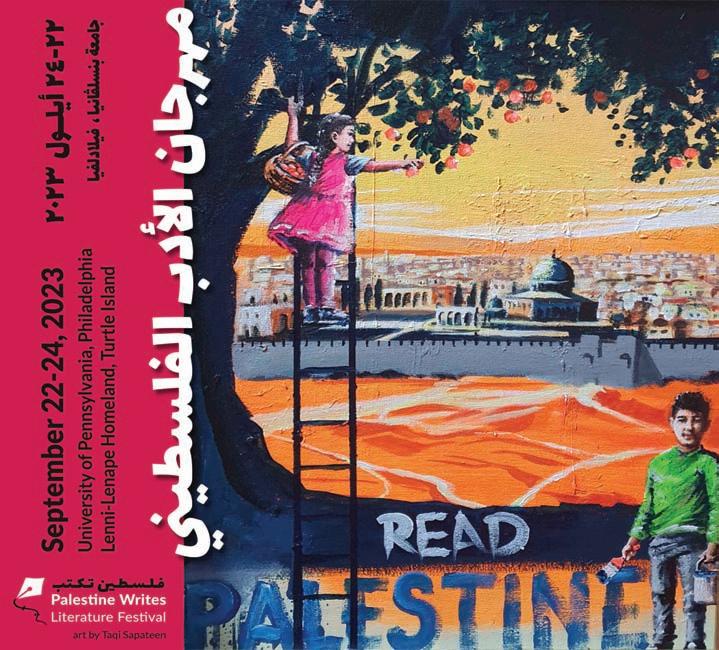
GW SJP believes such actions make the university complicit in the larger system of Israeli apartheid and settler-colonialism. “GW’s administration continually puts obstacles in front of the work we’ve been doing,” Laila said.
Last year, SJP held a postering event to protest GW Hillel for inviting Doron Tenne, a former senior intelligence officer in the Israeli military, to speak on campus. In response to a poster pasted on GW Hillel’s bench, the university administration claimed vandalism and threatened SJP with censure and its president with disciplinary probation. The charges, however, were false, as neither the president nor the organization was responsible for the poster pasting, as the university ultimately conceded.
Supporters of Palestine are disinclined to applaud the administration for dismissing accusations in this and other cases. “Our success doesn’t really have to do with the administration,” Laila said. “It is very much a response to the organizing of our community members and the solidarity of our partners.” They pointed to other GW organizations, regional SJP groups and national political groups as being particularly vocal in defending GW SJP from spurious attacks.
“GW is a very Zionist campus,” George, another SJP organizer said, “but there is a lot of silent support for Palestine.” People are often cautious to publicly mobilize for the Palestinian cause “due to certain risks that come with things like your career being threatened or being doxxed online,” he added.
One important event from IAW was the panel “The Palestine Exception,” which discussed the academic suppression of Palestinian and pro-Palestinian voices. Dr. Sheehi, Palestine Legal attorney Dylan Saba and Palestinian GW professor William Youmans spoke on the work they have been doing around Palestine for
decades. “It was amazing to see our place within the larger movement for Palestine by seeing how the student movement has evolved,” George stated.
IAW not only served as a time to build a stronger united front against oppression, but also as a safe space for people to speak out against Israeli apartheid and show unapologetic support for Palestine. “We want to show people that there is a place on campus to demonstrate support for Palestinian liberation,” one student said. “We’re here and we’re not going to back down no matter what.”
“Our goal was to engage with people who have never really engaged with Palestine and to consolidate the Palestinian community on campus and create a week for them to celebrate our culture and our resistance,” one organizer expressed. “IAW is a time when we can be extra visible on campus.” With the apartheid wall and numerous cultural and academic events, GW’s SJP successfully asserted their presence on campus and their ongoing resistance to the systems that work against them and all Palestinians. ■
(Advertisement)
chanted, sang songs and listened to speakers who called Smotrich a homophobe, someone who doesn’t consider Reform Jews Jewish, a supporter of segregated maternity wards for Jews and non-Jews and a person who considers women subservient…Senior Rabbi Jonathan Roos of Temple Sinai in Washington, DC was at the protests with… congregants. ‘We are here to continue to stand against hate and for democracy.’ Rabbi Esther Lederman from the Union for Reform Judaism urged Jews to raise their voices…She called Smotrich a ‘fascist homophobe.’”
AS ISRAEL’S FAR-RIGHT regime advances its agenda, the American Jewish community is in growing turmoil. More and more Jewish voices are expressing concern that having embraced Zionism was a mistake—one that completely ignored Jewish moral and ethical values and failed to apply such values to the indigenous Palestinian residents of what became Israel.
When Israeli Finance Minister Bezalel Smotrich visited Washington in March to address an Israel Bonds meeting, no U.S. government official would meet with him; representatives of leading American Jewish organizations shunned him. Smotrich, a leader of the Religious Zionism Party, was criticized, in particular, for calling for the Palestinian village of Huwara in the West Bank to be “wiped out.” Speaking in Paris on March 19, Smotrich said, “There’s no such thing as Palestinians because there’s no such thing as a Palestinian people.”
Washington Jewish Week reported: “Outside the hotel…a multitude of people representing area synagogues and…organizations…
Only two Jewish organizations were willing to meet with Smotrich, the Orthodox Union and the right-wing Zionist Organization of America. In a statement, the Jewish Community Relations Council of Greater Washington declared: “The hateful views long expressed by Minister Smotrich are abhorrent…and run contrary to Jewish values…No public servant should ever condone or incite hatred or hate-motivated violence and when they do, they will be fiercely condemned by a wide swath of American Jewry.” William Daroff, the CEO of the Conference of Presidents of Major American Jewish Organizations, called Smotrich’s statements “disgusting,” according to the March 3 Jewish Telegraphic Agency.
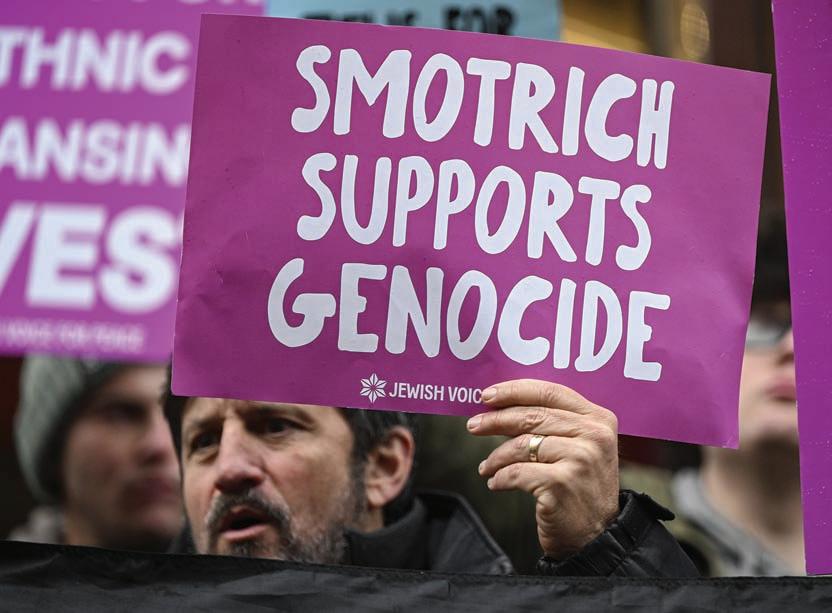
In a sermon entitled “This Passover Must Include Palestinians,” Brant Rosen, rabbi and co-founder of Congregation Tzedek of Chicago and founder of the Jewish Voice for Peace Rabbinical Council, declared: “The anti-government protests within Israel embody liberal Zionism, rather than liberation for all. Let’s dream bigger.”
Rabbi Rosen makes the case clear for his fellow Americans: “As a Jewish state, Israeli democracy can only truly extend to Jewish citizens. Unlike the U.S., where those who advocate equal rights for all can still be described as ‘believing fervently in the American creed,’ those who call for one state with equal citizenship for all are routinely accused of anti-Semitism, seeking nothing less than the destruction of the Jewish state.”
Protesters gather outside the Grand Hyatt Hotel as Israeli Finance Minister Bezalel Smotrich attends a conference on March 12, in Washington, DC. U.S. government officials refused to meet with him following his comments on wiping out the Palestinian village of Huwara. PHOTO BY CELAL GUNES/ANADOLU AGENCY VIA GETTY IMAGESRabbi Rosen concludes: “Like many Americans, I believe it is my responsibility to challenge my country to, as Martin Luther King put it, ‘live out the true meaning of its creed.’ Among other things, this means actively supporting anti-racist struggles in the U.S. that demand full and equal rights for all its citizens. As an American Jew living in the age of Zionism, I can demand nothing less for all who live between the river and the sea.”
In the early years when Israeli state building was under way, the American Jewish establishment and religious leaders promoted Israel’s false claim that neighboring Arab states had called upon Palestinians to abandon their homes and flee from the country. Even later, when Israel’s New Historians were able to document that this was simply Israeli propaganda and had never happened, leading American Jewish groups persisted in advancing this false narrative. Now, the reality of Israel’s treatment of Palestine’s indigenous population is more widely understood. It is increasingly clear that Israel never was what the American Jewish leadership said it was, advanced in its religious schools and used as a basis for promoting massive U.S. financial aid. Now, finally, the myths about Israel are fading away.

New York Times columnist Thomas Friedman, long a strong supporter of Israel, wrote a column in the Times on March 7 with the headline, “American Jews, You Have to Choose Sides on Israel.” He writes: “Ever since Israel’s founding in 1948, supporting the country’s security and its economic development and cementing its diplomatic ties to the U.S. have been the ‘religion’ of many nonobservant American Jews…Now, a lot of American Jews are going to need to find a new focus for their passion…because if Prime Minister Binyamin Netanyahu succeeds with his judicial putsch…the subject of Israel could fracture every synagogue and Jewish communal organization in America.”
In Friedman’s view, “the interests
of American Jews and Israel have been diverging for many years, but it’s been papered over.” In what Friedman calls “a paradigm shift,” he cites Gidi Grinstein, the founder of the Israeli think tank Reut, who wrote an article published a few weeks earlier in the Times of Israel calling for American Jews to reimagine themselves as “a robust, resilient and prosperous” community that invests in its own vitality and has institutions and contributes to American society, no longer accepting the “domineering Zionist discourse that holds American Jewry to be second-class Judaism.”
In November 2015, Commentary magazine held a symposium with this theme: “What will the condition of the Jewish community be 50 years from now?” One of most perceptive responses came from Rabbi Jacob Neusner, an academic scholar of Judaism who taught at Bard College. Rabbi Neusner makes clear that, “Israel’s flag is not mine. My homeland is America. “…Nothing in my scholarship—not the history of the Jews of Babylonia or the sages of Yavneh—speak meaningfully to the context of the United States. We as Jews have never lived so comfortably and freely. We have no historical analogy to draw on.”
Rabbi Neusner provides this assessment: “For now, the Judaisms of Shoah memory and ethnic identity and Israel affinity are ascendant, but as we know, those Judaisms have limited appeal and they do not do a good job of answering the
questions that create a religious system… The Judaism that endures is the one that exists wherever people seek to discover the answers to questions that run much deeper: What is a good life? How should we act? What is expected of us?…I don’t know when American Jewry will turn back toward Judaism for answers to those urgent questions, or when they will place the word of God above the judgment of any man including themselves. But I am optimistic that such a Judaism will return— and may even be returning. A Judaism that is vital, that looks inward and depends not on political Jerusalem, or the vestigial memories of the lower East Side or the ashes of Auschwitz. Instead, it will be a Judaism rooted in spiritual purpose and textual depth, the questions that have shaped all human history and all theological experience. In the past 50 years, such a Judaism was a whisper in America. But tomorrow it may be a song, and who can know who will sing the first chords?”
Though no one can know how the current ferment within American Judaism will evolve, it seems clear that Zionism is in retreat. Its advocates will have to come to grips with the manner in which it distorted history and created a story of the creation of the State of Israel and its treatment of Palestine’s indigenous population which bears no relation to reality. For Judaism, it is becoming increasingly clear, Zionism was a dangerous wrong turn. ■
ISRAEL DIDN’T WANT quiet, even for a moment. The agitators’ motives varied but they shared the same goal: fanning, igniting and blowing things up. History has already taught us that when Israel wants quiet, it’s almost always wonderfully maintained. When it wants an escalation, just wait and see it come. Who hadn’t been warning against the current wave? Who hadn’t seen it coming? And on the other hand, who didn’t do a thing to head it off and instead just stirred things up?
Now we will again bewail our bitter fate, the rockets and terrorist attacks, our neighbors’ violence and our sacred victims who died in vain. Israel could have prevented all this, and this time it could have been done rather easily.
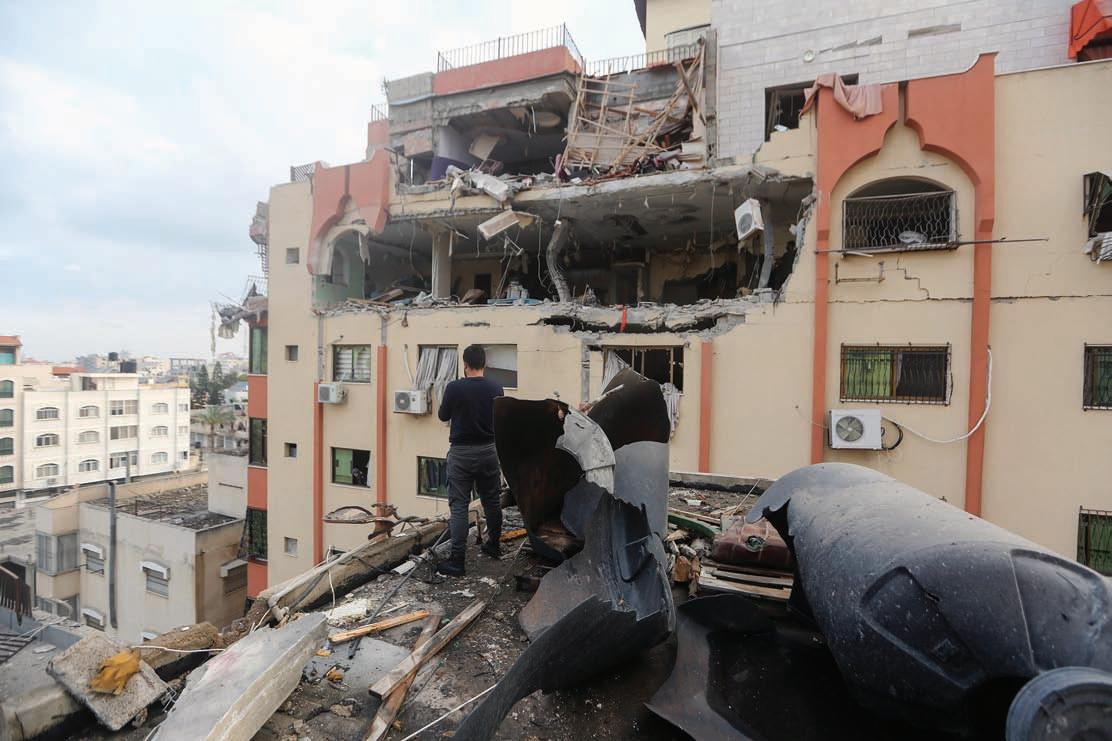
When Israel doesn’t want quiet, it knows exactly what to do. Four or five anonymous aerial bombings of Iranian targets in Syria, a jab and yet another at Syrian sovereignty and Iranian power, in the total knowledge that at some point Iran and Syria will no longer be able to restrain themselves.
When Israel doesn’t want quiet, it unleashes troopers in police uniform in an extremely holy place for Muslims during their holy month. When Israel doesn’t want quiet, it dispatches its police to barbarically beat the faithful, putting hundreds of people in restraints on the carpets of the al-Aqsa Mosque in Jerusalem to humiliate them on camera, for the Arab world to see.
There isn’t a single Muslim, or any human being for that matter, who could have remained unmoved by the shocking scenes at the mosque. Of course, it’s possible to spread
about
(Continued on page 63)
stories how people “holed themselves up” in the mosque, but the truth is that manyI wasn’t, “We Gazans have lived through so many wars that war has become routine for us.” She tried to call my aunt in Ukraine, but my aunt doesn’t have an internet connection; the Russian army destroyed the center that distributes internet all over Ukraine. About two hours later, my aunt called her, asking her about the situation in Gaza. I had no words to answer my grandmother when she asked, “Wars are in every home: in Ukraine and in Palestine. Where should I escape now?”
I wondered how other Ukrainians now living in Gaza cope with our abnormal living conditions. My mother’s friend, Lina, is a Ukrainian doctor who works at al-Karama Hospital in Gaza. When I talked to her about this, I was shocked by her answer. “Nothing unusual, I go to my daily job as a doctor at al-Karama Hospital. I treat children, and everything is normal. I know that I should not normalize war, but what do you expect from a person who has survived more than four wars?”
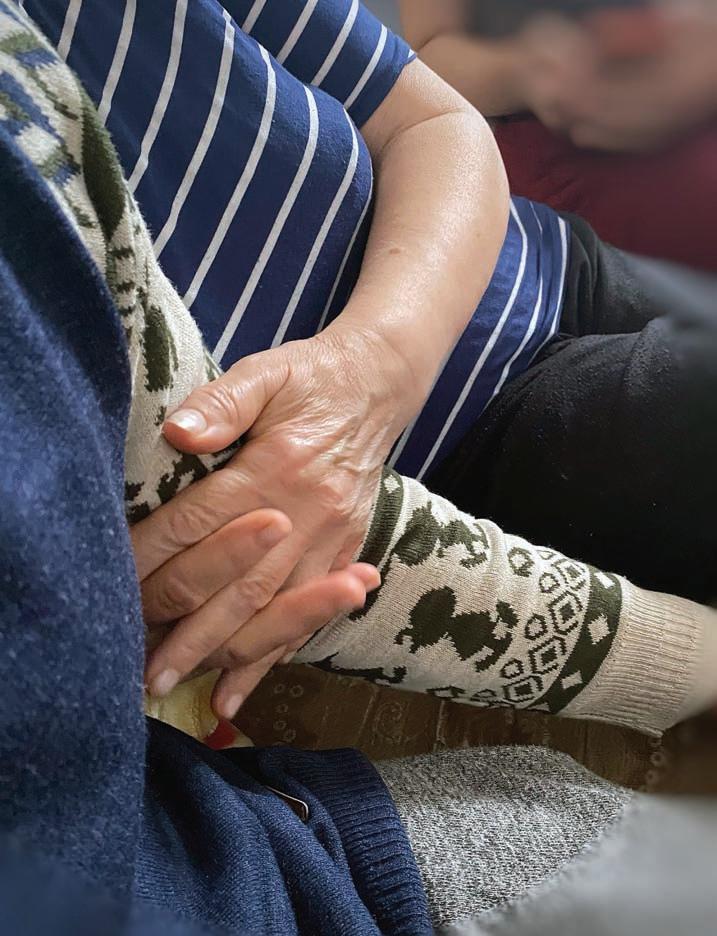
I EMAILED MY FRIEND, Samar, who lives in the United States, telling her everything is fine in Gaza. One hour later, things turned upside down as Israel launched surprise airstrikes across Gaza. My grandmother fled from Ukraine to Gaza and wants me to stay next to her all the time because she doesn’t want to die alone. She asked me, “Khaled, aren’t you afraid of a new war?” I told her that
During the 2008 war, my father, who is a doctor, did not want to leave us and go to his job. I remember him saying: “I prefer being fired from my work than leaving you alone in this bombardment!” But that was then. Now, in the middle of the terrifying shelling, he eats his breakfast as usual, performs the post-dawn prayer and goes to work. He shows no interest in the destination of rockets flying overhead or which areas are being bombed. He even calls me to meet him at the shopping center so I can help him carry groceries home. During the Israeli assaults in 2008, 2012 and 2014, he was not nearly as relaxed.
I took my grandmother to buy supplies from the center. Although I was expecting to find everything closed, to my surprise shops were open for business and people were sitting in cafes and chatting about what to expect that night.
My 7-year-old younger sister, Zamzam, was supposed to go on a school trip yesterday. She was excited about it and went shopping for some candy to treat her school friends. But the trip got cancelled,
(Continued on page 41)
The writer’s grandmother, who fled from Ukraine and fears for her life in Gaza, hangs onto the author. PHOTOS COURTESY KHALED EL-HESSYTHE
LOVE and war in Gaza is long and complicated. For Mohammad and Diana, the young couple from Gaza, marriage was their light at the end of the tunnel.
Mohammad Sameh Saad, 19, works with his father in a sewing factory. To work toward his goal of starting a life with Diana Adas, his fiancée, he worked two jobs: he took on freelance marketing assignments before going to his factory job.
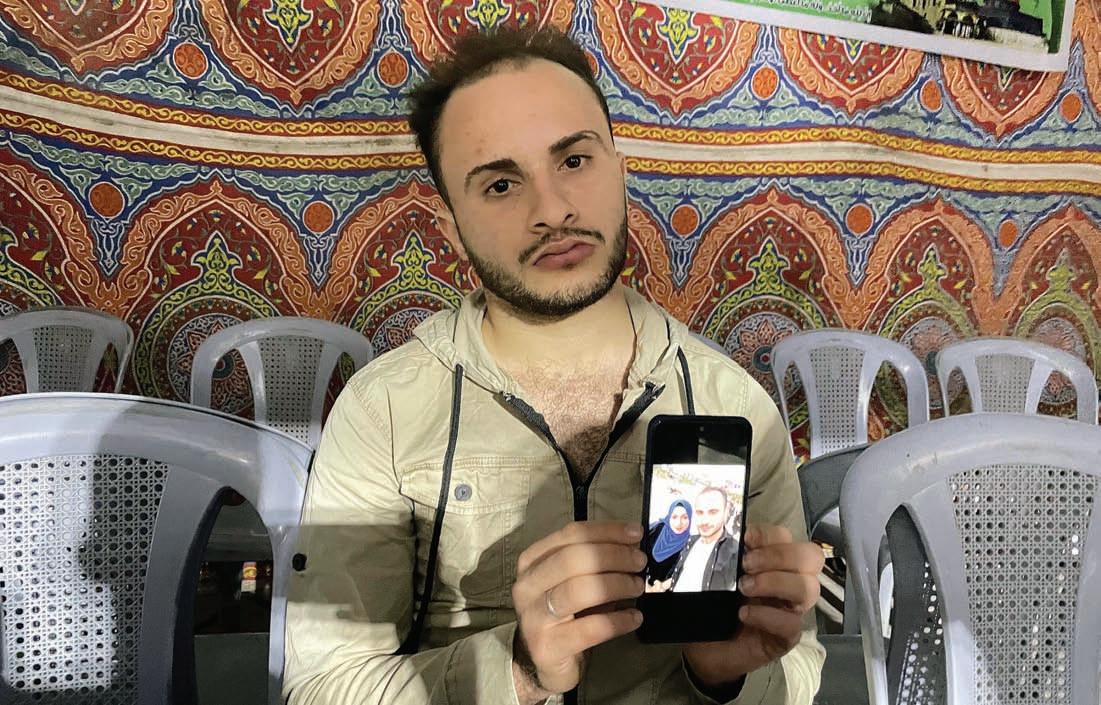
“Two months ago, Mohammad told me he wanted to marry. I told him that he was still young, but he told me he loved one person and wanted to marry her,” Mohammad’s uncle Shadi told the Washington Report. “Mohammad asked her family for her hand and they agreed.”
“We first met on March 18, and on March 19, we signed the marriage contract at her home,” Mohammad said. “We then began plan-
ning the wedding, what we would buy, where we would have the wedding and where we would spend our honeymoon.”
Mohammad set the wedding date for July 21, 2023, giving plenty of time for wedding preparations. They planned to get married in a chalet. He made all the arrangements, rented an apartment, and furnished it. “The furniture cost about $15,000,” Sameh Saad, Mohammad’s father, said.
Mohammad’s fiancée, Diana, 19, dreamed of completing her university studies and continuing for a master's degree. “She was very smart. I was proud of her, she always dreamed of working in a bank as an accountant,” the grief-stricken young man said.
His two months of engagement with Diana were among the happiest moments of his life. “I was compensated for every unfortunate thing I ever experienced in my life when I got engaged to
(Continued on page 39)





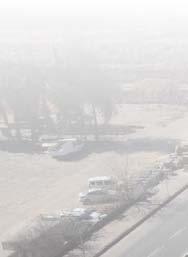
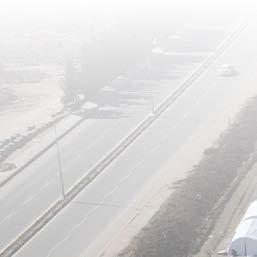
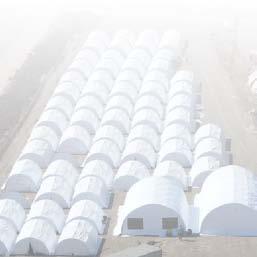
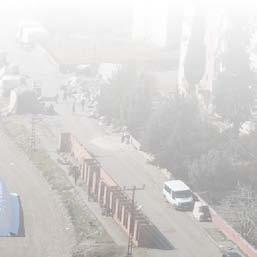
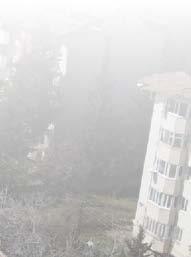
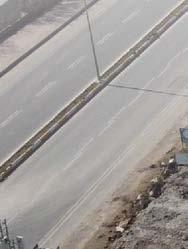
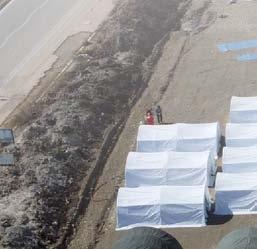
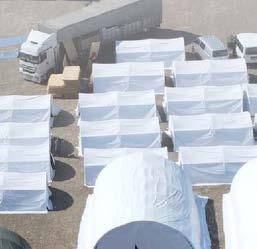
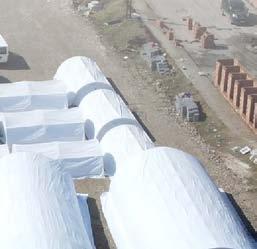
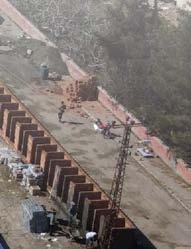
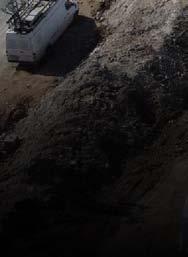

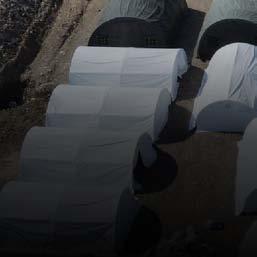

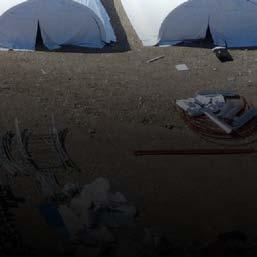
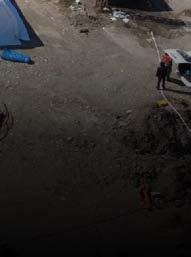
IN MAY/JUNE 2023, Indonesia had been due to host the Under-20 World Cup, the biennial international men’s youth tournament, but that was not to be. On March 29, FIFA (the French acronym for the International Federation for Association Football), the global governing body of soccer, took away Indonesia’s hosting rights.
The decision followed the refusal by I Wayan Koster, governor of the island of Bali, to host an Israeli football team, which effectively meant that Indonesia as a whole would not host them. Under FIFA rules, countries that agree to host an international soccer competition are obliged to accept the participation of qualifying teams even if they come from states with which they do not have diplomatic relations.
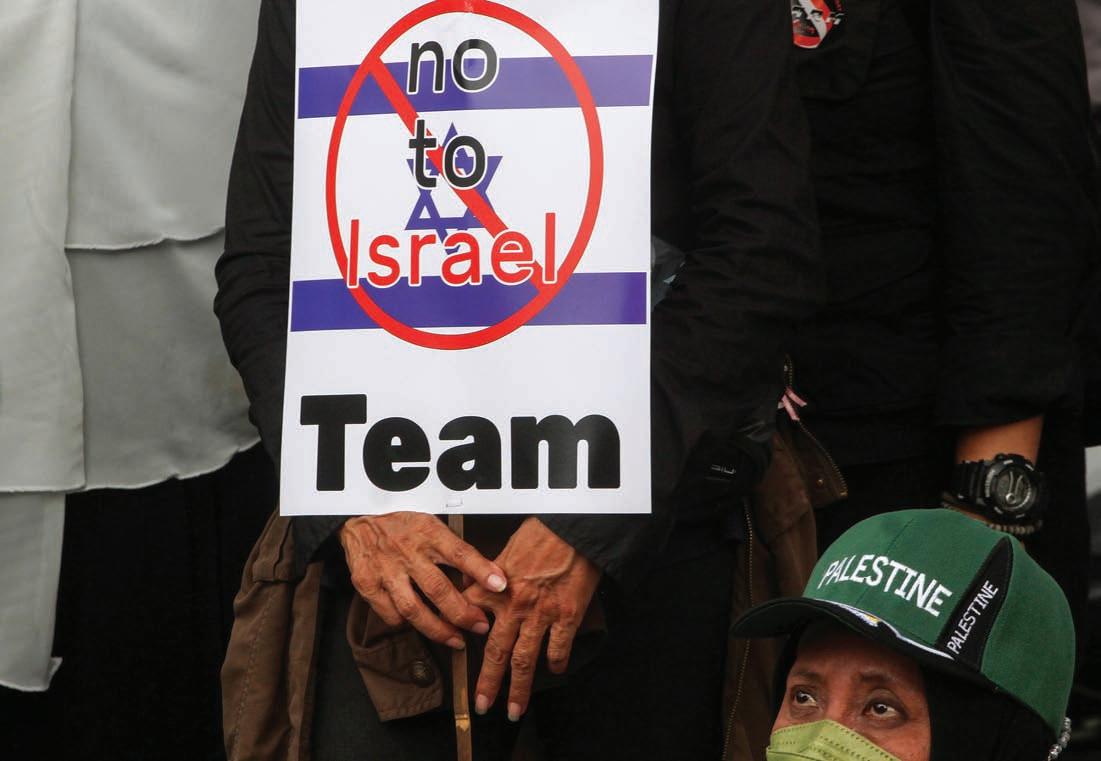
Indonesia supports the national rights of the Palestinian people
and does not have diplomatic relations with Israel but had nevertheless anticipated that the contest would go ahead as scheduled. As recently as March 10, an Indonesian Foreign Ministry spokesperson, Teuku Faizasyah, told a press conference that “Indonesia’s position on the question of Palestine has never changed and remains consistent. Indonesia is one of the few countries that is consistent in supporting the cause of the Palestinian people.” But he also said, “Indonesia hosting the U-20 will not weaken Indonesia’s consistent position on Palestine,” clearly implying acceptance of an Israeli team’s participation.
Earlier in the week, Erick Thohir, chair of the Indonesian Soccer Association (PSSI), had said that Indonesia would guarantee the security of the Israeli team.
These
assurances were given against a background of protests, including a march in Indonesia’s capital, Jakarta, by demonstratorscarrying Palestinian and Indonesian flags. Plans were made for all matches in which the Israeli team would play to take place in the venue where opposition to their participation was expected to be weakest. That was in Bali, one of six locations where the U-20 World Cup games were due to take place. Whereas all the other host venues were in predominantly Muslim areas, 87 percent of the population of the island of Bali are Hindus.
Governor Koster is a Hindu and a member of Indonesia’s ruling party, the Indonesian Democratic Party of Struggle (PDIP)—the same party as Indonesian president Joko Widodo. PDI-P is regarded as a secular party and Bali is one of its strongholds. On March 14, Koster wrote to the Youth and Sports Ministry: “We request the Minister adopt a policy of banning the Israeli team from competing in Bali. We, the provincial government of Bali, declare that we reject the participation of the Israel team to compete in Bali.” He cited Israel’s policy toward Palestine and the absence of diplomatic relations between Indonesia and Israel.
Since it was clear that the Israeli U-20 team would not be able to take part in the contest, FIFA regarded Indonesia as being in breach of its hosting terms and withdrew Indonesia’s hosting rights.
The move was seen by some as a play for popularity by the PDI-P leadership, headed by Megawati Sukarnoputri, former president and daughter of Indonesia’s first postcolonial leader, ahead of national elections, due in 2024. It was not popular with all. Bali’s Legislative Council criticized Koster’s decision. Members of the Indonesian U-20 team and many fans criticized the exclusion of the Israeli team. The PSSI was clearly annoyed, and President Widodo himself expressed disappointment at what had happened. However, Indonesians are generally very supportive of the Palestinians and most would agree with the ban, even if that meant losing hosting rights.
A month later, on April 15, Koster announced that teams representing Israel would not be allowed to compete in the multi-sport World Beach Games, which had been due to take place in Bali in August, with the expected participation of athletes from
130 countries and territories. On April 22, the “Inside the Games” website reported that Gunilla Lindberg, Secretary General of the Association of National Olympic Committees (ANOC), had insisted that the World Beach Games would go ahead as planned on August 5-12. She described Koster’s opposition to Israeli participation as “noise in the media” and said of Indonesia:
“They have signed an MoU (Memorandum of Understanding) that all qualified countries are welcome to the Games so if we hear something we will of course inform people but we felt very much assured when the new Sports Minister who was the Chief de Mission for the Youth [Olympic] Games in Buenos Aires openly made statements and we haven’t heard anything since.”
Days later, Indonesian Youth and Sports Minister Dito Ariotedjo said that there is no problem, as Israel was not going to participate. “The Olympic Committees (ANOC) on April 27, 2023 released the list of countries that will participate, and there is no Israeli contingent, so there will be no more (reason for any) polemic."
Whether the minister's statement is the last word on this question remains to be seen. In 2019, when Malaysia ruled that an Israeli team would not be allowed to participate in the World Para Olympic Swimming Championship, it forfeited its hosting rights. ■
Continued from page 36
Diana. She was my mother, my father, my friend, my girlfriend, my everything.” Mohammad used to visit her at her home. Diana’s father used to tell Mohammad, “You are my second son; Hamza is my first eye and you are my second.”
“We were always supportive of each other; for instance, during her exam period when she was exhausted, I would take her out for a walk,” Mohammad said. “Whenever I was tired of life, she would take me in her arms and tell me that she would always be with me.”
They planned to buy a large house for the children they hoped to have. “We were
planning to save money and work so that our children could have a good life,” Mohammad said.
Mohammad saw his fiancée just half an hour before she was killed in an air raid by Israeli occupation forces on a nearby house. “She called me from her brother’s phone to ask where I was. I dressed and walked to her. When I entered her home, she kissed my hand. She does this every time she sees me,” Mohammad said.
“Yesterday when I saw her, she was as beautiful as the moon,” Mohammad said. But “I felt something strange; my heart hurt. I cried in her lap and told her, Diana, promise me that you will never leave me,” he said. She assured him that she wouldn’t and tried to relax him, playing with his hair and tickling him.
“She asked me to stay with her but I told her I would see her on Friday,” Mohammad said while holding back his tears. Half an hour later, she was dead.
On May 9, Israel launched a series of airstrikes on Gaza. Ten people, including Diana and her 17-year-old sister Eman, were among those killed. “Suddenly, at 2:00 a.m., Abu Diana called me and said, ‘Diana’ and ‘the ambulance.’ He disconnected the line and I was unable to understand what he was saying,” Mohammad’s father said.
“Mohammad, his mother, and I quickly headed to the hospital. Upon our arrival, they told us that Diana had been hit in the head and killed; she had been taken to the morgue,” Sameh said. Hours later, they returned home. Mohammad fainted several times due to the overwhelming emotional trauma.
During the funeral prayer, Mohammad wept and recalled the dreams they shared and their plan to tell their love story to their children. He kept looking at the ring on his right hand that Diana had bought for him. “Diana was the kindest person in the world. I wish I could have given her everything she wanted and we could have continued to live together,” he said.
“Did our love threaten them? Why did they kill her? How can I cope with her death?” ■
 By Emilie Pons
By Emilie Pons
“A
is not a culture,” says New York- based qanun performer Firas Zreik. “Creating art is one of the strongest statements [you can make] at a time when there is a whole propaganda machine which is trying to deny or erase your mere existence.” In March, Bezalel Smotrich, “the minister of finance of Israel went on stage and said there is no such thing as Palestinian people,” Zreik adds. “So it’s not something of the past. It’s a real struggle.”
In March, 27-year-old Zreik released his first fulllength album, “Salute,” which is also the name of the album’s first song, described by Zreik as the most “bombastic,” with a “very intense solo.” The album combines classical Arabic music with jazz. Its musical ideas, its energy and its clarity are reminiscent of saxophonist Kenny Garrett. The record features eight original compositions written before and during COVID-19, in the United States and in Palestine.
Producing an album during COVID-19 was challenging, but Zreik is thrilled with the journey. He finished the album during what he describes as “one of the most horrible times for both humanity and live music.”
Zreik’s creative process involves synesthesia. “I view different keys with different colors,” he says. “So for me ‘Sunflower piece’ is
Emilie Pons is a multimedia journalist and producer based in New York City. Her work has been featured on PRI, TRT World, Radio DW, CBC News, AFP and JazzTimes, among others. In addition, she produces the arts and culture podcast of the New York Foreign Press Association.
a yellow piece.” The qanun is central to the album tracks. It is placed front stage the same way Jaco Pastorius, another innovator, would place the bass front stage. Zreik wants to “showcase the qanun as a lede instrument in the world,” he says. “I think it deserves that.”
Zreik wants to preserve and enrich his Palestinian heritage and culture with new songs and compositions. “Because there is a sense, in Palestine specifically where I am from, because we were detached from the rest of the Arab world, because of the occupation…we suddenly don’t have an industry.” Israelis see Palestinians like him as Palestinians, but the Arab world sees them as Israelis because they live inside Israeli-controlled territory. “So we were left alone,” he adds.
To preserve their identity, Palestinians started to reconnect with Egyptian music (with musical influences such as Riad Al Sunbati and Mohammad Abdo Saleh) and with Syrian and Lebanese music (with Fayrouz, Wadi’ Al Safi, Ziad Rahbani and oud player Marcel Khalife). “So we know that music like no other—even better than Egyptians themselves. But that tremendously affected the natural evolution of the Palestinian repertoire.” From 1948 to 1990, there was little new Palestinian music, he asserts. “Now that’s changing,” Zreik says. “And I would love to contribute to that—creating more songs that can be later attributed to the Palestinian classics.”
Zreik, who shared the stage with singer-songwriter and composer Roger Waters when he was only 20, aspires to become the
Paco de Lucia of the qanun, an instrument only a handful of performers played during his youth. “So it was not common,” he says, and “that kind of made it exotic for me.” Most people learn either the oud, the violin or the piano, he explains. “But when I started studying qanun, that was a new thing.” The qanun, a 19th-century string instrument, means “law” and “rule” in ancient Greek. Zreik was first a cellist, but with the qanun, he felt in his element. “I suddenly felt that I can express myself,” he says. “Because suddenly I can produce the sound of a microtone. And suddenly I can play my music—Palestinian music, Arabic music, music from the region…And as I grew [the qanun] grew with me. Now it’s an extension of me.”
Zreik’s mother, vocalist Amal Murkus, is very well-known in Palestine. But Zreik’s musical influences are very diverse, from Iraqi qanun player Abraham Salman to Azerbaijani pianist Aziza Mustafa Zadeh. And since the qanun is also a Turkish instrument, Zreik listens to Turkish qanun players Goksel Baktagir, Aytaç Dogan and Ahmet Meter. His teacher, Mahran Moreb, also had a tremendous impact on Zreik.
Zreik continuously pays tribute to the oral tradition, live experience and improvised music that he believes is intrinsic to Arabic music. “Very similar to jazz by the way,” he adds. “Things happen on the spot.” And Zreik’s jazz influences range from Charles Mingus to Louis Armstrong, Lee Morgan, Oliver Nelson, John Coltrane and Duke
We have multiple copies of recent issues of the Washington Report for use as promotional material at meetings, conferences or educational programs of appropriate organizations. If you would like to request magazines to distribute at no charge to your group or class, email street mailing information to <multiplecopies@wrmea.org> or call (202) 939-6050 ext. 1105. Number of copies is subject to availability. Please allow at least two weeks for delivery via UPS.
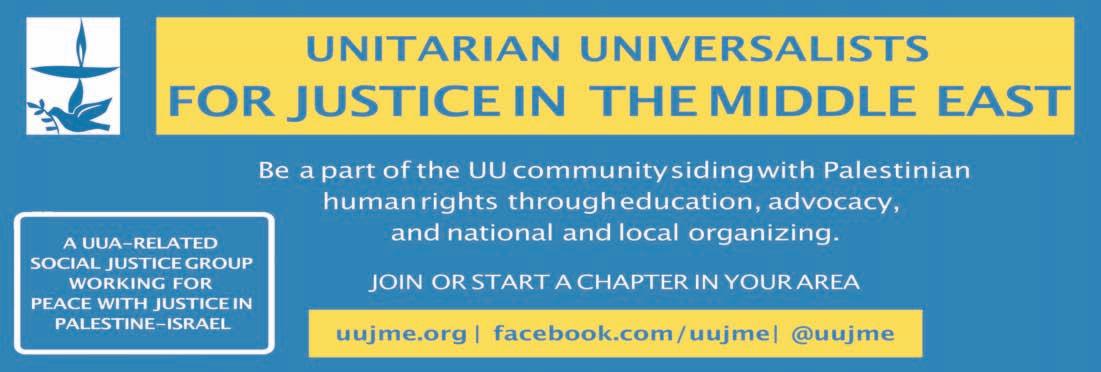
Ellington. Zreik, who trained at Boston’s Berklee College of Music, also listens to Afro Caribbean music and Brazilian music. He loves Hermeto Pascoal, Gilberto Gil and Yamandu Costa.
Zreik started an online teaching business when COVID-19 started. “I now have students from Europe, the Middle East and America,” Zreik says. “And I navigate between two to three different time zones.”
The qanun player hopes that Western listeners can become more comfortable with and open to microtonality. “We’re not playing out of tune,” he says. “We’re just playing very specific things…we mean what we play when we play these kinds of notes.” Zreik hopes more listeners can become open to classical Arabic music, or
(Advertisement)
maqam music. “It can open up a lot of dimensions for you,” he says. Maqam music involves repetition, variation and linear phrasing, Zreik explains. It also has a gravitational center, a tonic. “The note that a certain maqam is built upon is the first note of the scale, and usually also the last note.” He added that “emphasizing that note and revolving around it, [and having] all the other notes...heard in relation to that note” is what allows maqam performers to help listeners connect to the music. That concept is also present in raga and modal jazz music. “In Western harmony, usually each chord brings a new color and creates a forward motion and a functional harmony in a specific key, but it’s not so much about a specific note.”
Zreik, a fervent proponent of Arabic, of his Palestinian heritage and of the qanun, hopes to release a dance album in the future. This could very well make him the Paco de Lucia of the qanun ■
Continued from page 35
as did our university festival. My friends and I spent more than two months translating a scene from “Hamlet” into Arabic, performing it together, and selecting suitable background music, to get extra credit. We felt confident that we could put on a stellar performance, but the university announced that classes (and the festival, of course) would be suspended until the situation stabilizes. ■
Activists in orange jumpsuits, representing the men who are still being held at the U.S. detention facility in Guantánamo Bay, Cuba, participate in a protest in front of the White House on Jan. 11, 2023, in Washington, DC. Activists
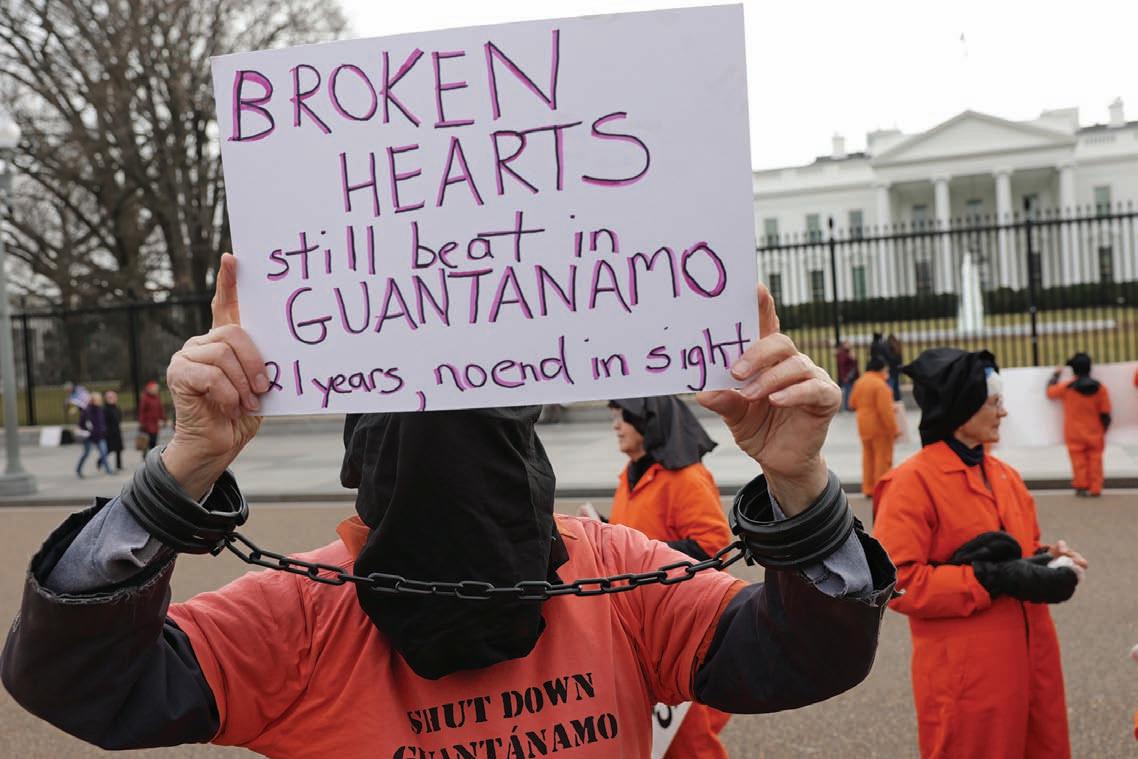
first
to
Bay
TWO SIGNIFICANT statements released recently have sounded the alarm on the state of medical care at the Guantánamo Bay detention center. In March, the United Nations Human Rights Council released a letter from seven U.N. experts criticizing the inadequate medical care provided to detainees, noting “systematic shortcomings in medical expertise, equipment, treatment and accommodations.”
Then, in April, in a break with traditional protocol, the International Committee of the Red Cross (ICRC) echoed the U.N. experts’ con-
Yumna Rizvi is a Policy Analyst at the Center for Victims of Torture in Washington, focusing on human rights and national security, and refugee and asylum protections. She has appeared on Al Jazeera, Voice of America Urdu, and spoken at the European Parliament. This article was published on April 29, 2023 in Al Jazeera. Reprinted with permission.
cerns and urged the United States to “find adequate and sustainable solutions…as a matter of priority.” The ICRC very rarely comments publicly on conditions of detention. As an independent and neutral humanitarian organization, it communicates concerns with governments privately.
Thus, the release of these two statements signals that Guantánamo’s medical care crisis has reached a point where it can no longer be ignored, and the worst possible outcomes—including detainees dying—may be on the horizon. A serious course correction is long overdue.
For years, independent medical experts, former military personnel, and human rights groups (including my organization, the Center for Victims of Torture) have documented and raised concerns about deficiencies in medical care at Guantánamo.
For example, detainees’ medical histories exclude information about their trauma and torture, or remain classified. Some former medical personnel have said they were instructed not to ask about detainees’ torture. Their failure to do so, and to document any trauma history, violates the U.S.’ responsibility to provide adequate care under international norms.
Yet, the effects of the torture and cruel, inhuman and degrading treatment that many detainees were subjected to, as well as a lack of adequate care thereafter, have compounded their conditions.
In January, Ammar al-Baluchi, who suffers from a traumatic brain injury and other impairments because of his torture, was diagnosed with a spinal tumor, which according to his lawyers could “eventually affect [his] motor or sensory nerves as it grows.”
Detainees also suffer from seizures, loss of vision, gastrointestinal problems, posttraumatic stress disorder and other longterm physical and psychological consequences of torture.
The U.N. and ICRC flagged “accelerated aging” of detainees as a major concern. As explained by the U.N. Independent Expert on the rights of older people, this is brought on by “poor socioeconomic and health backgrounds, along with the harmful effect of imprisonment on health and well-being.”
In particular, the U.N. called attention to the deteriorating condition of Abd al-Hadi al-Iraqi, a detainee in his 60s with a degenerative spinal disease who is now suffering from paralysis; the lack of adequate care is exacerbating his condition and harming his quality of life.
Medical care provision at Guantánamo is also affected by lack of staff and inadequate equipment, including broken imaging machines. In a disturbing example of Guantánamo’s limited capabilities, a medical officer said, “the prospect of attempting” a complex surgery on one of the detainees at its hospital “scares the hell out of me.”
And unlike military personnel and civilians on the base, the detainees are prohibited by law from leaving and receiving med-

ical care outside Guantánamo even in dire, life-threatening circumstances.
Even a previous Guantánamo commander became exasperated by the situation.
In 2019, Rear Admiral John Ring told reporters, “Unless America’s policy changes, at some point we’ll be doing some sort of end-of-life care here…A lot of my guys are prediabetic…Am I going to need dialysis down here? I don’t know. Someone’s got to tell me that. Are we going to do complex cancer care down here? I don’t know.”
The recent U.N. and ICRC statements suggest that those questions still have not been answered, and that little, if anything, has changed.
Many of Guantánamo’s medical care problems can be fixed but there is one that cannot—detainees continue to distrust government doctors due to the role of medical staff in torturing them (and/or other men).
But even if a provider succeeds in establishing rapport and trust, medical personnel at Guantánamo rotate in and out so frequently, there will still be a lack of continuity in care.
In June 2022, organizations, including the International Commission of Jurists and Amnesty International, stated that none of the detainees “had access to an effective remedy or reparation for the atrocities they suffered,” and that under international law, “deprivation of effective medical treatment while still in detention constitutes a continuing act of torture.”
The Biden administration committed to closing Guantánamo and has made progress toward that goal. Ten detainees have been released from the facility and resettled to third countries or repatriated. The government is also in negotiations for a plea deal with the five defendants in the 9/11 case, which would finally bring an end to that interminable litigation. However, senior administration officials are dragging their feet on key policy questions that need to be decided before negotiations can go any further.
Today, a finite group of 30 detainees remains: 16 who are cleared for release, 10 who have active cases in Guantánamo’s mil-
itary court system, one who is serving a life sentence, and three “forever prisoners” who continue to be held without charge or trial.
To that end, the ICRC is calling on the U.S. to “overcome the political and administrative deadlock” that is holding up the remaining transfers and the “fate of all other detainees.”
But for as long as any of the men remain, the government must develop and provide them with comprehensive, trauma-informed, and culturally competent treatment.
The U.N. and the ICRC have sounded the alarm. It is time to call a code red unless the U.S. wants to deal with a humanitarian and human rights crisis that will further tarnish its global image. ■
1999,
ACCORDING TO the United Nations Children’s Fund (UNICEF), 4 million of Libya’s estimated population of 6.5 million people will face serious water shortages. Like many other countries in the Middle East and North Africa region, Libya ranks high on the water scarcity index. It is one of the driest countries in a region that is home to 11 of the 15 driest countries in the world. Pundits and analysts have long predicted that the next regional war could well be about water.
The World Resources Institute projects that Libya, by 2040, will suffer from severe water stress, which is a measure of the water withdrawal against the available renewable quantities of surface and underground water. If the country does not take any immediate measures to tackle the problem, it could get worse; desertification could become an even more serious problem than it is now as more
Mustafa Fetouri is a Libyan academic and freelance journalist. He received the EU’s Freedom of the Press prize. He has written exten‐sively for various media outlets on Libyan and MENA issues. He has published three books in Arabic. His email is mustafafetouri@hot‐mail.com and Twitter: @MFetouri.
land is cleared for ever-expanding cities without any green belt around them to hold the desert back.
Rain is almost negligible in Libya, coming in late winter and early spring in quick downpours lasting only minutes at a time. Making the situation worse is the absence of running rivers. Yet Libya today has more water security than many of its neighbors.
Tunisia, for example, imposed water rationing last April by cutting water for at least seven hours every night. Algeria faces the same problem, while Egypt worries about the consequences of Ethiopia’s dam on the River Nile which provides Egypt’s only water sources.
Libya’s water deficit has many contributors: low annual rainfall, climate change, harsh desert climate, rising demand, water misuse, aging pipeline networks and lack of investment in water resources. Industrial and agricultural water demand, coupled with the increase in population numbers, have further exacerbated the problem.

Libya’s water shortages go back to the 1930s while the country was under Italian occupation (1911–1945) but lack of resources and finances made it difficult to solve. All that changed when oil
companies started drilling for oil in the early 1960s and found water in abundance. But all underground aquifers were found deep in the desert and hundreds of miles away from the population centers along the Mediterranean coast in the north where most Libyans live.
How best to make use of such a precious commodity was the main question facing successive Libyan governments. In the early 1970s, the state brought in international experts to study the feasibility and economic cost of building a man-made river to transport water from the southern regions to the north where it is most needed.
When the idea of the Great Man-Made River (GMMR) was first floated in the 1970s—entailing the construction of a network of pipelines to transport water across thousands of kilometers—it sounded like a crazy idea. Nevertheless, Colonel Muammar Qaddafi decided to launch the project in 1983. The timing was hardly conducive. Libya’s international relations were in shambles. The country was under U.S. sanctions including export bans of some technologies and a ban of oil exports, the main source of Libya’s revenue. Libya could not even enlist the help of private American contractors. Because Qaddafi was considered an international pariah by the West, Libya’s access to international financial markets to finance such a huge project was severely limited.
But the water problem was growing by the day and sea water was already seeping into local wells, compromising the drinking water. Qaddafi went ahead with the project, which he called the “Eighth Wonder of the World.” To locally raise the estimated $30 billion needed to fund the project, the government raised taxes on luxury goods including tobacco and air travel. Even imported bananas were considered a “luxury” and were taxed at a higher rate.
Some 13,000 water wells were drilled, and a plant was built to produce the prestressed concrete pipes. These pipes
GMMR is considered the biggest irrigation project in the world. It pumps some 6.5 million cubic meters of fresh water every day, providing drinking water to nearly 7 million people. It was designed to irrigate some 400,000 acres of desert to make Libya agriculturally self-sufficient and a regional producer.
Water comes from 13,000 wells with a depth of 500 meters drilled deep in the desert hundreds of kilometers away, tapping into huge underground Nubian Sandstone Aquifer lakes. Four-meterwide pipes made from pre-stressed concrete run across more than 2,800 kilometers now; when completed it would cover most of the country.
Water is collected in at least ten open and underground reservoirs before being pumped into local networks in cities, towns and farmlands nearby. Omar Mukhtar and Al-Gardabia are the two main reservoirs and have become tourist attractions.
would be the backbone of the network sprawling across Libya covering nearly one third of its surface area. The entire project cost Libya a staggering $30 billion, but it was money well spent: the country’s water problem was solved at less cost than the alternative solution (desalination plants), and the country was able to avoid international borrowing, which would have been available only at prohibitive rates.
Libya addressed one domestic problem but found that it was in the crosshairs of the international community. Accused of supporting international terrorism by the United States and its allies, Qaddafi was further accused of attempts to produce chemical and biological weapons.
TIME magazine ran a three-page article in its exclusive April 1996 issue in which it claimed that Libya was digging under the Tarhouna Mountains, southwest of Tripoli, to build a chemical weapons plant. In fact, the excavation was intended to bury GMMR’s huge pipelines
GMMR water is cheap compared to desalinated water. Experts estimated that one liter of water costs only 10 percent of the cost of desalinated seawater. Based on 2007 retrieval rates, the GMMR could secure the water needs for the country for the next 1,000 years. Others have warned that the water might run out in 100 years.
The project was divided into four stages, each with target water delivered volumes and each with its own time scale from start to end. Only phases I and II have been completed while phase III is only partially operational and phase IV is yet to be finished. Most of the remaining work has to do with subconnections, making water available to more remote areas deep in the country’s interior. No new wells are planned nor are any new massive pipes to be connected, as the main river body is already complete.
supplying water to the capital. Washington Report’s late publisher, Andrew I. Killgore, personally visited the place to dispel that story (see pp. 56-57, March 2001 Washington Report). The TIME article quoted CIA Director John Deutch as saying that Libya was building what he called “the world’s largest underground chemical-weapons plant.” In September of the same year Jane’s Defense Weekly published an article titled “Qaddafi Tunnels Into Trouble both Within and Without.” To date neither publication has apologized for the error or issued a correction.
In August 2022, Washington’s Middle East Institute published a study that cast doubt on the economic feasibility of the GMMR even though it started supplying water to Benghazi, in the east, in 1991 when phase I was completed and to Tripoli in 1996.
Today, GMMR provides 70 percent of fresh water to Libyans, from the Egyptian borders in the east to the Tunisian borders in the northwest. The ultimate aim
was to transform the country’s mostly desert terrain to blooming fertile land producing everything from wheat to all kinds of fruits and vegetables. Indeed hundreds of farms were developed in once desert land and most of them were handed over to farmers at a fraction of their cost.
Eleven years after Qaddafi’s assassination, his main legacies, including GMMR, are suffering the many consequences of the NATO-supported rebellion that ended his rule. The entire project’s infrastructure is under threat. Political instability, negligence, illegal connections to its pipelines and badly maintained water networks are among the biggest problems. In July 2011 NATO bombed the biggest pipemaking plant at Brega, in eastern Libya, killing six of the facility’s security guards. In a press release the alliance claimed it was responding to ground fire coming from the facility.
Even worse, the GMMR has occasionally been used as a weapon against certain areas of the country; fighting militias cut water flow to areas controlled by their rivals.
Financial corruption is also depriving the project from enough funds to expand
and maintain its infrastructure. GMMR managers report that overall supervision and security during Qaddafi’s rule was much better than it is today. Personally committed to the project, Qaddafi had a habit of making unannounced visits to different sites and to the management
headquarters to inspect operations for himself. Maintaining a stable power supply has also become another problem as power cuts are frequent.
Post-Qaddafi Libya has been failing on almost every level but it cannot afford to fail when it comes to providing water to its people. GMMR should be prioritized in state budgeting, and intercity water connections must be modernized as quickly as possible to end leaks. The country also should pass stricter anti-sabotage laws to protect GMMR. Furthermore, GMMR should have its own power stations, ending its dependence on the already decaying power network and outdated power stations.
As Libya earns more money producing more oil (current production is about 1.2 million barrels a day) and the cost of desalination is decreasing, the government should consider launching desalination plants. This would relieve the pressure on GMMR and help Libya reserve water for larger scale agriculture projects to turn the country into a regional agriculture producer. But such policies require political stability, leadership and political will—all of which are lacking in Libya today. ■

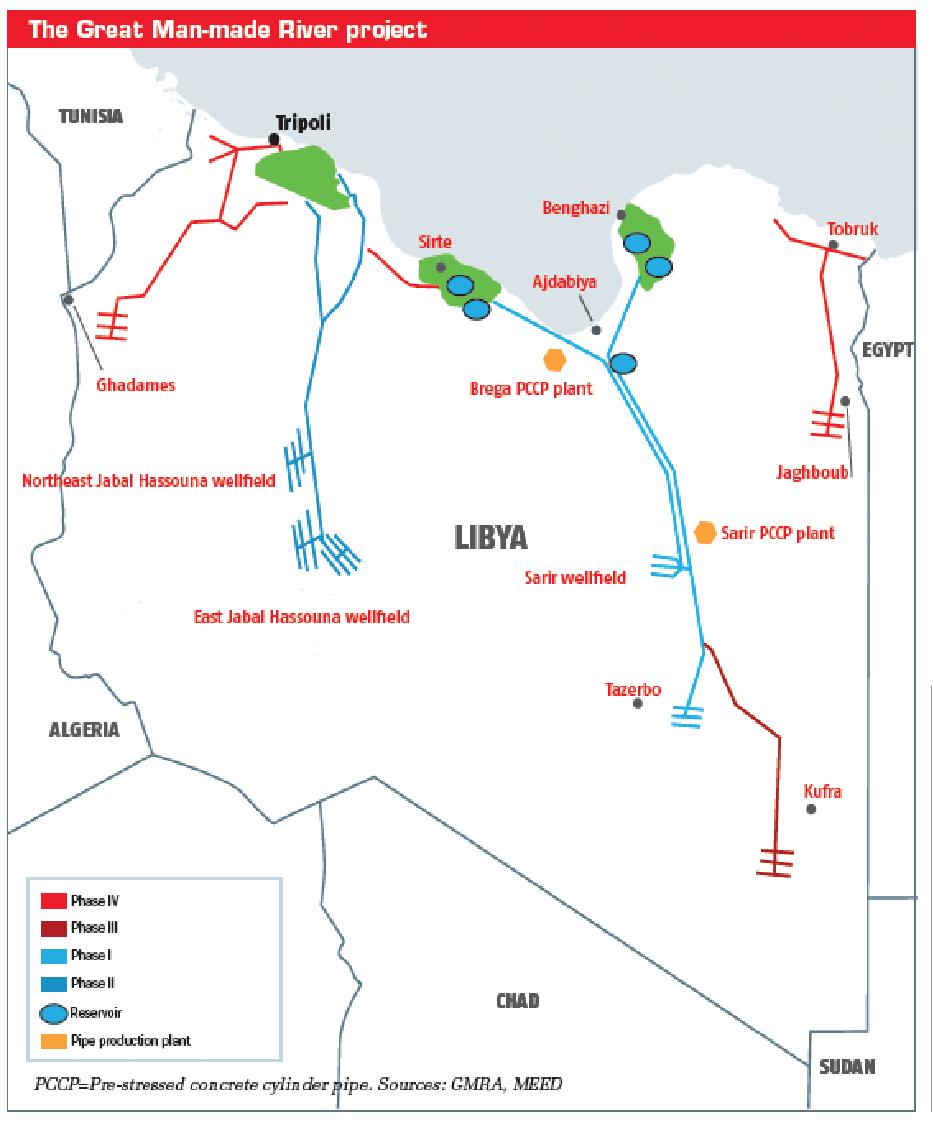
MONTHS AFTER a federal court judge ruled that Canada is required to repatriate all Canadians held in northern Syria detention camps, the fate of several people held there still remains uncertain. The Canadians in the camps have been held without charge since 2019, with the exception of Jack Letts, who has been held for six years.
In January 2023, Justice Henry Brown, a Federal Court Judge, ruled in the Bring Our Loved Ones Home (Boloh) case that Global Affairs Canada must repatriate to Canada four Canadian men and 19 women and their children held in the camps. Ottawa appealed Brown’s order and argued that Canada’s Charter of Rights and Free-
Candice Bodnaruk has been involved in Palestinian issues for the past 14 years through organizations such as the Canadian BDS Coalition and Peace Alliance Winnipeg. Her political action started with feminism and continued with the peace movement, first with the No War on Iraq Coalition in 2003 in Winnipeg.
doms does not guarantee the right of return. When this article went to press the case was still before the courts.
“It’s an important ruling with global human rights implications that vindicates the rights of a group of Canadian Muslims who have been consciously exiled and abandoned by Ottawa to [face] torture,” Matthew Behrens, coordinator of Stop Canadian Involvement in Torture, said of Justice Brown’s decision.
“Canada is once again showing itself to act just like the rogue states it condemns when they violate international law,” Behrens said to the Washington Report. Behrens said Justice Brown’s ruling makes it clear that it is time to bring all Canadians detained in northeast Syria home.
“The judge ruled that the men have a right to return to Canada based on section 6 (1) of the Charter of Rights and Freedoms which reads every citizen of Canada has the right to enter, remain in and leave Canada,” he explained.
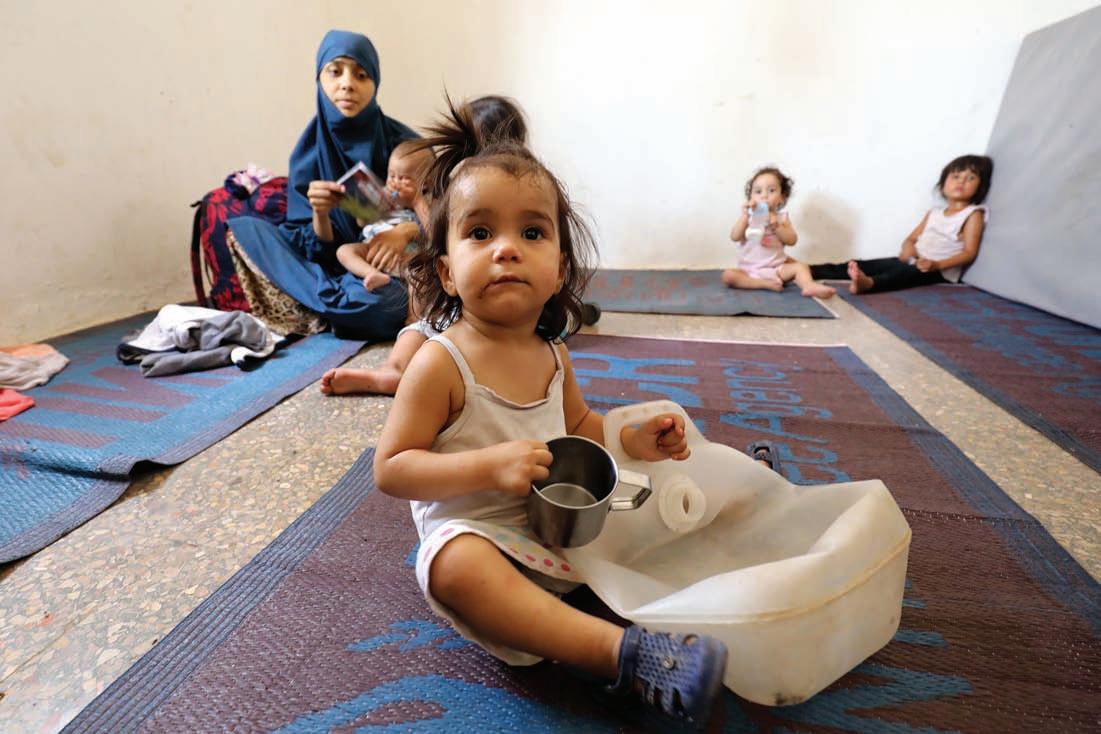
Previously Ottawa had refused to repatriate any women and children. But in early April, as part of the Boloh ruling, four women and their ten children arrived in Canada from Al-Roj detention camp in northeast Syria. In addition, six children returned to Canada without their mother who is a Canadian.
In a press release, Global Affairs Canada said: “Canada has taken extraordinary steps to repatriate Canadian women and children identified in the Bring Our Loved Ones Home litigation...As long as conditions allow, we will continue this work.”
Among the four Canadian men still held in Syria is Jack Letts, whose mother Sally Lane has long campaigned for his release. “We have campaigned for so many years to bring everyone home, and while it is wonderful to know that some of the children and their moms will no longer be forced to endure conditions the U.N. calls akin to torture, my son is still held without charge along with other mother’s sons,” Lane said in a statement on the Homes Not Bombs website.
Behrens called Ottawa’s appeal of the repatriation order a cruel delay tactic, based on arguments that were soundly dismissed in the original court decision.
Behrens explained that Islamophobia has driven Ottawa’s policy on the detainees from the very beginning. He said the Canadian government depends on people’s complete lack of historic understanding of who went to the region and why and added that those in the detention camps have all been “tarred as ISIS.” In fact, he claims that among the camps’ populations, many of the women were trafficked, some of the men were humanitarian aid volunteers, and many were actually victims of ISIS or made a bad choice because they believed propaganda videos promoting a utopian society and couldn’t escape once they got there.
Behrens pointed out that a week after the January court ruling, a Global Affairs Canada official delivered what he called “an astounding ultimatum” to four non-Canadian mothers of Canadian children in northeastern Syria. The women were told to surrender their children to Canadian custody
within 10 days or remain there with them forever because Canada would never come for them again.
“It was an appalling moment redolent of the forced separation of Indigenous children from their families on which this country was built,” he said.
Behrens also pointed out that the ultimatum came on the same day Canada announced its first representative to combat Islamophobia.
Global Affairs Canada adds that conditions in the camps in northeastern Syria are deteriorating, which raises real concerns about the health and wellbeing of the Canadian children.
For Behrens, the treatment of the Canadians held in the detention camps is the latest in a long history of cases that precede 9/11 in which Canadian state agencies have deliberately harassed, securitized and terrorized targeted racialized communities.
“This is one more example of how Canada has demonized a whole group of people and, having dehumanized them, proceeded to strip them of their rights,” he said, of Canada’s refusal to bring the remaining Canadians home.
He added that Canada made a robust diplomatic effort to save two non-Muslims, Michael Kovrig and Michael Spavor, who
were arbitrarily detained in China for three years before they were freed in September 2021.
In what is being called a “textbook example” of anti-Palestinian racism, Palestinian solidarity organizations are demanding a Halifax School Board expand its Equity, Diversity and Inclusion (EDI) policies by acknowledging anti-Palestinian racism.
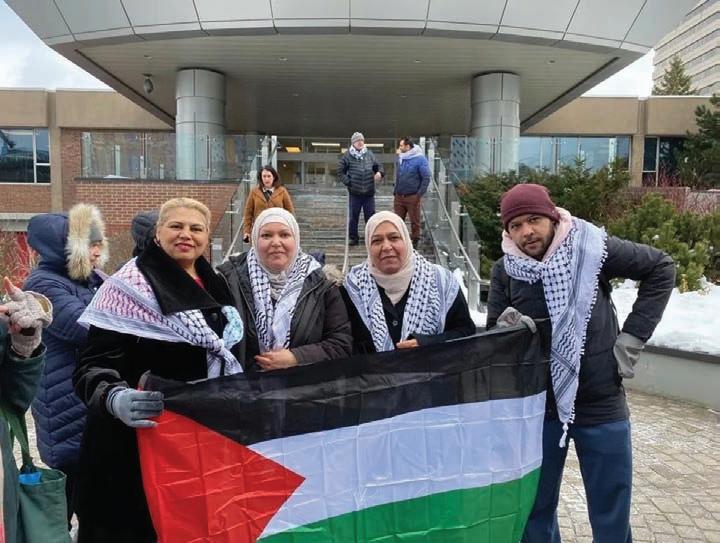
It all began during a Cultural Day event at Park West School last winter, when six students of Palestinian heritage came to school wearing keffiyehs. They were told by the school principal to remove them, claiming they “represent the colors of war.” Cultural Day is part of the school’s “Wellness Week.”
The kids’ parents were shocked at the events and also expressed fear at sending their kids back to Park West.
In response to the incident, people wrote thousands of letters supporting the students. Canadians for Justice and Peace in the Middle East started their own campaign; Atlantic Canada Palestinian Society (ACPS) wrote to the school board, the Halifax Regional Center for Education (HRCE) and Ministry of Education as well as Mem-
bers of Parliament (MPs) and Members of the Legislative Assembly (MLAs) in Halifax. Hundreds of students at the school also held protests against the keffiyeh ban at the Minister of Education’s office.
Lana Khammash, president of ACPS, explained that although the Regional Executive Director of HRCE apologized for the incident, and the Deputy Minister of Education and Early Childhood Education has confirmed that a professional development session during the March break would discuss the incident and that related culturally responsive training for staff would take place in the coming weeks, there has been no further communication from the school board or HRCE.
Khammash also said it was only after community pressure that the school principal eventually admitted to the incident and issued an apology.
“The ACPS hopes to hear about any followup regarding the incident and if awareness about anti-Palestinian racism has been raised among educators and staff, particularly in the context of [Equity, Diversity and Inclusion],” Khammash told the Washington Report
Lindsey Bunin, Communications Officer with HRCE, said since the March incident Park West School staff members have taken part in professional learning around diversity. In a statement to the Washington Report, Bunin said the school administration is working with the HRCE Diversity Team to set up a Student Equity Team within the school with student and teacher leads.
“We are committed to ensuring that all students of all cultural backgrounds feel safe and welcomed in all aspects of their educational experience,” Bunin’s statement read.
Bunin explained that students have not been banned from wearing keffiyehs to school and that there are in fact no bans on what students choose to wear to school.
Moreover, in a message sent to families soon after the incident, school principal Benedette Anyanwu wrote that it was “an isolated incident involving a few students.”
In response to the incident, ACPS has launched Keffiyeh Kids, in collaboration with their partners.
The campaign will educate friends, educators and community members about the keffiyeh and encourage students to write, draw and send cards to their Palestinian peers who were affected by the incident.
“We will continue to advocate the adoption of a more inclusive EDI Framework that prohibits all forms of anti-Palestinian racism and educate teachers, principals, staff and students about the prohibition of the keffiyeh, which is a significant symbol of Palestinian identity,” Khammash concluded.
CJPME is calling on the school to issue an immediate apology, provide education around the keffiyeh and antiPalestinian racism to their staff and introduce anti-Palestinian racism into their EDI frameworks.

Members of Winnipeg’s Palestinian community and their allies gathered in midApril to demonstrate against ongoing Israeli attacks at al-Aqsa Mosque in East Jerusalem. Protesters held large Palestinian flags and stood facing Portage
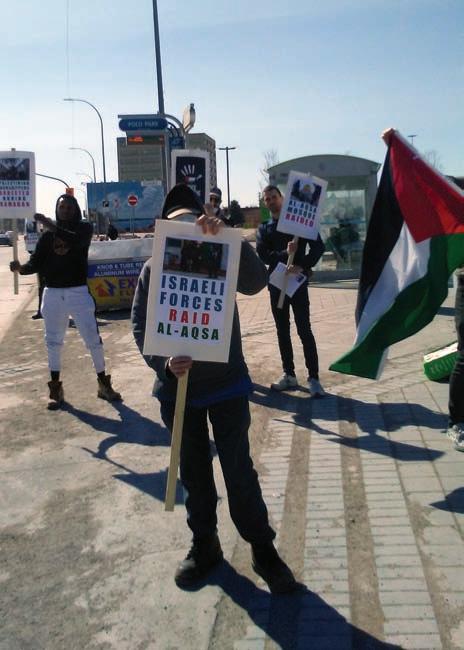
Avenue, Winnipeg’s busiest street, while others carried placards with messages like “Canada Must Condemn Israeli Military Violence” and “Canada Must Stop Selling Weapons to the Israeli Military.”
Participants included Peace Alliance Winnipeg and Winnipeg Coalition Against Israeli Apartheid, and a member of Independent Jewish Voices played the tambourine. Participants chatted with passersby about Palestine and distributed leaflets that explained the violence Palestinians have faced recently simply for wanting to worship at the al-Aqsa Mosque. Passing motorists honked in support. ■
Arab Americans across the country showcased their cultural heritage at community events, festivals, iftars and workshops during Ramadan and Arab American Heritage Month (April). In Montgomery County, where I live, I checked out booths at the Middle Eastern American Heritage Month festival at the Executive Office Building auditorium in Rockville, MD on March 11.
The Islamic Center of Maryland held a Ramadan Celebration and Appreciation for educators on March 21, in Gaithersburg, MD.
The Office of Community Partnerships celebrated Montgomery County’s rich and diverse community with another celebration on April 30. Representatives of the Arab American community gathered to share the richness of their culture with displays, dancing and a taste of Arabic food.
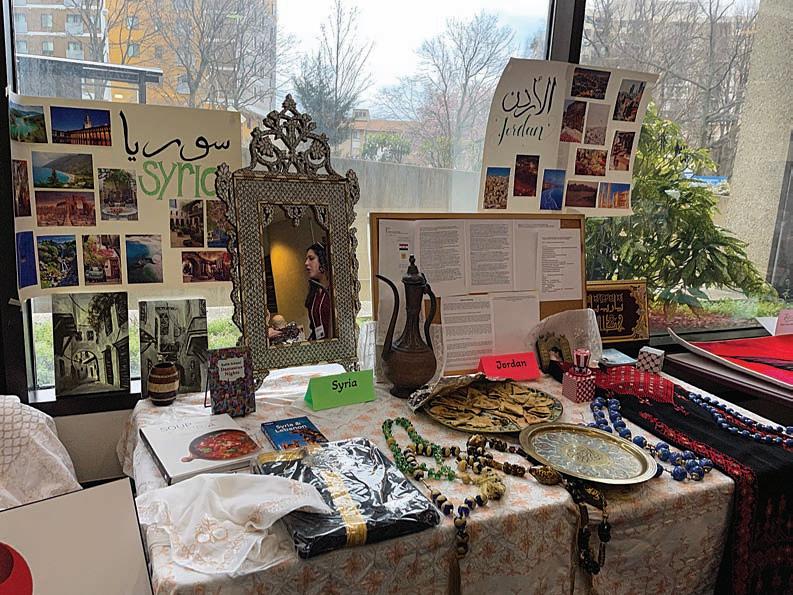
The Arab America Foundation, in collaboration with the Arabs at Amazon, hosted its annual National Arab American Heritage Month Commemoration on April 26 at Amazon Headquarters in Arlington, VA.
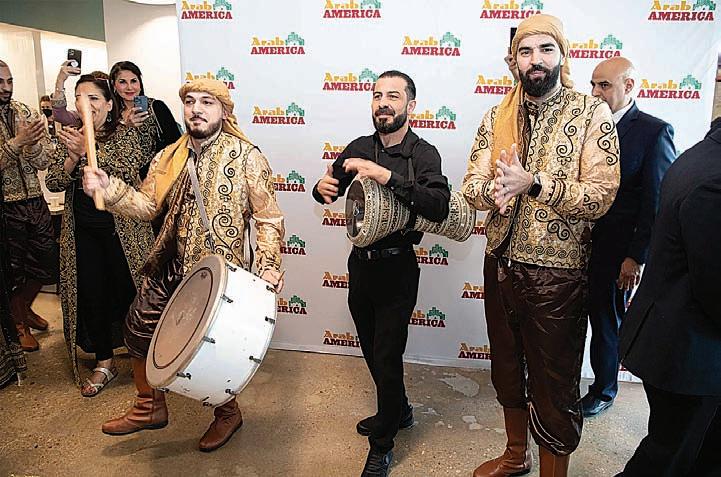
Carl Hage, founder of Arabs at Amazon, welcomed guests to Amazon Headquarters. Arab Americans from 16 states attended the event, which highlighted Arab American accomplishments, history, fashion and music and featured remarks by dignitaries, a cultural fashion show, live music, poetry and lots of dancing, led by the Faris El-Layl Folkloric Dabke Troupe.
Heather Raffo, an Iraqi-American awardwinning playwright and actress, performed
her newest piece titled “What Arab Americans Know.”
The evening event followed an afternoon lunch at the Library of Congress, hosted by Palestinian-American Rep. Rashida Tlaib (D-MI).
In 2017, Arab America, led by Warren and Dr. Amal David, launched a movement for a month-long holiday, the National Arab American Heritage Month (NAAHM). This year more than 250 Arab Americans in 28 states approached their governors, state officials, mayors and county executives, requesting proclamations and resolutions. They received 126, including 43 state governor proclamations.
President Joe Biden issued an historic proclamation recognizing NAAHM for the month of April 2023. Staff members from Rep. Tlaib’s office framed the proclamation and presented it to Dr. Amal David.
Biden said, “This month, we join together to celebrate the immeasurable contributions of Arab Americans to our nation and recommit ourselves to the timeless work of making sure that all people have the opportunity to achieve the American dream.” He also stated, “Today, the achievements of Arab Americans are reflected in the arts and
in police stations, firehouses and every branch of the military. Arab Americans are also proudly serving throughout my administration, bringing a diversity of expertise that helps make this country stronger, more prosperous and more just.”
Arab America received a special taped message from First Lady Dr. Jill Biden and Secretary of Education Dr. Miguel Cardona. Muna Howard

APWA is a non-political non-profit grassroots organization established in 2004 by American Palestinian women in the Washington, DC metropolitan area. In addition to nurturing Palestinians’ national and cultural identity in North America, APWA raises money for scholarships and playgrounds in the occupied Palestinian territory and autism therapy at the Schneller Refugee Camp in Jordan.
The evening program helped raise funds for those programs, and included a Palestinian fashion show, dabke dancers and a powerful performance by acclaimed Palestinian classic vocalist Nibal Malshi.
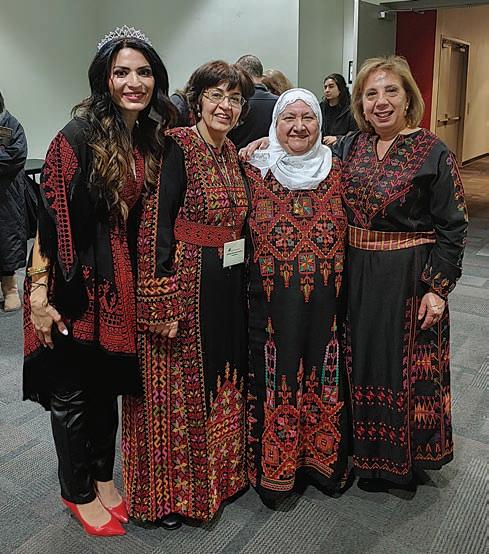
APWA organizers presented the “Palestine in My Heart” award to Palestinian-American educator Samira Hussein, who has been at the forefront of “chipping away at the walls of ignorance and misunderstanding” by educating students and teachers in Montgomery County, MD Public Schools.
tireless, prize-winning advocate for an inclusive curriculum in Montgomery County.
Thanks to her work, teachers now take mandatory cultural sensitivity courses and the school system also revised its testing policies to respect the religious observances of Muslim students.
Due to her leadership, her county in the suburbs of Washington, DC recognized April as Arab America Heritage Month more than 20 years ago. Year after year, Maryland leaders have issued proclamations at joyful celebrations Hussein helps organize. APWA chose a trailblazer and model for other activists in selecting Hussein for the “Palestine in My Heart” award. For more information visit <https://apwausa.org>. —Delinda C. Hanley
The American Palestinian Women’s Association (APWA) celebrated International Women’s Day with an exceptional event cohosted with the Palestinian Youth Movement at George Mason University’s Johnson Center on March 18. Middle East Books and More joined more than 40 vendors at a lively bazaar where students and families shopped for books, food, spices, olive oil, T-shirts, dresses, embroidery, jewelry, art work and handmade crafts. Miko Peled, author of The General’s Son, and Ramsey Hanhan, author of Fugitive Dreams, signed copies of their books.
During the first Gulf war in 1990, the Hussein family began enduring dozens of hate crimes, likely due to the perpetrator assuming they were related to Iraqi President Saddam Hussain. The Palestinian-American family’s vehicles were van dalized with “Go Home” and “Pig” scratched, alongside swastikas on the hoods. On the sixth anniversary of the 9/11 attacks, it started up again. A former neighbor was convicted (but managed to avoid his sentence) after smashing glass doors and throwing a steady barrage of hate notes, ethnic slurs, dead chickens, beer cans and other trash into their yard.
Samira Hussein turned the negative experiences into something positive. She began volunteering at schools and teaching young people about her culture. She now works for the school system and is a
The National Arab American Women’s Association (NAAWA) held its 8th annual International Women’s Day luncheon on March 8 at the Westin Tysons Corner hotel in Virginia. Master of Ceremony Dr. Manal Fakhoury said the speakers chosen to tell their stories at the lunch show that women are taking an active role in forming a more equitable and compassionate society. NAAWA is focusing on educational outreach to address stereotypes and change inaccuracies in school curriculums regarding Arabs. In February, NAAWA Youth was formed to empower Arab American youths to embrace their culture.
Arab American artist Helen Zughaib was born in Beirut, Lebanon and lived in the Middle East and Europe before coming to the United States to study art. “I love being in this room,” she said. “For two hours I don’t have to explain who I am.” After 9/11, the acclaimed artist saw the importance of using her art as a vehicle to bridge East and West and to show commonalities and create empathy. After hearing presentations by NAAWA Youth, Zughaib said she was proud to pass the torch on to the next generation.
Electrical engineer Michelle Thomas, pastor of the Holy and Whole Church, who leads the NAACP branch in Loudoun County, VA, urged attendees to empower themselves and each other, and then
place it at the feet of the next generation. African and Arab Americans need to study and review books that distort their history and most importantly, write own stories, she said. “Until the lion learns how to write, the story will always glorify the hunter,” she warned.
Dr. Lara Sheehi, George Washington University assistant professor of clinical psychology, described the need for NAAWA to continue to challenge the myths that Arab women don’t matter in their culture.
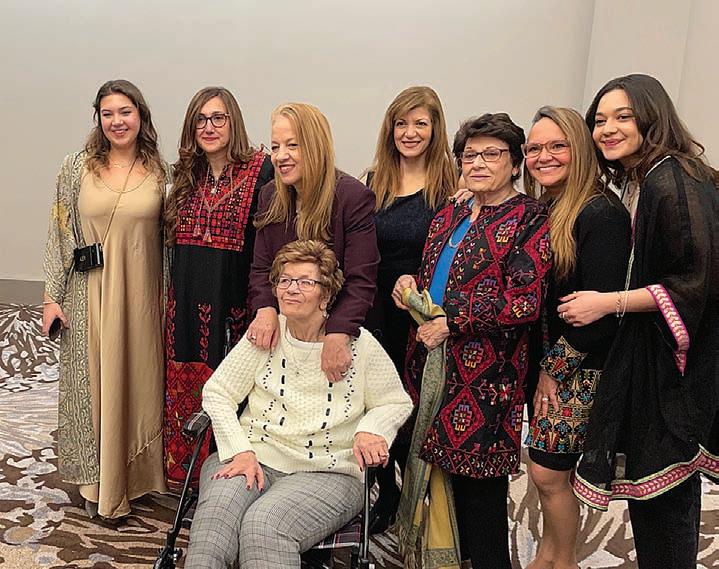
Attorney Lina Hadid paid tribute to her aunt, Ghada Hadid, vice president at Riggs National Bank, who died after a heart attack, COVID-19 and pneumonia. She was “selfless, hard working and a second mother to all of us,” she said. Ghada’s famous real estate developer brother, Mohamed, and super-model nieces, Gigi and Bella, took to Instagram to write, “You have been a voice for peace. You left a legacy to fight for us all. We love you.”
—Delinda C. Hanley
In honor of Arab American Heritage Month, on March 16 Georgetown University’s Center for Contemporary Arab Studies (CCAS) and the Prince Alwaleed Bin Talal Center for Muslim-Christian Understanding
(ACMCU) co-hosted a hybrid workshop for Montgomery County Public School teachers in Maryland.
Americans can go through their entire school education without reading a single novel or social studies chapter about Arabs or Arab Americans. Dr. Susan Douglass, the CCAS education outreach director who conducts K-14 education programs for school teachers and provides curriculum consultation, offered ideas for teachers to use in order to expose their students to other cultures.
Nora L. Murad, Ph.D., author of the new young adult novel, Ida in the Middle (avail-
able from Middle East Books and More), addressed the importance of assigning novels like hers in literature or social studies classes.
Some of the authors speakers recommended for children include Randa AbdelFattah, Ibtisam Barakat, Ahlam Bsharat, Susan Muaddi Darraj, Sonia Nimr, Naomi Shihab Nye and Wafa Shami.
For adults, some prominent fiction and non-fiction writers available in English were recommended, including Susan Abulhawa, Hala Alayan, Ghassan Kanafani, Sahar Khalifeh, Edward Said, Adania Shibli, among many, many others.
In-person attendees were also treated to a Palestinian-style dinner and books!
—Delinda C. HanleyGeorgetown University’s first mosque (masjid) was dedicated on March 18 in honor of Yarrow Mamout, one of the area’s earliest non-native residents. Yarrow was an enslaved West African of the Fulani people who arrived in Annapolis, MD in 1752 at age of 16 and was a slave for 44 years. A devout Muslim, Mamout spoke Arabic and Fula, along with passable English. He was eventually able to purchase his freedom at the age of 60 in 1796. After overcoming a series of unfortunate financial events, he bought a plot of land and built a home on Dent Place NW in Washington, DC.
It is, therefore, a most fitting tribute to both Mamout’s life and enduring faith that the new mosque, only a few blocks away from his former home, is named in his honor. The mosque replaces a prayer room that was first established on the campus in the aftermath of 9/11.
The result of seven years of planning, the new mosque will serve students as a place of worship and prayer. It will also offer a number of services to both Muslim students and others through interfaith programs and extracurricular activities. Funding for the elaborately decorated mosque
was provided by the Diyanet Center of America (which is funded by the Turkish government), Qatar and several private donors. Imam Yahya Hendi, director of Muslim life at Georgetown, designed the mosque’s elaborate interior, with the work carried out in Turkey.
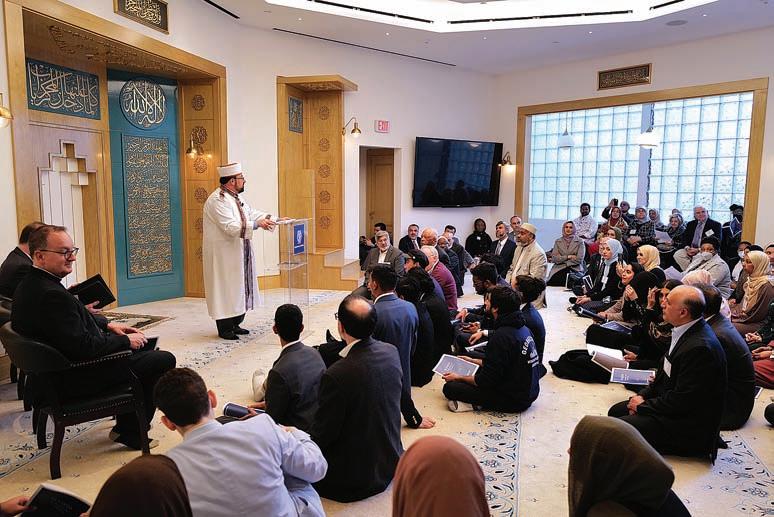
In his opening comments, Hendi reflected on his journey seeing the project through. The imam described the mosque as “a place to grow and communicate with God, with ourselves and with each other” and an environment to “learn the power of listening to one another and the power of learning from one another, in becoming better human beings in making peace and not war.”
The dust color of the mosque’s carpeting was chosen as a symbolic reminder “that we all come from dust and to dust we shall be returned,” Hendi explained. “We are sisters and brothers in dust. The destiny is the same.”
He also pointed out the room’s most dominant feature, a beautiful glass wall made of 102 individual blue framed panels. Ninety-nine of the panels contain gold calligraphy listing the names and attributes of God according to the Islamic tradition.
Georgetown President John J. DeGioia thanked Hendi for his continued commit-
ment and dedication to the spiritual enrichment of the university. “I wish to express our profound gratitude to all of the people who supported and contributed to the development of this new home for our Muslim community,” he said. “This is the next step in this journey to deepen the experience that we can provide our Muslim community.”
The dedication concluded with a dinner and reception in the nearby Rafik B. Hariri Building, where a proclamation by Washington, DC Mayor Muriel Bowser was read acknowledging the life of Yarrow Mamout
and the importance of the new mosque to campus life.
—Phil Pasquini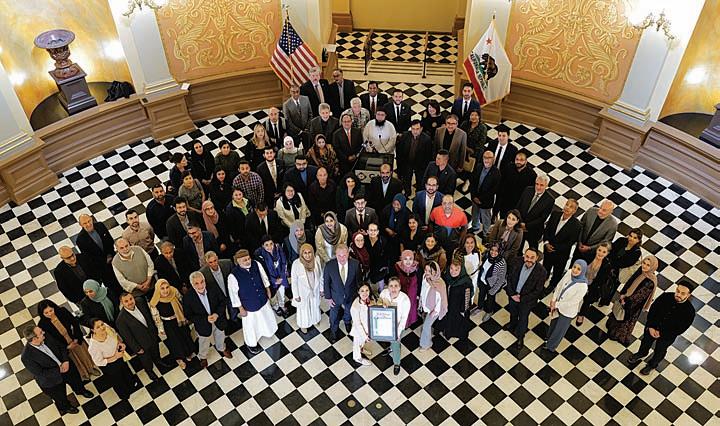
The Council on American-Islamic Relations, California Chapter (CAIR-CA) celebrated the holy month of Ramadan with its annual iftar—the meal after sunset that concludes the day-long Muslim fast— hosted by speaker of the California State Assembly Anthony Rendon (D-Lakewood), at the Sacramento State Capitol on April 10.
This 17th annual Ramadan iftar was the first held at the Capitol since 2019, when the COVID-19 pandemic prevented such in-person gatherings.
Omar Altamimi, CAIR-CA’s policy and advocacy coordinator, based out of the Sacramento Valley and Central California office, served as the evening’s emcee, welcoming 150 community members and guests gathered in the Capitol Rotunda beneath the building’s historic dome.
“We come together today to honor the values of compassion, unity and generosity that is at the heart of Ramadan,” Khydeeja Alam Javid, president of the CAIR Sacramento Valley/Central Valley (SV/CV) chapter, said.
The gathering in the Capitol, she observed, is a “wonderful opportunity to come together as one community to share in the blessings of Ramadan and to deepen our
bonds of friendship and cooperation. May this gathering be a source of inspiration, enlightenment and unity for us all.”
CAIR SV/CV executive director Basim Elkarra pointed out that history had recently been made with the election of Aisha Wahab (D-Hayward), the first Muslim-American California state senator, who is also the first Afghan-American woman elected to public office in the United States.
Elkarra also noted that Assemblymember Bill Essayli (R-Riverside) is the first Muslim in history to be elected to the California State Assembly.
“Our Muslim community is a vibrant and diverse community, with both Democrats and Republicans,” he said. “We all respect one another and work together to uplift and not just empower our community, but other communities as well.”
Rabbi Seth Castleman, director of the Exodus Project, mentioned the convergence this year of the Easter, Passover and Ramadan observances, which happens only once every 30 years. “All three traditions talk about renunciation, devotion and aligning one’s own will with the will of the divine,” he said.
State Senator Dave Cortese (D-San Jose) told the crowd that he believes Ramadan carries a universal message—for Muslims and non-Muslims alike. “Everyone can benefit from some time to reflect, recharge, get in touch with where that empty space in their heart may really be coming from and to connect with the things that matter most in life,” he stated.
Following the reception, guests enjoyed a fast-breaking dinner at CAIR’s Sacramento office and new art gallery.
—Elaine PasquiniOn March 17, the Foundation for Middle East Peace (FMEP) and the Middle East Institute (MEI) held a webinar for congressional staff to assess Congress’ actions vis-à-vis Israel and Palestine.
Josh Ruebner, the director of government relations at the Institute for Middle East Understanding (IMEU), noted that long-standing bipartisan support for Israel on Capitol Hill is “largely a function of domestic politics,” specifically the ability of special interest groups to fund election campaigns. For more than a century, there has existed an “active, well-organized, well-financed and very influential Zionist lobby” that has used carrots and sticks to ensure pro-Israel policies emerge from Congress, he noted.
Rebecca Abou-Chedid, a lawyer and FMEP board member, said many members of Congress just assume the Israel lobby represents the views of most Americans. “I cannot tell you how many times I have met with members of Congress who have told me, ‘I have never heard the other side, I’ve never been approached with this perspective before,’” she noted. This is especially true of members from rural districts who receive campaign checks from the lobby but don’t regularly hear from their constituents on the issue, she said. “All they hear is that it’s going to be good for you to sign this [pro-Israel] letter, or co-sign this resolution, and it’s going to be a big problem for you if you don’t,” so they take the path of least resistance and do as the lobby wishes. She ex-
plained that it’s hard to convince members who ran on domestic issues and have no personal or constituent link to Palestine to go out on a limb and jeopardize their career by critiquing Israel. “That’s a hard argument to make,” she conceded.
Yet, the vital role the U.S. plays in supporting Israel by sending it at least $3.8 billion in military aid a year means that American leaders can’t simply avoid the topic, Abou-Chedid insisted. “We are complicit in the occupation,” she said. “The occupation could not continue if we weren’t giving them billions a year without question.” At the very least, Washington should begin holding Israel to the same standard as other countries by making sure it does not use U.S. aid to commit human rights violations, she added.
While Israel is given blind military support, the comparably small amounts of U.S. humanitarian aid to Palestine often come with strings attached, are closely scrutinized and prone to being discontinued, Abou-Chedid noted. Leaders often treat aid as a “political treat that Palestinian advocates should be very happy to have received,” she lamented.
Despite these many issues, Ruebner believes the attitude toward Palestine is beginning to slowly improve on the Hill. The last Congress introduced “the boldest
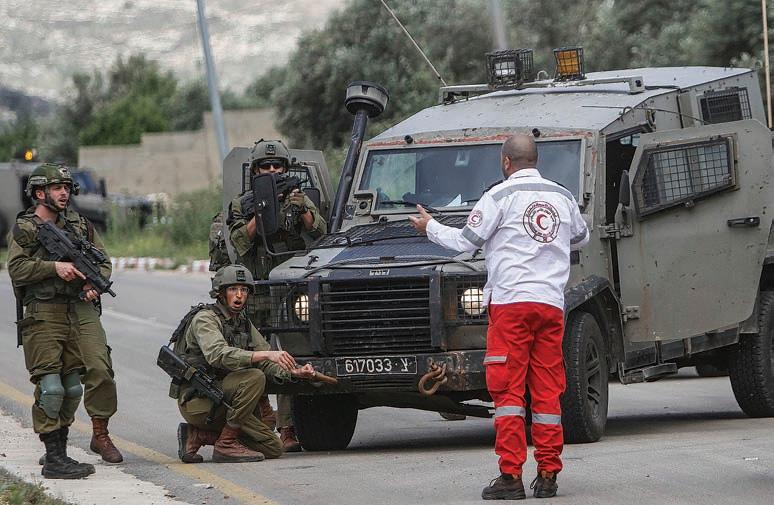
ever initiatives by Congress on Palestinian rights,” he said, citing Rep. Rashida Tlaib’s (D-MI) resolution recognizing the Nakba as just one example. “I think that this congressional resolution really broke some important new discursive ground in Congress,” he said. Ruebner also noted that members sent some “bold” letters to the president protesting Israel’s proposed inclusion in the Visa Waiver Program and describing the expulsion of Palestinians from their land as a war crime. He believes such efforts wisely place an emphasis on human rights rather than political processes. “I think situating these issues in their moral context, in their human rights context, is an extremely important development that’s taking place within Congress,” he said.
“Toothless” congressional initiatives, such as those that call for a two-state solution without recognizing or addressing Israel’s efforts to prevent such an outcome, must cease, Ruebner emphasized. “These types of initiatives are not only counterproductive, but they are harmful in the sense that they reify this outmoded paradigm and framework that is simply no longer workable, and it’s playing into the consolidation of Israel’s apartheid rule over the Palestinian people,” he said.
Hassan El-Tayyab, the Friends Committee on National Legislation’s director for Middle East policy, said the congressional response to journalist Shireen Abu Akleh’s killing by Israeli soldiers last year was a mixed bag. While rare bipartisan statements and initiatives critical of Israel were introduced, many failed to gain steam or produce serious outcomes. “Creating a political cost to Israel to make sure that this doesn’t happen again I think is really important,” he said. “Members really need to use all the leverage that they have to support accountability, because the status quo is just going to make things escalate more and we’re going to continue to see innocent people being killed in Palestine.” Beyond Abu Akleh’s case, he said Congress needs to seriously take up Israel’s detention of Palestinian children, the Gaza blockade, home demolitions, settler violence and the proposed annexation of the West Bank. —Dale Sprusansky
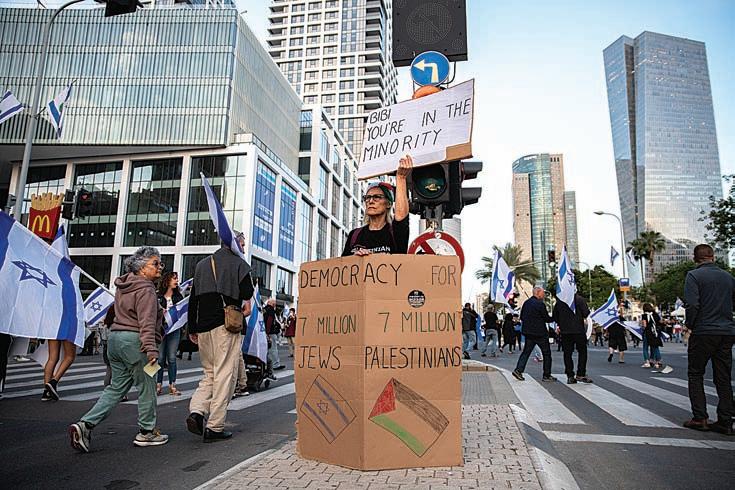
The Zionist Organization of America (ZOA), the Anti-Defamation League (ADL), the Foundation for Defense of Democracies (FDD) and Canary Mission are among the entities that deploy ever-evolving tactics to exert influence over U.S.-Israel relations. And yet, according to Grant F. Smith, director of the Institute for Research: Middle Eastern Policy (IRmep), many of these pro-Israel organizations “are not rep-
Over the years, the Israel lobby has been highly effective at dominating the political discourse by attacking its adversaries. Edward Ahmed Mitchell, national deputy director of the Council on American-Islamic Relations (CAIR), said that lobby groups “weaponize Islamophobia to target the Muslim community, to make sure it does not have the time, resources or attention to focus on reorienting U.S. foreign policy in a more just and humane direction.” He added, “Rather than debate us on
resentative of anybody but their donors and board of directors.”
Smith spoke at an April 16 online discussion hosted by Voices From the Holy Land (VFHL), which focused on the extent of the Israel lobby’s influence in the U.S. and how to counter its tactics. He noted that college campuses have become a major focus for the Israel lobby, as it seeks to suppress growing support among young people for Palestinian rights and the Boycott, Divestment and Sanctions (BDS) movement. These intimidation-based efforts have been largely unsuccessful, and so the lobby has turned to a “much more insidious and sophisticated” strategy of inserting “essentially Israeli government propaganda” into textbooks and educational materials, Smith noted. It has also built stealth political action committees (PACs) to exert greater influence over politicians.
the merits of the cause of Palestine, what these groups do is bog us down debating anti-Muslim bigotry.”
Mitchell noted that those fighting for Palestinian rights are also frequently smeared as anti-Jewish bigots. “Anti-Semitism is a real problem in our country, something we should all be fighting against,” he said. “It’s always sad to see organizations weaponize the issue and use it to try to silence organizations that are speaking up for the rights of all people.”
The organized Muslim community has debated whether to deprioritize Palestinian concerns as a means of reducing these sorts of attacks, but it has rejected that idea, Mitchell said. Instead, it has “realigned and reaffirmed its commitment to the cause of Palestinian freedom. And as a result, anti-Palestinian groups have reaffirmed their commitment to targeting us.”
How can the Israel lobby be countered? Smith noted that it has been very effective at the national level, but at the state and local level, it is “not powerful at all.” He pointed to the success of the Virginia Coalition for Human Rights in persuading local boards of supervisors to block permits for solar power company Energix, which does business in the occupied Palestinian territories.
Mitchell concurred with a locally focused strategy. He is happy to see activists building organizations to support elected officials “who are advancing justice in the political sphere.”
Speaking openly about Zionism with family and friends is also an important task for Palestine’s allies, stated Rebecca Vilkomerson, former executive director of Jewish Voice for Peace and facilitator of the discussion. “Having slightly uncomfortable conversations—or very uncomfortable conversations—I can’t emphasize enough how important it is to share the things that you’re learning in these conversations with the folks in your life.”
Vilkomerson also highlighted the #DroptheADL campaign, which draws attention to the ADL’s practices of attacking and even spying on Muslims and other minority groups. To date, more than 235 Jewish and other organizations have agreed to reject the ADL as a partner in their social justice work.
Serving as a springboard for the April 16 discussion was episode four of the Al Jazeera-produced documentary “The Lobby-USA.” In it, an undercover journalist poses as a pro-Israel volunteer and surreptitiously films conversations with a spokesman for The Israel Project (which has since ceased operations). The film significantly tarnished the Israel lobby by exposing a variety of its underhanded activities. Importantly, people can now acknowledge, without backlash, that there even is an Israel lobby, noted Mitchell. “No one can honestly dispute this anymore.”
VFHL uses documentary films as catalysts for in-depth Q&A panel discussions to raise awareness of issues of human rights and justice associated with Israel’s generations-long occupation over the Palestinian
people. The Washington Report on Middle East Affairs and American Muslims for Palestine cosponsored the event.
— Catherine Baker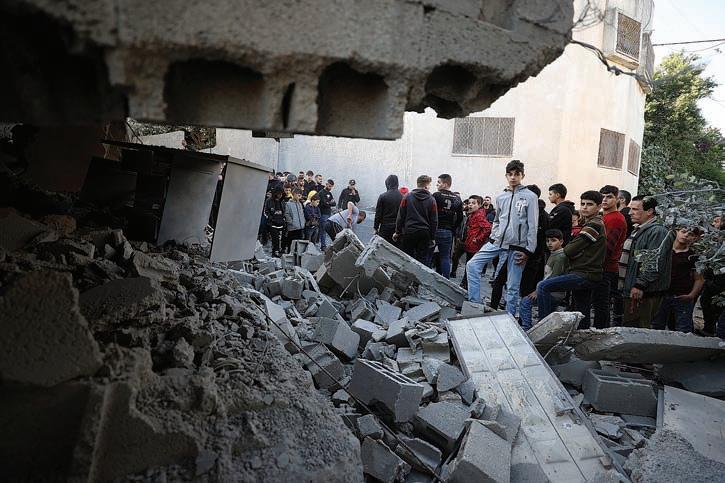
In the third part of the “Learning and Unlearning Palestine” webinar series hosted by the Foundation for Middle East Peace and Al-Shabaka: The Palestinian Policy
The framework of peacebuilding is a façade that shields Israel from accountability, she argued. Calling on Palestinians to dialogue with Israel “makes the international community feel good about themselves,” Razek interjected, “while not changing the structural system and injustice that [Palestinians] live under.”
Hawari also denounced the “peace narrative,” stating that it “creates a false parallel between the structural oppression of
Network, panelists explored how “dialogue” and “peace” discourses undermine Palestinian liberation. The Feb. 27 webinar included Inès Abdel Razek, executive director of the Palestine Institute for Public Diplomacy; Yara Hawari, senior analyst at Al-Shabaka; and Maha Nassar, associate professor at the University of Arizona.
The panelists discussed the distinction between the “justice narrative”—which reflects Palestinians’ experience of violent settler colonialism—and the “peace narrative” pushed by Israel and its Western supporters.
The Oslo accords, Nassar stated, marked the shift to the “peace” discourse in Israel and the international community, evidenced by the multitude of international NGOs that “support dialogue-based projects between Israelis and Palestinians.”
Israeli occupiers and the resistance of the Palestinians.” Attributing equal agency to the two sides “is violence itself,” Razek asserted, as it precludes redress, restitution or justice by implying that “the colonized people should stop resisting” and talk to their unapologetic oppressor.
The webinar series culminated in its fourth installment on March 8. Panelists discussed what allyship and solidarity with Palestinian liberation looks like beyond “peacemaking” and “dialogue” discourses.
Saleh Hijazi, Africa Campaigner at the National Committee for BDS, said the solidarity movement helps fight the public relations battle in the West by providing “a lifeline” of support in the face of relentless Zionist propaganda that regularly ignores or discounts Palestinian voices. “The major struggle is over the narrative,” he said.
Al-Shabaka’s U.S. policy fellow Tariq Kenney-Shawa noted that “Palestinians often find themselves being drowned out of conversations” by dominant pro-Israel voices. The sad reality is that facts shared by Palestinians often only get taken seriously when they are restated by allies in the West, he said.
However, the Palestinian solidarity movement actively resists this erasure. Nadya Tannous, a member of the Palestinian Youth Movement in the Bay Area, affirmed that Palestinians “are experts and protagonists in our own struggle.” She encouraged allies in the West to cite Palestinians in discussions, rather than defaulting to “safer,” often white or Jewish, sources that merely regurgitate Palestinian analysis.
Another vital component of the solidarity movement is uniting physically isolated Palestinians. “Oslo solidified our geographic, political and economic fragmentation,” Tannous noted. This fragmentation, Hijazi said, “is the most devastating tool being used against us….We are spread out geographically and we are not allowed to be connected.” But the solidarity movement resists this by anchoring the Palestinian people to their land.
At the conclusion of the webinar, panelists reaffirmed the importance of intersectionality in Palestinian liberation. The strength of the solidarity movement’s work is in “building a cohesive political framework and supporting each other’s political demands for self-determination,” Tannous asserted. This means acknowledging complicity in living in occupied indigenous land in the U.S. and connecting to other liberation movements to form a united front against all oppression.
The first two sessions of the “Learning and Unlearning Palestine” series were covered on p. 55 of the Washington Report’s May issue.—Priya Aravindhan
Palestine Deep Dive (PDD) held an event titled “Against Erasure: Why Palestinian Voices Must Finally Take Center Stage” at the Frontline Club in London on April 24.
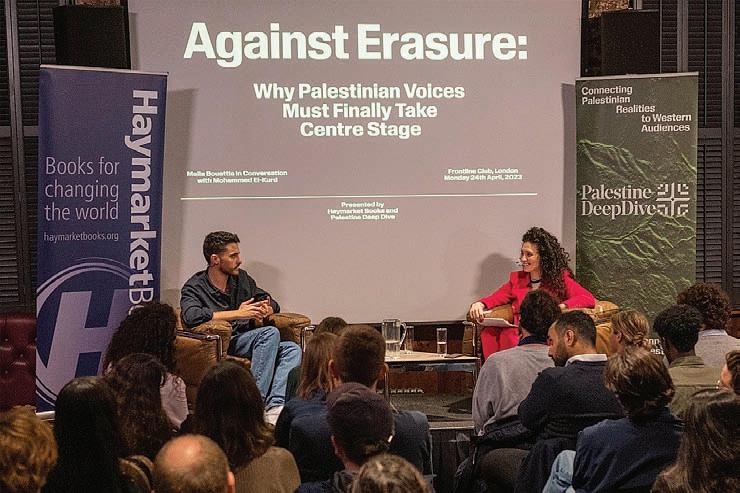
Held in collaboration with Haymarket Books, the program featured Palestinian poet, journalist and organizer Mohammed El-Kurd in conversation with Malia Bouattia, the opinion editor of The New Arab Delivered to an audience of journalists and campaigners, the discussion explored the pressing need for a media landscape which no longer marginalizes and excludes Palestinians, but centers their voices, experiences and agency.
Preceding the talk, PDD’s associate director Omar Aziz drew attention to how media companies, politicians and even leftwing commentators in Britain have silenced Palestinians. “It has been us, Western journalists, academics and so-called experts who have been complicit in the systematic marginalizing, sidelining and outright silencing of Palestinians for decades,” he said.
He noted the relative ease with which independent media platforms use technology to connect Palestinian voices on the ground with Western audiences. “So what excuse does a multimillion-pound international news station have, with teams of correspondents, producers and editors, not to be able to do the same?” he asked.
Opening up the conversation, Bouattia asked El-Kurd about the rationale behind his uncompromising approach to interviews with the mainstream media. “When
you turn the question on its head, when you correct the presenter, you are changing the power dynamic in the interview itself,” he replied. “You are having the observer, the viewer, question the integrity of that media platform and thus give you more authority on the subject.”
Asked whether there is much to learn from the approach of pro-Israel media platforms and media watch groups, El-Kurd responded: “Yes. We have the truth on our side, but the truth is not enough. Those of us who are advocates, who go on TV, must acquire a certain kind of political education, must know what the hell they’re talking about before we go on TV. It is not enough to be just a subject of violence, it’s not enough to just have the bruises. You must also be able to be compelling.”
Bouattia asked whether El-Kurd feels journalists working for mainstream outlets can do more to exert pressure on their editors to report the truth. “Yes,” he responded. “People should be a lot more bold and a lot more courageous. I say this from just engaging with journalists who work at the New York Times and who work at the Washington Post who have their hearts in the right place and they have the right sentiment and they even know the facts…Then when their editor changes something in their piece, they just go, ‘Oh, [crap],’ and they drink a cocktail and go
home. They don’t push back against their editors. It’s quite cowardly. If we are serious about this, then we must run the risk of sacrifice. Across history, any opposition to any injustice has not been met with applause initially.”
El-Kurd emphasized that while leftist media platforms can be ideal spaces for young Palestinians to gain media experience, the platforms themselves still often retain problematic positions on Palestine: “I think certainly they are and they could be training spaces, but even observing the UK or the United States, these so-called leftists or progressive media outlets oftentimes do not even have a principled stance on Palestine. They often engage in this qualification policy, where they can only speak about Palestine if they spent 15 minutes denouncing all kinds of bigotry and racism as if Palestine is inherently tied to a certain bigotry….Maybe I’m too cynical, but there’s lots of work to be done.”
Rounding off the conversation, El-Kurd called on journalists to simply do their jobs: “We’re not asking them to do us any favors. We’re asking them to do their jobs. When you are writing an article about a raid on alAqsa Mosque and the first quote you start with and the last quote you end with is from the Israeli police, you are not a journalist, you’re a stenographer. When you are writing an essay about forced expulsions in Sheikh Jarrah and the only people you’re referencing are from the Israeli Ministry of Foreign Affairs, you’re not a journalist, you’re a state secretary.”
—Palestine Deep Dive Staff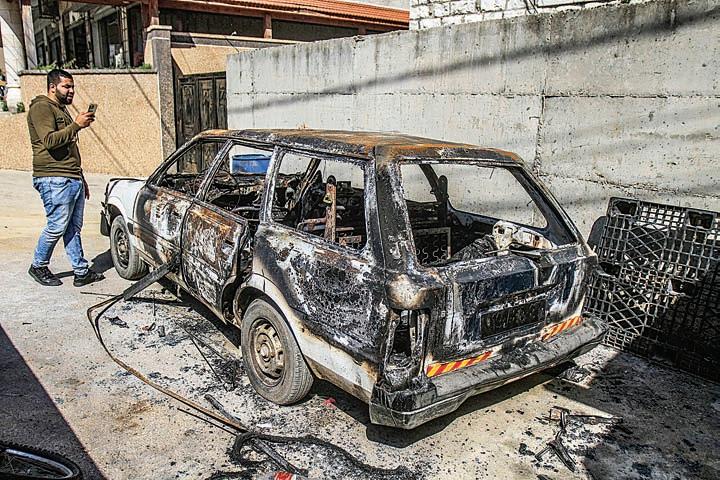
Wadie Said, a professor at the University of South Carolina School of Law, gave a lecture on “Palestine and American Law” at Brown University’s Watson Institute for International and Public Affairs in Providence, RI on April 5. A member of the legal team that defended University of South Florida professor Sami Al-Arian and others against charges of supporting Palestinian Islamic Jihad in 2003, Said believes U.S. laws have long disproportionally targeted Palestinians.
The fact that the U.S. does not recognize Palestine as a state makes Palestinians more vulnerable to anti-terrorism laws, which tend to focus on non-state actors, he noted. “Entities and individuals that purport to act on [Palestine’s] behalf are not entitled to any type of sovereign immunity or protection, like officials of other foreign governments normally enjoy,” Said explained. This issue is compounded by the fact that anti-terrorism laws don’t recognize the actions of Palestinians as taking place within the context of an anti-colonial land struggle against Zionism, he added. As such, Palestinian resistance groups make up roughly 10 percent of the organizations on the State Department’s list of Foreign Terrorist Organizations (FTO). The fact that more than 70 percent of the groups on the list are Islamic is proof the U.S. also disproportionately targets Muslims, Said believes.
The designation of terrorist organizations is inherently political, Said noted, as groups acting in the perceived interests of the U.S. or its allies are much less likely to be placed on the FTO list by the Secretary of State, regardless of their actions. As one example, he noted that Kahane Chai, a violently anti-Arab political party founded by Rabbi Meir Kahane, was removed from the FTO list in 2022 under the premise that it had
stopped operating, even though individuals sympathetic to the group hold important positions in the current Israeli government. Said believes the U.S. also selectively prosecutes those accused of terrorist ties. “This is double selectivity,” he said. “There’s selectivity on who gets on the [FTO] list, and then there’s selectivity on who [on the list] gets prosecuted.” Lawyers have little ability to argue that a client alleged to be affiliated with an FTO-listed group has been unfairly targeted compared to members of other FTO-listed groups. “I can’t tell the FBI who to prosecute, I can’t tell them when they should be bringing an indictment,” he said.
Perhaps the ultimate example of this is the case of the Holy Land Five, in which five Palestinian Americans received sentences of up to 65 years in prison based on dubious evidence that the humanitarian assistance they sent to Palestine materially supported Hamas. Said compared their punishment to those charged with sending actual weapons to Northern Ireland to fight the British in the 1980s. In those cases, the defendants were either acquitted by sympathetic juries or only given sentences of up to seven years in jail. “It shows you that double standards and selectivity are an issue in this context,” he said.
Said concluded by noting that most antiPalestinian legal efforts today are focused on the non-violent boycott movement. This shift perhaps proves that no form of Palestinian activism, be it grounded in militancy or pacifism, will be tolerated by those who use the law to target and suppress the Palestinian struggle. —Dale
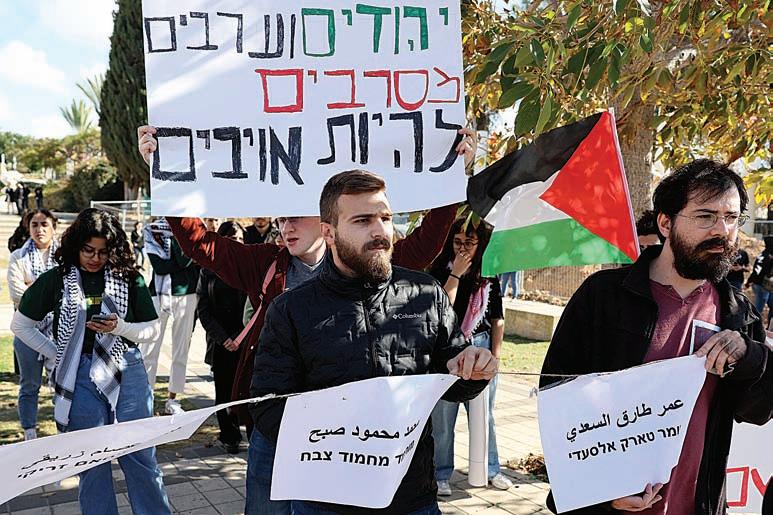
On March 14, the Galilee Foundation hosted a webinar outlining the obstacles Palestinian students face at Israeli universities. Dr. Khalil Jahshan, a trustee of the Galilee Foundation and executive director of the Arab Center Washington DC, moderated the discussion.
Mohanad Mustafa, a senior lecturer at Beit Berl College, said a primary obstacle Palestinian students face during their university studies is the language barrier. Although the number of Palestinian students attending an institution of higher education in Israel has increased, Arabic has little representation in the Israeli academic world. With few opportunities for students to express themselves or explore academic literature in their native tongue, Palestinians inherently face academic and social barriers, he said.
In addition, Mustafa pointed to studies showing that Arab students face various forms of exclusion by universities and are subjected to a curriculum that extols Zionist hegemony and exclusivity. It’s also not uncommon for Palestinian students and staff to face hostile pushback if they voice strong objections to Israeli policies. Meanwhile, fields of study relating to Palestinian culture and history are often omitted from the curriculum, he noted.
Moreover, he pointed out that while state grants and scholarships for Israeli institutions are technically available to Palestinian students, in many cases they require the completion of military service. The vast majority of Israel’s Palestinian citizens do not enlist in the army.
Sarab Abu-Rabia-Queder, an associate professor at the School of Education at the Ben-Gurion University of the Negev, noted that Palestinian Israelis
often come from a subpar educational background compared to Israeli Jews, due to the state underfunding education in minority communities.
A 2006 study by Human Rights Watch cited by Jahshan succinctly summarizes the systemic inequalities facing Palestinians in Israeli education. “Palestinian Arab citizens of Israel make up nearly onequarter of Israel’s schoolchildren, yet Palestinian Arab children receive an education that is inferior in nearly every respect when compared to Jewish children,” the human rights organization notes. “Palestinian Arab citizen’s schools are more crowded with fewer teachers per child and in worse physical condition….Palestinian Arab schoolchildren get fewer enrichment and remedial programs and special education services than Jewish children receive. Many communities have no kindergartens. Palestinian Arabs experience discrimination at every level of the education system. As a result, they are three times as likely to drop out than Jewish children and rarely make it to university.”
Abu-Rabia-Queder also highlighted the digital gap that presents a disadvantage to Palestinian students: while 70 percent of Jewish families have an internet connec-
tion, only 43 percent of Palestinians homes have internet access.
Abu-Rabia-Queder said her goal is create a greater sense of harmony on campuses. “We’re not only trying to eliminate discrimination, but also to create a shared life…Our aim isn’t to solve the Israel-Palestine conflict. We aim to get Jewish and Arab students in the same institutional academic sphere to know each other and not be afraid of each other. It’s a long process. Still, it’s something that we must do to create an inclusive environment.”
Ayman Agbaria, an associate professor at the University of Haifa, spoke about the tiny percentage of Arab faculty in Israeli universities. “Yes, we have two vice presidents, but that is three to four percent of the faculty,” he said. This disparity makes it challenging for Palestinian students to find mentors to supervise and guide their work.
“Many of our colleagues are Jewish Israelis” and don’t have intimate knowledge of the Palestinian minority, Agbaria noted. The dearth of Palestinian professors results in “notions of orientalism” and “really generalistic ways of talking about the Arab population” in the classroom, he added.
—Aseel AbukwaikOn Tax Day, April 18, 14 activists wearing T-shirts emblazoned with “75 Years of Israeli War Crimes” chained themselves to the building housing the Israeli Consulate in San Francisco, CA. Organizers said the
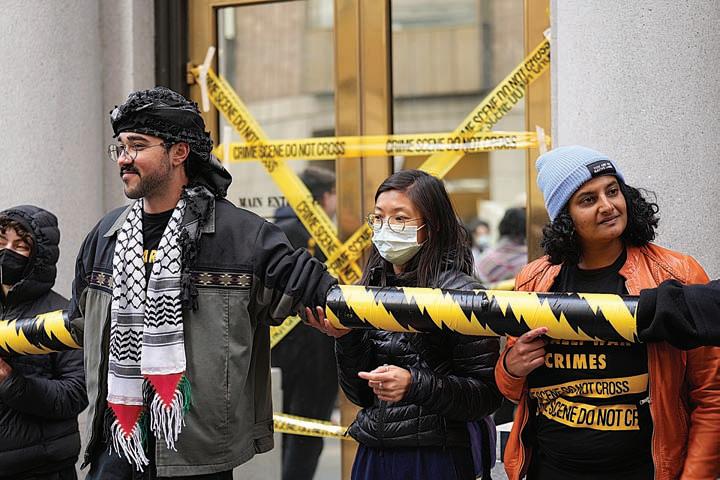
Attendees highlighted that California’s contribution to this largesse is in the hundreds of millions of dollars, which they believe should be spent at home on public housing, low-cost healthcare, education and other under-funded public services. Addressing several hundred supporters, speakers at the rally declared that they will
not let you continue with business as usual if you will not let us live our lives in our homeland,” promising that the group will return to block the building until Israel stops oppressing the Palestinian people.
Phil PasquiniLaila Mokhiber, national committee director of communications, welcomed guests to UNRWA USA’s fundraising iftar at the Qatar America Institute for Culture (QAIC) in Washington, DC on April 8. She thanked Fatima Al-Dosari, QAIC’s executive director, for cohosting. Mokhiber and Hani Almadhoun, director of philanthropy at UNRWA USA, focused on stories of hope as Palestinians in refugee camps harness their intense drive to succeed and improve their lives.
human chain achieved its desired effect of closing the consulate and obstructing access to other offices in the building for the afternoon.
One participant, Monadel Herzallah, reported being verbally accosted by an irate Israeli who was locked out of the consulate. The man told him, “This is inconvenient, you are not letting us in, you are not letting us out.” Herzallah responded by asking, “How convenient do you think it is for the Israeli army to disrupt Palestinians from sleeping at 4:00 in the morning by carrying out raids? How convenient is it for people to pray in mosques and be disrupted and taken to jail?”
The “No Tax Dollars for Ethnic Cleansing of Palestinians” rally took place while many Americans were busy rushing to pay their federal income taxes before the midnight deadline. Speakers at the rally pointed out that Israel receives at least $3.8 billion in annual support from Washington and is historically the largest recipient of U.S. foreign assistance.
not stand “idly by while settler colonialism and apartheid are funded by the American government.” Speaking directly to the consulate through an amplified sound system,
Palestinian Canadian Sana Saeed, host and senior producer with AJ+, a social media publisher owned by Al Jazeera Media Network, marveled how every morning Palestinians get up and push for sacred resistance amid a deepening economic crisis and military assaults. We may not be able to fix all the challenges they face but we can take care of them as they resist their way to tomorrow, she concluded.
Laila Al-Arian, the Palestinian American
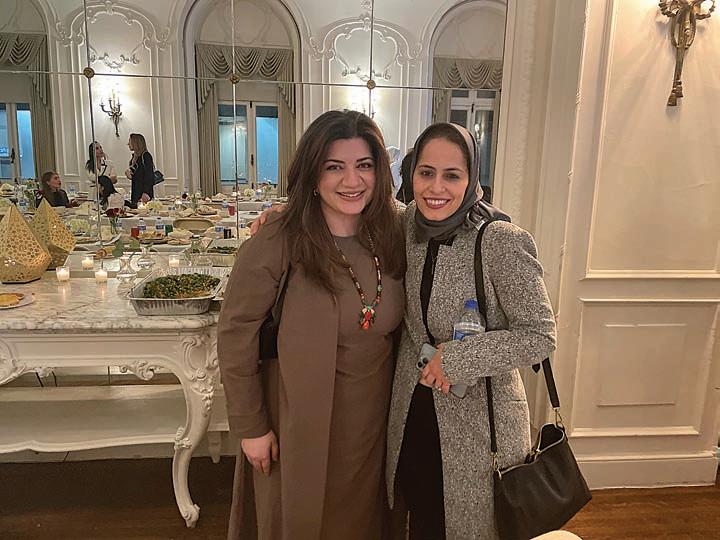
umentary program on Al Jazeera English, talked about her film, “The Killing of Shireen Abu Akleh,” which won the prestigious George Polk Award. The film details the killing of the renowned Al Jazeera Arabic correspondent by Israeli forces in Jenin on May 11, 2022.
Abu Akleh was brave and cautious and predicted her own killing. They don’t want you there so they target you, she told her viewers. Abu Akleh was wearing a helmet and a bulletproof vest, with “press” clearly written on it, when she was shot.
Israel followed a familiar script after her shooting. They controled the narrative, denying culpability and blaming Palestinians. Those initial lies stuck and were repeated by the media. After Israel investigated itself, no one was ever held accountable, including the unnamed sharpshooter.
Al-Arian urged the U.S. government not merely to express concern when Israeli forces kill American citizens, including Abu Akleh, Omar Assad and Rachel Corrie. After months of pressure by Abu Akleh’s family, the FBI began an inquiry into the killing but Israel refused to cooperate. Time and time again the U.S. gives Israel a pass to kill its citizens. Edward Said once advised to never forget the legitimacy and justice of your cause, Al-Arian noted. She and Al Jazeera have pledged to Abu Akleh’s family that they will continue to seek justice.
To watch Al Jazeera’s “The Killing of Shireen Abu Akleh” in its entirety, visit <youtube.com/watch?v=SXy9SUDqUHk>.
—Delinda C. HanleyAnera (formerly American Near East Refugee Aid) held interfaith Ramadan iftars in Washington, DC and the San Francisco Bay Area on April 11, to raise funds for food package and voucher distributions to Palestinians. DC’s evening, at the newly renovated Patterson Mansion in Dupont Circle, featured beautiful poetry by Palestinian American Zeina Azzam, the Poet Laureate of the City of Alexandria, VA. She read poetry from her upcoming book Some Things Never Leave You, accompanied by oud player Laith Al Attar.
Anera’s president Sean Carroll updated the packed room on the organization’s Ramadan food distribution programs in Palestine, Lebanon and Jordan. For the first time, Anera supported 200 vulnerable families in East Jerusalem this year. Anera board member Samar Hussein Langhorne gave an inspiring speech about the need for Americans to step up, speak out and help Palestinians who are facing increasing hostility from both the government of Israel and settlers.
ever, she makes clear from the first display that “Tatreez Inheritance” is not an exhibition that teaches the styles of Palestinian embroidery, but instead each piece—its style and stitches—represents a time and place in the history of Palestinian art and of its people.
Displayed through a diasporic lens, the exhibit weaves culture and art history into the Palestinian history of displacement, dispersion and the reclamation and preservation of the nation’s identity. It challenges the visitor to see the thobes (dresses) and other pieces through the lens of their journey from Palestine to Europe and the United States.
Delinda C. HanleyThe night of music, poetry and philanthropy raised $16,000. More than 450 people across the country raised nearly $190,000 for families facing food insecurity during Ramadan.—
A new exhibit, “Tatreez Inheritance: Preserving Palestinian Cultural Heritage in 75 Years of Exile” at the Museum of the Palestinian People in Washington, DC, had its inaugural tour by the curator, Wafa Ghnaim, on March 31.
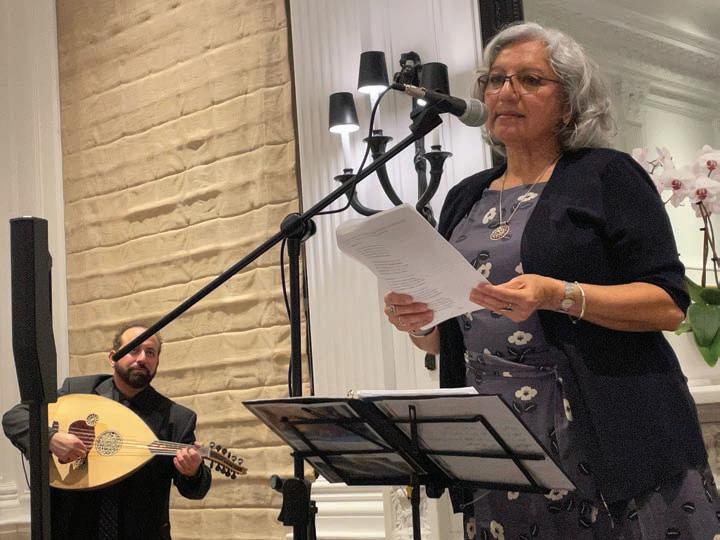
After publishing Tatreez & Tea: Embroidery and Storytelling in the Palestinian Diaspora in 2018, Ghnaim began teaching courses in Palestinian embroidery. How-
Ghnaim says, “Over the past 75 years, the dispossession, displacement and dispersion of the Palestinian people to every country on earth ensured that Palestinian embroidery traditions were not lost. This preservation work guaranteed resources for museums and collectors to properly identify Palestinian dresses as Palestinian….In some cases, the thobe has been returned to the Palestinian community, such as those presented in ‘Tatreez Inheritance.’”
The thobes are breathtaking in their color, art and skill and are accompanied with photos and historical notations from pre-1948 through the present, representing the stories of the “unknown” creators.
Through this unique diasporic view, the visitor is asked to not just look at the beauty and skill but to look deeper into the creation of the garment and its stitches— not just as remnants of the past—but as part of an ongoing story.
As Ghnaim points out, “When the exhibition is read from start to finish [pre-1948 to post-1948], ‘Tatreez Inheritance’ shares how the dresses specifically reflect a Palestinian woman by the way the dress was sized specifically to her and embroidered for a particular occasion. Each dress is a portrait of a Palestinian woman and her life. Tatreez is passed from mother to daughter and is culturally viewed as a sacred art form that reflects indigeneity to historic Palestine, as well as the lived experience of the embroiderer and her family.”
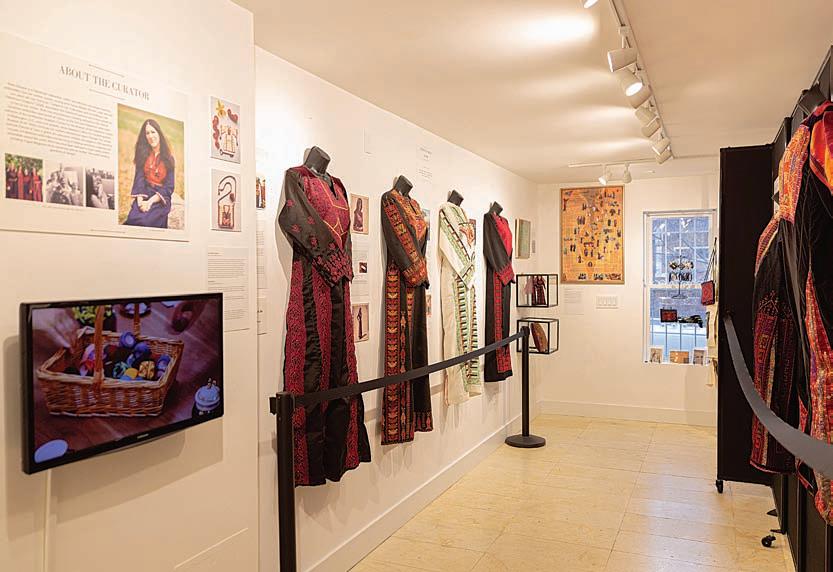
outlining the apartheid nature of Israel. However, in official circles of Western power, very few—including those who generally accept the conclusions of prominent human rights organizations—have accepted the apartheid label for Israel.
At an April 11 book launch hosted by George Washington University in Washington, DC, scholars with close connections to U.S. policymakers said the refusal to acknowledge Israeli apartheid has much more to do with politics than ignorance or delusion.
Marc Lynch, a professor at the school and a co-editor of the newly-released The One State Reality: What Is Israel/Palestine?, said the majority of official Washington knows the two-state solution is all but dead and that apartheid exists in its wake. “They all know these things, but they don’t act on them for various reasons, because of political considerations, because of structural constraints,” he said. Leaders “are not unaware of the one-state reality. It’s more the sense of paralysis and impossibility of finding anything else. Hence, the clinging to the possibility of a two-state solution in order to avoid having to come up with something different.”
University of Maryland professor Shibley Telhami, also an editor of The One State Reality, concurred. “Policymakers are not as detached as we assume they are,” he said. “I know a number of high-level people in government who have said that it’s too late for two states, yet they’re advocating for two states in public. They’re not going to take that on, they’re not going to change the paradigm, it’s too costly, it’s not a high priority issue.”
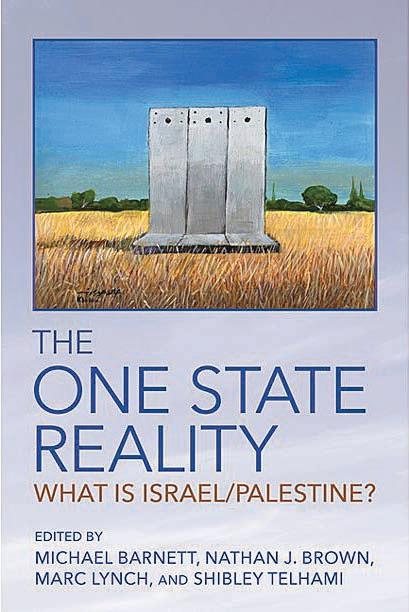
The exhibit is on view at the Museum of the Palestinian People from March 31 to September 23. —Julia
For decades, Palestinians have been telling the world about the apartheid polices of the Israeli government. In recent years, Western human rights groups have finally taken notice and issued a slew of reports
Fellow editor Michael Barnett, a professor at George Washington University, argued that the de facto reality of Israeli apartheid is rather obvious, even if it’s not “an exact analogy” to apartheid South Africa. “Call it something else if you want, but acknowledge that whatever you call it, it has to [recognize] practices of discrimination by Jews against non-Jews,” he said. “There are just two classes of people in [the land between the Mediterranean Sea and the Jordan River]. There are Jewish Israelis, and then there’s everybody else. And if you have any doubt about it, look at the Basic Law from a few years ago, and look at the slew of bills that are coming down the pike in the Knesset.”
He continued: “Israel is a state that is built for, by and about Israeli Jews, that’s what it’s about. It’s about Jewish supremacy. That’s a hard word to actually evoke. But I don’t think there’s any way around it. This was a state that was intended to be for Jews and if it’s going to be a Jewish state then there are going to be those who are not full members.”
Co-editor Nathan Brown, a professor at George Washington University, noted that Israeli policies have long reflected the onestate status quo, while Palestinian voices have incorporated this reality into their thinking. “The entrenched reality of one state is something that the actors understand,” he said. “When I hear Palestinian political discussions, it’s not ‘What kind of state do we want?’ but ‘What kind of strategy do we adopt?’”
When John Mearsheimer and Stephen Walt published their exposé on the Israel lobby in the London Review of Books in 2006, they were actively attacked by proIsrael forces and became the focus of much media and academic scrutiny. Signaling the growing acceptance of criticism of Israel, Lynch noted there has not been much pushback to The One State Reality
“It’s been quite interesting to see the response,” Lynch said. “We all anticipated quite a bit of fireworks. In fact, that really hasn’t happened, because everyone now pretty much agrees with us.” He added that he is fascinated by the academic world’s “very sudden and rapid intellectual discursive change” regarding Israel in recent years.
As for the implications of the growing acceptance of the one-state apartheid reality, the editors had mixed opinions. “Injustice can survive a tremendously long time,” Lynch said. “Once the initial impact of the
apartheid label sinks in, politics moves on, nothing necessarily changes. People can live with an extraordinary amount of hypocrisy and evil in their lives, as long as it does not inconvenience them.”
Barnett disagreed. “You just can’t go on as normal once you say that it’s apartheid,” he argued. “I think we learned that with South Africa. As a consequence, things are going to change globally.”
—Dale SprusanskyContinued from page 34
young people want to spend Friday nights during Ramadan inside the holy mosque. That’s their right, certainly in the last place on earth in which Palestinians still have remnants of sovereignty.
Beating them in such a way isn’t wanting quiet, but rather death. Killing an Israeli medical student from the Bedouin town of Hura at a gate to the mosque compound and later providing a ridiculous version of the circumstances and not disclosing even a shadow of the truth is also a means of provocation. Not wanting quiet is permitting hundreds of rioting settlers to invade a Palestinian town time after time, permitting them to engage in arson and destruction and assault at their whim, within sight of Israel Defense Forces soldiers who never thought to do their duty and protect the Palestinians. Not bringing any of the rioters to justice is also a way of preventing quiet at any price.
A country that doesn’t want quiet slowly bleeds those under its occupation. There has barely been a week in recent months without unbearable Palestinian fatalities and then everyone acts surprised, wondering what these human animals are doing to us, carrying out a car ramming attack in Tel Aviv and a shooting in the Jordan Valley.
Not wanting quiet is dispatching crazy numbers of troops after each terrorist attack to the Palestinian refugee camps and towns and turning the residents’ lives upside down for an extended time, demolishing the homes of terrorists’ families and arresting thousands of people. De-
taining 1,000 people for long months without trial is also a proven way to achieve a lack of quiet, which Israel has also accomplished.
Imprisoning the Gaza Strip forever, bombing Syria without limits and cruelly subjugating the Palestinians. What else does warmongering require?
The motives change but the goal always remains. Now it’s the extreme right that is bloodthirsty in the government and that is in ecstasy every time Palestinian blood is spilled, hoping in the process to achieve Gog and Magog, followed by the hoped-for second Nakba.
And along with them there is the pro-Bibi right that wants to crush the protest movement, which could only be wiped out by another round of bloodletting. And later we could always say it was the Arabs. ■
(Advertisement)


All books featured in this section are available from Middle East Books and More, the nation’s preeminent bookstore on the Middle East and U.S. foreign policy. www.MiddleEastBooks.com • (202) 939-6050 ext. 1101
Reviewed by Ida Audeh
Stranger in My Own Land tells the story of Palestine since 1948 through two generations of one family. The author’s maternal and paternal families were among the minority who remained in Israel after the Nakba, and they soon realized that the new triumphalist Jewish state desired to strip them of any hope of shaping their own destinies as Palestinians. The author’s parents made the difficult and unpopular decision to emigrate in 1970, leaving for Lebanon to work in a PLO-affiliated research institute. Israel’s invasion of Lebanon in 1982 and its aftermath forced the shattered family to move to Cyprus to start over yet again. Twelve years later, the family was among very few with roots in what became Israel who were allowed to return to their villages, on the coattails of the Oslo Accords. The narrative ends in 2022, with the author still struggling to find her way in Palestine.
This tour de force—part family history, part memoir—was ten years in the making, copiously researched through published sources and extensive family interviews. The author clearly writes for an audience with little familiarity with Palestinian history. She deftly gives as much historical context as readers need to understand events and policies (for example, the Zionist plans to depopulate Palestine and the laws govern-
ing land appropriation) and then switches back to her family members and friends to depict the lived experience. The result is a comprehensive portrayal of living as members of an unwanted population in a settler colonial structure that desires their permanent marginalization.
Author Fida Jiryis is the daughter of Sabri Jiryis, whose 1966 book, The Arabs in Israel, used Israeli sources to document the network of laws, military orders and courts that Israel used to suppress Palestinian citizens. (Palestinians in Israel lived under military rule between 1948 and the end of 1966, a system that Israel would resurrect in the territories it occupied in June 1967.) The first third of the book shows the human cost of such a system as well as the resilience of the indigenous minority. The author relates the early stages of political organizing by her father and his friends in the 1950s and the effort to bring international attention to their plight. (They sent dozens of letters to the U.N. through various routes to ensure that at least one eluded the military censors and reached its destination. The strategy worked.)

In the Arab world, the 1967 defeat was a
staggering blow, but for Palestinians in Israel, it allowed them to visit parts of Palestine previously controlled by Jordan and Egypt that had been off limits. This provided an opportunity to meet other Palestinians, from whom they’d been separated for decades. Palestinian refugees live with memories of the homes they were expelled from, but Jiryis makes us wonder about the experience of Palestinians who remained, or who live within range of depopulated villages, and recall a time when they hummed with life and were interconnected.
In the last third of the book, the 22-yearold Jiryis and her family return to Fassouta, their village in the north, and the story is firmly hers: she explores what it means to reclaim a home that had always seemed the stuff of fantasy. We see it through her eyes as she struggles to find a job (most require proof of military service), to rent an apartment, even to shop in a mall without harassment. When she finally gets a wellpaying job, she has to endure frosty coworkers who ignore her and who support bombing a Palestinian area—and no one, not even a friendly coworker, finds the call for genocide objectionable. She realizes that she will always be reminded of her status when she interacts with Israelis: “It was not possible to live for even one day without being reminded that we were us and they were them—and that we may never be accepted as equal to them.” If living in Israel is difficult, living in Ramallah (where Jiryis relocated, hoping to more fully reconnect with her heritage) is even more so—she lives under military rule, her movement constrained, her water rationed, the apartheid wall ever present.
This memoir delves deeply into the experience of a nation that has had to find ways to survive a military juggernaut determined to erase it—in historic Palestine, in Lebanon, and even further afield. (The book includes photos of more than four dozen Palestinian diplomats and political figures assassinated by Israel around the world.) Beautifully written by a Palestinian woman who is eager to find her home in a state that has cost her family so much, this book eloquently conveys the urgency of transforming the toxic status quo into conditions that allow everyone to thrive as equals.
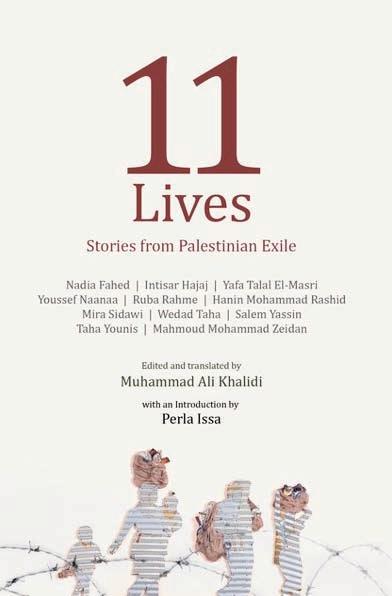 Edited and translated by Muhammad Ali Khalidi, OR Books, 2022, paperback, 247 pp.
Edited and translated by Muhammad Ali Khalidi, OR Books, 2022, paperback, 247 pp.
MEB $22.95
Reviewed by Alex BustosThe relationship that each author has to Palestine—as both a real place and an imagined homeland—runs through all of the book’s chapters. Contributors’ accounts of growing up in refugee camps and being raised on stories about Palestine from their parents and grandparents reveal how oral history keeps their heritage alive, while also reinforcing feelings of despair and displacement. Thus, the reader learns how maintaining a connection to their homeland is both a source of pride and hope but also one of loss, frustration and heartbreak for Palestinian refugees. This is seen most tragically in the passing of elderly relatives who died in exile, never able to return.
Instead of simply retelling the history of Palestine and the dispossession of its people, each author in this edited volume brings unique insight into their own lives and those of the people around them. While some do ground their experiences within the context of political upheaval, others tell stories of family, childhood, coming of age and loss as they navigate the daily hardships of life.
They also challenge the stereotyped view of refugees as being passive victims, as each author through humor, sadness, anger, joy and frustration demonstrates the resilience and strength of ordinary people in the face of significant obstacles.
With the signing of the Oslo Accords between Israel and the PLO in 1993, the main site of the Palestinian struggle shifted away from refugee camps in the surrounding countries and back to the area of “Historic Palestine,” namely Israel and the occupied West Bank and Gaza Strip. While celebrated as a triumph by its supporters, critics argued that Olso, among other things, abandoned Palestinian refugees who still resided in camps by the hundreds of thousands. Since then, the plight of Palestinian refugees has seemingly remained on the backburner, despite worsening living conditions in the refugee camps caused by the Syrian civil war and Lebanon’s economic collapse.
11 Lives: Stories from Palestinian Exile is therefore a welcome contribution. Edited by Muhammad Ali Khalidi, this work is an anthology by 11 Palestinian refugees of different ages, backgrounds and professions. What links them all is their shared identity as Palestinians forced to build their lives outside of their country. While most of the chapters take place within different locations around Lebanon, the stories also follow the authors’ own journeys to places as far flung as Canada, Turkey, Syria and Palestine itself.
The power of 11 Lives comes from the fact that these testimonies are told by the refugees themselves. Many books have appeared over the years about Palestinian refugees, but these have usually been written by non-Palestinian authors, and in the third person. While this approach has produced some valuable work, such efforts have often been limited in their ability to authoritatively and passionately relate the realities of refugee life.
Rather than being lifeless statistics in someone else’s retelling of their stories, the authors in 11 Lives, through descriptions of themselves and their communities, bring the people and places around them to life as vibrant centers of Palestinian life. It is a welcome reminder that while they may have been marginalized in mainstream discussions, Palestinian refugees have not disappeared and are instead a core part of the global Palestinian population.
It’s impossible to say who among the Palestinian people were first to realize that the 1917 Balfour Declaration was a death warrant issued against them by their British allies in the ongoing war against the Ottoman Empire. What Nadim Bawalsa’s new book makes clear, however, is that the first Palestinians to have their national identity legally erased to make way for a Jewish state were the tens of thousands of prosperous economic migrants who were residing in foreign lands.
Transnational Palestine tells of the painful struggle of loyal sons and daughters of Palestine against Britain’s theft of their national identity, decades before 1948, the first group of marooned, stateless, Palestinian exiles. It’s a story of British perfidy and Palestinian persistence, which Bawalsa says no previous book has told. Moreover, he shows how the dogged and sophisticated resistance campaign of these Palestinians contributed to their nation’s political organization and identity formation during the British Mandate period.
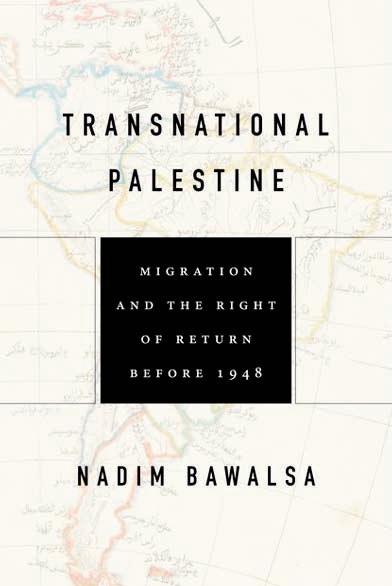
Before the arrival of the British, Palestinians had been voyaging westward in large numbers for decades to make their fortunes as merchants, notably in Latin America. All they needed to set forth (or to return), Bawalsa tells us, were tickets to travel. In 1918, they cheered from afar the victory of their British allies and envisioned an independent Arab state or states, which Britain had solemnly promised as the means to secure the armed support of the Arabs against the Turks.
Ironically, the first sign of trouble was Britain’s insistence that Palestine become a separate mandate territory (along with another mandate for Jordan, and the French mandates for Syria and Lebanon), rather than a small part of Greater Syria,
as it had been traditionally considered. This carving out of Palestine, of course, was intended to facilitate the empowerment of Jewish immigrants. Both Palestinians and Syrians protested this partition at the post-war peace conferences and before the newly founded League of Nations, and they denounced the Balfour Declaration. Their petitions were ignored and their delegations were sent away, despite meticulous presentations and overwhelming arguments on the basis of the Wilsonian right of self-determination—allegedly the League’s most fundamental principle.
The instrument that legally severed transnational Palestinians from what they considered their true homeland was the 1925 Palestinian Citizenship Order-inCouncil, a law tightly focused on the importation of Jewish immigrants to be specially privileged citizens of Palestine. Bawalsa says that the British had scarcely considered the legal status of those living abroad, who had maintained extensive economic, familial and cultural ties with Palestine in what were basically Palestinian communities. In fact, most of these transnationals were from Bethlehem and the adjoining towns of Beit Jala and Beit Sahour. They made their living largely by marketing Holy Land products abroad. Their children continued to marry Palestinians back home, or other Palestinians traveling overseas. Few possessed citizenship in their Latin American host countries.
The Citizenship Order gave British officials virtually unreviewable authority to deny the citizenship applications of nonJews and included absurdly tight deadlines and other onerous and arbitrary pro-
visions to serve as pretexts to deny applications. Less than one percent of citizenship applications were granted to the overseas Palestinians over the course of the British Mandate.
The book draws on thousands of applications, appeals, protests and personal correspondence, in addition to a constant stream of articles in the lively Arab press of Latin America and Palestine. From sophisticated legal and political protests to the raw, anguished and angry cries of people amputated from their roots, British officials heard it all over and over again, in Jerusalem, London and Geneva (the headquarters of the League of Nations). Blatantly unfair, the citizenship process violated Britain’s obligations under the Treaty of Lausanne, which established the rights of former Ottoman subjects in mandate territories.
Bawalsa’s family was not among those exiled tribes of Latin America. He grew up in a Jordanian-Palestinian family in Amman and Cairo. What led him to chronicle the plight of these exiles says a lot about the hidden sympathies that link the millions of diasporic Palestinians and draw the empathy of others. Bawalsa wrote the book, he says, partly “to understand how I see myself and why I continue to identify fundamentally as a Palestinian.” In a moving personal prologue and epilogue, he recounts how a visit to Chile with its 500,000 enthusiastic “Palestinos–Chilenos” intertwined with his own patchwork family narratives to reveal a nation that still strives to be welcomed back to its rightful place among nations.
By Azad Essa, Pluto Press, 2023, paperback, 240 pp. MEB $22.95
On Aug. 5, 2019, the Indian parliament voted to revoke Articles 370 and 35A of the country’s constitution, thereby ending Kashmir’s semi-autonomous status and putting it under New Delhi’s direct control. This latest phase of India’s occupation of Kashmiri land is part of Prime Minister Narendra Modi’s broader goal of inextricably tying Hindu nationalism to the state.
In recent decades, India has deployed various modalities of control over Kashmir to “instill India” into its majority Muslim population. From extrajudicial killings, to demolishing homes, India’s occupation increasingly resembles Israel’s occupation of Palestine. Some in Indian leadership have made this comparison themselves. In November 2019 remarks defending the occupation and settlement of Kashmir, then-Indian Consul-General to the U.S Sandeep Chakravorty said, “If the Israeli people can do it, we can also do it.” Chakravorty’s remarks epitomize the kinship that has been growing between India and Israel for decades.
While Palestinian liberation has largely been a centralizing focus of the global left, Kashmiri liberation is often glossed over, relegated to a “religious dispute” between India and Pakistan. In Hostile Homelands: The New Alliance Between India and Israel, author Azad Essa attempts to shine a light on Indian nationalism by tracing its parallel relationship with Zionism. Essa, a senior reporter for Middle East Eye, reveals how the Indian and Israeli national projects are built on supremacist ideologies which harm Palestinians and Kashmiris living under occupation. He does not, it must be said, equate Hindu nationalism to Zionism. Rather, he makes the comparison between Kashmir and
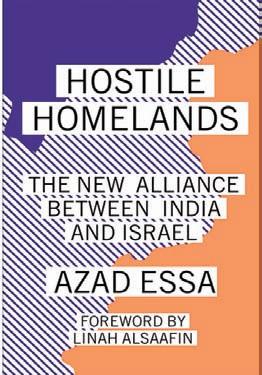
Priya Aravindhan is a rising senior studying anthropology and international affairs, with an interest in the Middle East and South Asia, at The George Washington University. She interned for the Washington Report this spring.
In the Shadow of the Wall: The Life and Death of Jerusalem’s Maghrebi Quarter, 1187-1967 by Vincent Lemire, translated by Jane Kuntz, Stanford University Press, 2023, paperback, 400 pp. MEB $32
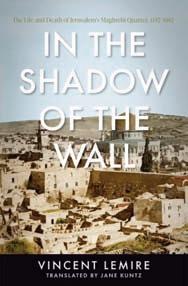
The Maghrebi Quarter of Jerusalem long sat in the shadow of the Western Wall, which many believe is the last vestige of the Second Temple. Three days after the June 1967 War, Israeli forces razed the Quarter, its narrow alleys widened and homes removed, to create the Western Wall Plaza. With this book, Vincent Lemire offers the first history of the Maghrebi Quarter, beginning 800 years ago with its founding by Saladin. To bring this vanished district back to life, Lemire gathers its now-scattered documentation from archives in Jerusalem, Geneva, Istanbul and elsewhere. He also engages testimonies of former residents and looks to recent archaeological digs that have resurfaced household objects buried during the Quarter’s destruction. The Western Wall is one of the most identifiable places in the world, yet one of the most occluded in history. In the Shadow of the Wall offers an essential new point of entry to understand this consequential place.
A Stranger in Your Own City: Travels in the Middle East’s Long War by Ghaith Abdul-Ahad, Knopf, 2023, hardcover, 432 pp. MEB $28
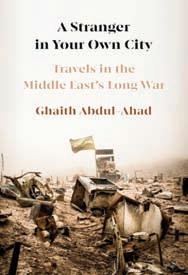
A Stranger in Your Own City is award-winning writer Ghaith Abdul-Ahad’s vivid, shattering and personal response to Iraq’s modern tragedy. When the U.S.-led “Shock and Awe” campaign began in March 2003, AbdulAhad was an architect. Within months he become a translator, then a fixer, then a reporter for The Guardian and elsewhere, chronicling the unbuilding of his centuriesold cosmopolitan city. Abdul-Ahad’s book does not retell the history of the invasion and war. Rather, it decenters the West and instead focuses on everyday people blown sideways through life by the war. This is their Iraq, seen from the inside: the human cost of violence, the shifting allegiances, the generational change. A Stranger in Your Own City is a rare work of beauty and tragedy whose power and relevance lie on its attempt to return the land to the people to whom it belongs.
The Baghdad Villa: A Novel by Zuheir El-Hetti, translated by Samira Kawar, Interlink, 2023, paperback, 224 pp. MEB $17
This novel is set in Baghdad following the 2003 American invasion. At the center of the narrative is a young woman, Ghosnelban, who belongs to what would have been an aristocratic family under the former Iraqi monarchy and sees herself and her family as guardians of an aristocratic code of noble values and traditions. She witnesses her world and family life collapsing as the violence around her intensifies. The story encompasses three generations of the same family and shows the effects of successive coups and wars on Iraqis. Ghosnelban interprets the events unfolding around her through detailed descriptive analysis of seven paintings hanging on the walls of a formal reception room in the family’s palatial villa. The family’s struggle to survive in many ways embodies the wider ruination impacting Iraq.

Palestine to illustrate how oppressive methods are shared, duplicated and justified. Crucially, he suggests that the Palestinian experience can offer a window into the future of Kashmir.
Essa provides critical background to help readers understand the roots of the Israel-India partnership. After British colonialism, India’s first Prime Minister Jawaharlal Nehru explicitly positioned the country as a supporter of Palestine. Both Nehru and Mahatma Gandhi rejected pleas from Jewish intellectuals such as Martin Buber to support Zionism. Even though India recognized Israel as a country in 1950, India’s leaders continued to support Palestinians publicly. However, privately, India realized that strengthening ties with Israel could advance the country’s national project. India started securing armaments from Israel in 1962, and after the 1967 Six-Day War, Indian officers studied military tactics in Israel. In explaining these dynamics, Essa outlines New Delhi’s belief that “India could simultaneously trade in weapons and surveillance technology with Israel while remaining ‘a friend’ to the Palestinians.”
In 1992, under Prime Minister Rajiv Gandhi, India and Israel finally established full diplomatic ties. Essa shows how this act of normalization was motivated in part by India’s desire to integrate into the global economy. Military relations are at the heart of this enhanced economic relationship, in which India uses Israeli technology to control Kashmir, and Israel benefits by selling its “defense” research. “Between 2003 and 2013, India became the single largest purchaser of Israeli arms,” Essa writes.
Modi’s ascent to the premiership in 2014 only cemented the India-Israel relationship, and his liaisons with Israeli Prime Minister Binyamin Netanyahu marked India’s abandonment of Palestinians. The two leaders “recognized in each other the single-minded determination to build states with a single culture, a single race and a single nation,” Essa observes.
Essa importantly points out that the ideological kinship between Israel and India precedes its political partnership. In fact, Essa notes that Vinayak Savarkar, the
founder of Hindutva (the ideology of the Hindu right), wrote his manifesto in 1923, the same year that Revisionist Zionist Ze’ev Jabotinsky wrote the “Iron Wall” essay defending the use of force against Palestinians.
Hostile Homelands is an important work that contextualizes the project of India’s occupation of Kashmir in relation to Israel’s colonization of Palestine. Essa reveals that Modi’s Bharatiya Janata Party and Netanyahu’s Likud Party are not exceptional to Indian and Israeli liberal democracy. Rather, these far-right parties are able to openly articulate what has always been latent in their national movements. Couched in the democratic, liberal international order, India and Israel are given a pass for their authoritarian, expansionist regimes. However, Essa’s scholarship allows us to question the post-colonial national model which has allowed India and Israel to commit legal violence against those they deem inferior—Muslims, Kashmiris, Arabs and Palestinians.
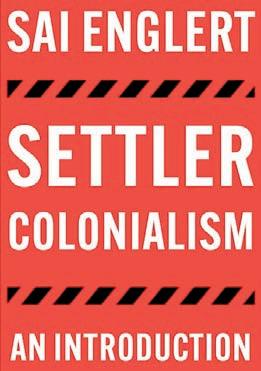
By Sai Englert, Pluto Press, 2022, paperback, 304 pp. MEB $22.95
Reviewed by Walter L. Hixson
Over the past decade, the concept of settler colonialism has risen to the forefront as a paradigm for understanding myriad conflicts over the sweep of world history. Indeed, from ancient times to modern day Palestine, settler colonialism has ignited devastating ethnic conflicts and struggles between indigenous people and exogenous interlopers.
The essence of settler colonialism is the invader’s determination to drive indigenous residents from the land to establish permanent settlements of their own. The removal process is replete with violence and claims of settler legitimacy.
Contributing editor Walter L. Hixson is the author of American Settler Colonialism: A History, along with several other books and journal articles. He was a professor of history for 36 years, achieving the rank of distinguished professor.
It is the drive for permanent occupation, as opposed to mere exploitation of land, resources and labor, that distinguishes settler from traditional, or what Sai Englert calls “franchise colonialism.”
In the opening pages of Settler Colonialism: An Introduction, Englert deftly underscores the relentlessness of the settler drive to accumulate land and the moral blindness of settler projects. Settler colonialization invariably spurs indigenous resistance, which in turn prompts violent settler repression backed by racist discourses and claims as to the inevitability and justifiability of settler domination.
The author analyzes the ways in which even internal conflicts among settlers are often resolved “on the backs of indigenous workers and communities through the intensification of their dispossession, exploitation and/or expulsion.” In the concluding chapter, he emphasizes the central role that settler colonial dispossession and accumulation have played in shaping exploitative capitalism and its global reach. At the same time, however, that exploitation has continued to spur resistance that is as relentless as the settler invasions that spawned the native backlash.
Englert, a lecturer at Leiden University in the Netherlands, targeted the book for readers who are unfamiliar or seeking a more complete grasp of settler colonialism. The author succeeds in his mission to facilitate “broader popular understandings of settler regimes and the struggles against them.” Knowing the basics about settler colonialism empowers efforts to engage in social movements, political struggles and solidarity campaigns. It also
serves to underscore connections between otherwise disparate indigenous struggles across the world and over a long historical sweep.
The book ranges widely, including a focus on Palestine, which is a classic case of settler colonization. The designation is important, as Englert notes, because the Palestine struggle continues to be misunderstood “either as a fragmented territory under occupation, or as contested by two peoples with equal and conflicting claims.”
The study does not focus primarily on the Middle East but rather spans the globe, including settler colonial exploitation and resistance struggles from the Americas to South Africa to Ireland. Englert also emphasizes the ways in which settler regimes emerged, developed and intersected with other “structures of domination,” notably “capitalism, imperialism, racism, sexism and nationalism.”
Based on select secondary sources, the study, as the author acknowledges, is “not an original piece of research, nor does it claim to break new ground.” Nonetheless, Englert achieves his purpose of providing a clear and readable overview underscoring the importance of understanding settler colonization. ■
Put the Washington Report on Middle East Affairs to work for you!
Have you thought about advertising your company, charity, book, craft, skills or personal service with us—but have never gotten around to it? For information on prices and deadlines, please visit https://www.wrmea.org/u9r3 or email advertising@wrmea.org or call (202) 939-6050 ext. 1105. We will help make your advertising effective. (We offer a 30 percent discount on combinations of print and online banner advertising!)
The Quiet Violence of Empire: How USAID Waged Counterinsurgency in Afghanistan by Wesley Attewell, University of Minnesota Press, 2023, paperback, 328 pp. MEB $35
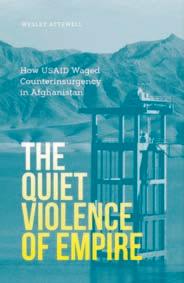
Established in 1961 by President John F. Kennedy, the United States Agency for International Development (USAID) is often viewed as an extension of the security state, having played a constant role on the ground in Afghanistan since the early 1960s. The Quiet Violence of Empire traces USAID’s long and bloody history of development work in the region, revealing an empirically rich account of the transnational entanglements of imperialism. Attewell carefully analyzes three chronological moments of development as counterinsurgency in action: the Helmand Valley Project, the Soviet-Afghan conflict and the post-9/11 occupation of Afghanistan. These case studies expose how USAID’s very public commitment to bringing seemingly inclusionary forms of self-help, technical assistance and market development to Afghanistan failed. Attewell exposes how one of the net effects of USAID’s development mission to Afghanistan has been to constrain the life chances of Afghan beneficiaries while simultaneously diverting development capital back to U.S. contractors, deftly underscoring the notion of development as a form of slow violence.
Homeland: My Father Dreams of Palestine by Hannah Moushabeck, illustrated by Reem Madooh, Chronicle Books, 2023, hardcover, 40 pp. MEB $18.99

As bedtime approaches, three young girls eagerly await the return of their father who tells them stories of a faraway homeland: Palestine. Through their father’s memories, the Old City of Jerusalem comes to life—the sounds of juice vendors beating rhythms with brass cups, the smell of argileh drifting through windows and the sight of doves flapping their wings toward home. These daughters of the diaspora feel love for a place they have never been, a home they cannot visit. But, as their father’s story comes to an end, they know that through his memories, they will always return. With heartfelt illustrations by Reem Madooh, this story is a love letter to home, to family and to the persisting hope of people that transcends borders. All young children are sure to be enriched by this entertaining yet impactful story.
Forever Beirut: Recipes and Stories from the Heart of Lebanon by Barbara Abdeni Massaad, Interlink, 2023, hardcover, 256 pp. MEB $35
Beirut is the culinary capital of the Arab world, with an unmatched cuisine that has ancient roots and is influenced by a number of civilizations and cooking styles, including Arab, Turkish and French. Written by renowned Lebanese chef and award-winning cookbook writer Barbara Abdeni Massaad, Forever Beirut is a collection of 100 easy-to-prepare recipes that celebrate Beirut’s rich culinary heritage and its resilience amid political and economic upheaval. The cookbook is Massaad’s way of honoring the city of her childhood, her dreams, her Lebanese family kitchen and the food that roots her. With sections for soups, salads, breads and savory pastries, mezze, kibbeh, grilling, main dishes, pickles and preserves and sweets, there is something for everyone to enjoy in Forever Beirut

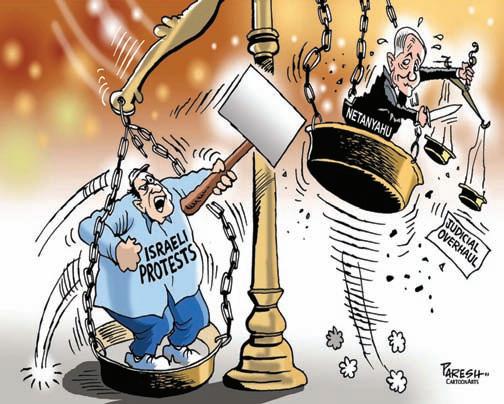
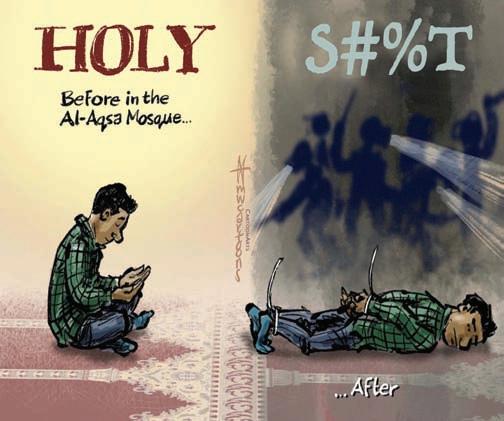
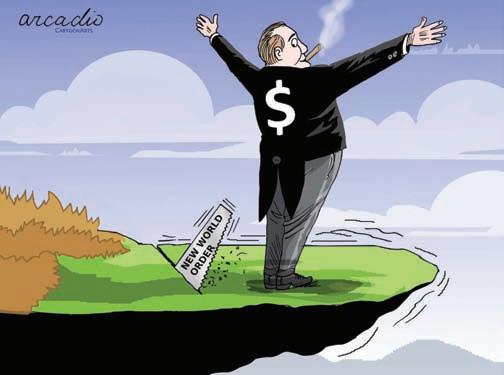
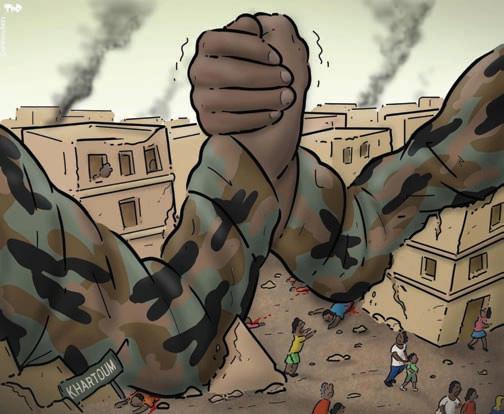
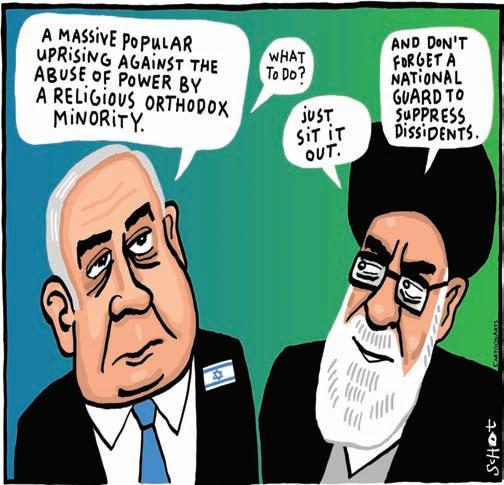
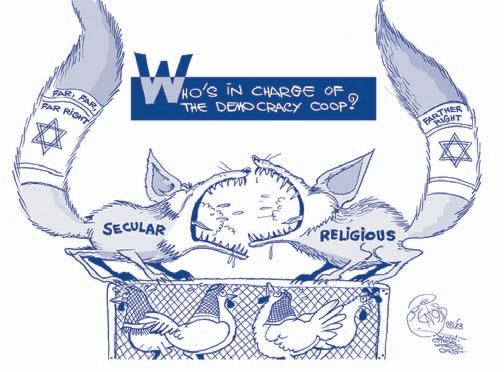

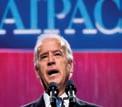
To the Longview News-Journal, April 12, 2023
Recently, during the Muslim holy month of Ramadan, Israeli troops stormed into the al-Asqa Mosque in Jerusalem and attacked worshippers with tear gas, rubber bullets and bludgeoned them with their batons.
Naturally, this did nothing to deescalate tensions, and a few rockets were fired at Israel and then Israel began bombing the largely defenseless population in Gaza. Israel also bombed Syria and Lebanon, as well.
These exchanges follow a pattern. Israel’s leaders need a distraction from civil unrest—so an event to guarantee a Palestinian response (in this case attack the people praying in a mosque), then when there is a response, start bombing Gaza again.
Our media follows a similar playbook in reporting these flareups. First, give no context of the provocation or minimize it if mentioned at all. Focus on the Palestinian response and characterize them as militants or terrorists.
Use large headlines, something along the lines of “Hamas fires rockets at Israel.” Then report that Israel was forced to bomb Gaza again—the most densely populated open-air prison on the planet. As Kurt Vonnegut would say, “And so it goes.”
Jerry King, Longview, TXTo the Concord Monitor, April 13, 2023
PRESIDENT
VICE
JOE BIDEN PRESIDENT KAMALA HARRISWASHINGTON, DC 20500
WWW.WHITEHOUSE.GOV/CONTACT
ANY MEMBER: U.S. HOUSE OF REPRESENTATIVES WASHINGTON, DC 20515 (202) 225-3121
When I first read Jimmy Carter’s 2006 book, Palestine: Peace Not Apartheid, I was impressed with its power and honesty. Recently, I was reminded of it by reading Allan Brownfield’s article, “Jewish Community Smears Carter with Charges of AntiSemitism,” in the May 2023 Washington Report. Brownfield said Carter “always insisted that Israel was obligated to suspend building new settlements on the West Bank.” He also said Carter warned that Israel was on the path to establishing an apartheid system by allowing such settlements. International law states that such settlements are illegal.
Three of the world’s largest human rights organizations, Human Rights Watch, Amnesty International, and Israel’s B’Tselem, following extensive research, have concluded that Israel has created an apartheid system that denies Palestinians, including children, of their basic human and civil rights. Resembling South Africa’s former apartheid structure, such a system has marginalized and dehumanized Palestinians as “the other,” less than human.
Having visited the occupied Palestinian territories, I have personally witnessed the apartheid system. It mirrors America’s shameful Jim Crow era of segregation where Black Americans were also deprived of their basic civil and human rights. Based on the fact that the U.N. has declared that apartheid is “a crime against humanity,” and that Israel has established an apartheid system, this means Israel’s claim to be a “democracy” is false. Moreover, let it be said that “a democracy is a state of all its people,” which Israel is not. Candidly, sadly, Israel is not a democracy.
Will Thomas, Auburn, NH
SECRETARY OF STATE ANTONY BLINKEN
U.S. DEPARTMENT OF STATE 2201 C ST. NW WASHINGTON, DC 20520
PHONE: (202) 647-6575
VISIT WWW.STATE.GOV TO E-MAIL
ANY SENATOR: U.S. SENATE WASHINGTON, DC 20510 (202) 224-3121
To The Spokesman-Review, April 6, 2023
A letter (“Some clarification needed,” The Spokesman-Review, March 28) contained inaccuracies regarding Palestinians/Israel. The author stated, “Israel is the only democracy in the region and America’s ally in conflicts against Nazi Germany, the Soviet Union/Russia and Iran.” In regard to the latter, Israel was established in 1948 and was not our ally in the war against Nazi Germany.
As to Israel being a democracy, Israel’s Prime Minister Netanyahu stated in 2019, “Israel is not a state of all its citizens…According to the basic nationality law we passed, Israel is the nation state of the Jewish people and only it,” the Guardian reported.
The letter claims the current “climate” in the region puts the “Palestinian issue” on the back burner, an appalling opinion that ignores conditions under which Palestinians live. Amnesty International systematically examined Israel’s “fragmentation of the Palestinian population into zones of control, dispossession of land and property, segregation, restrictions on economic and social rights, home demolitions and forced evictions, family separations and other human rights violations. The report made a very strong case that such practices collectively constitute the legal definition of apartheid.” Further, Nkosi Zwelivelile stated in the Guardian, in October 2018, “Like (Nelson Mandela), and (Archbishop) Desmond Tutu before me, I see the eerie similarities between Israel’s racial laws and policies toward Palestinians and the architecture of apartheid in South Africa. We South Africans know apartheid
when we see it. In fact, many recognize that, in some respects, Israel’s regime of oppression is even worse.”
John Ludders, Spokane, WATo the Los Angeles Times, April 30, 2023
In his very fine opinion piece, Nicholas Goldberg clearly and forcefully elucidates in historical context Israel’s central political problem: What promised to be a haven for persecuted Jews and a bastion of democracy in the Middle East has become an enemy of its own aspirations.
Its brutal and provocative occupation of the West Bank has become a brutal colonization. This stands in stark contrast to its founding principles for its own citizens.
How very sad and consequential that its government has not yet put in place solid steps that would end the strife by working toward a viable, independent state for Palestinians. The continuance of conflict makes the possibility of a good neighbor for Israel less and less likely.
Kathleen Trinity, Acton, CATo the Los Angeles Times, March 23, 2023
There is only one way to settle the Palestinian situation, and it should have begun in 1948 with the inception of Israel. An international force must take the place of Israeli security the way it did in Berlin in 1945.
Second, the billions in aid given by the U.S. to Israel annually should be suspended until all settlements are abandoned and turned over to the Palestinians who were displaced.
Everyone reading this knows this is the answer, but as long as the inmates are running the asylum, it will not happen.
Chuck Heinz, West Hills, CA
To The Philadelphia Inquirer, April 7, 2023
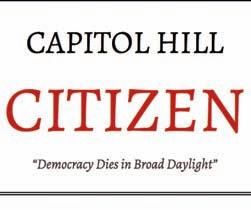
In response to columnist Jonathan Zimmerman and countless others who seem to equate anti-Zionism with anti-Semitism, they are not the same thing and should not be confused as such. Anti-Zionism is a political position. Anti-Semitism is an ethnic or racial position. I am Jewish, but I am not
Zionist. In some ways, I am anti-Zionist, but I am definitely not anti-Semitic. I believe there are many Jews who are not Zionist. That does not make them anti-Semitic. Nor does it make all anti-Zionists anti-Semitic. This distinction is important.
Many Zionists use accusations of antiSemitism against anti-Zionists with a destructive purpose; it paints anti-Zionists with the wrong brush and conflates two important and different issues on purpose.
I do believe that Kareem Tannous’ comments about Israel were anti-Zionist, but I do not see any of the comments/tweets attributed to Tannous as being automatically anti-Semitic.
Jeffrey Plaut, Elkins Park, PA
To The New York Times, March 27, 2023
On the 20th anniversary of the U.S. invasion of Iraq, Bret Stephens still stands by it, yet his argument is weak.
The best case against the invasion was not that it would strengthen Iran (though it did), but that no nation has a right to invade another without legal and moral justification, and it turned out that the U.S. had none.
The rationale then was that Iraq was violating U.N. resolutions by secretly maintaining weapons of mass destruction, which we
(Advertisement)
now know was not true. Without that, the invasion was illegal and morally unjustified.
Mr. Stephens argues that he still supports the invasion because “Iraq, the Middle East and the world are better off for having gotten rid of a dangerous tyrant.” But that boils down to might makes right: The U.S. can invade and topple Saddam Hussain because it has the military power to do so.
Tim Collier, Gardiner, METo the Greenfield Recorder, April 17, 2023
Our country apportioning a large sum of monies to support the weapons industry and the military is a fact that we Americans must address. This budget imbalance was made clear in the Recorder on April 10 in the column “Federal budget: moral or immoral?”
Both of us have been war tax resisters for all our wage-earning lives and now the current military spending is beyond bearable. It does not make sense when there are so many citizens in the United States that are not able to have a whole and healthy life here in their own country.
The snapshot of the federal discretionary budget in that column can bear to be repeated:
For every $100 spent on the Pentagon, for war, weapons, counter-terrorism, military personnel and nearly 800 military bases in 80 countries on six continents, an estimated $6 is spent on international affairs, a fraction of which includes diplomacy. Only $14 is spent on housing in our communities.
Both of us have been resisting the payment of war taxes all our adult lives and now the federal budget is in even more disarray than it was in the 1960s. We can all take a stand to elect federal officials to pull our budget back from this military focus. The people of the United States need our support in so many ways.
President Eisenhower warned us all about the Military Industrial Complex, and— lo, and behold—we are in that fix right now!
If you don’t feel like standing out in protest on a street corner, you can write to your officials. Your words are powerful to them. We think you will find your elected officials are ready to hear you.
Carol and Peter Letson, Greenfield, MA
Now


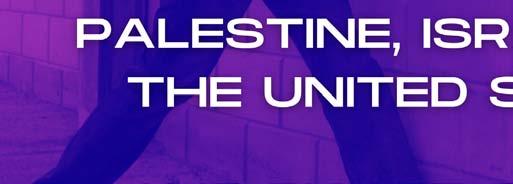
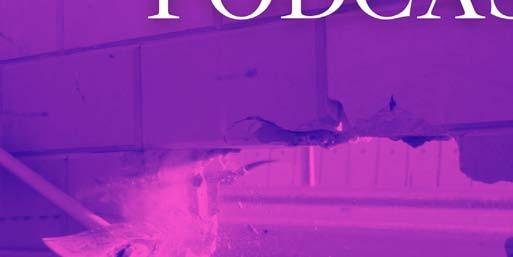
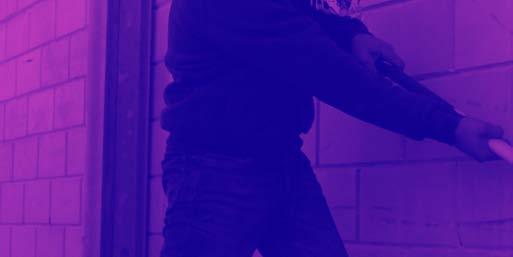


The following are individuals, organizations, companies and foundations whose help between Jan. 1, 2023 and May 6, 2023 is making possible activities of the tax‐exempt AET Library Endowment (federal ID #52‐1460362) and the American Educational Trust, publisher of the Washington Report on Middle East Affairs. Some Angels will help us co‐sponsor the next IsraelLobbyCon. Others are donating to our “Capital Building Fund,” which will help us expand the Middle East Books and More bookstore. We are deeply honored by your confidence and profoundly grateful for your generosity.
($100 or more)
Miriam Adams, Albuquerque, NM
James Ahlstrom, Stirling, NJ
Rashda Albibi, Panama City Beach, FL
James Bennett, Fayetteville, AR
Essa & Najwah Bishara, Greensboro, NC
Kathleen Brewster, Arlington, VA
Raymond Doherty, Houston, TX
Nile El Wardani, San Diego, CA
Nancy Fleischer, Sacramento, CA
Donald Frisco, Wilmington, DE
Dixiane Hallaj, Purcellville, VA
Delinda Hanley, Kensington, MD**, ****
Janis Jibrin, Washington, DC
Akram & Lubna Karam, Charlotte, NC
Mazen Khalidi, Grosse Pointe Farms, MI
Akbar Khan, Princeton, NJ
Eugene Khorey, Homestead, PA
Nabil Khoury, Bloomfield Hills, MI
Edward Kuncar, Coral Gables, FL
Edward Lesoon, Pittsburgh, PA
Marilyn Levin, Ashland, OR
Dr. Moosa Lunat, Stockton, CA*
Mrs. Allen MacDonald, Saratoga Springs, NY
Lucinda Mahmoud, Oceanside, CA
Martha Martin, Kahului, HI
Gwendolyn McEwen, Bellingham, WA
Bill McGrath, Northfield, MN
Sara Najjar-Wilson, Reston, VA
Mounzer Nasr, McLean, VA
Hasan Newash, Detroit, MI
Mary Neznek, Washington, DC
Barry Preisler, Albany, CA
Anis Racy, Canterbury, CT
John Robinson, Somerville, MA
Amb. William Rugh, Hingham, MA
Rafi Salem, Alamo, CA
Ramzy& Janet Salem, Monterey Park, CA
Irmgard Scherer, Fairfax, VA
Janice Terry & Donald Burke, Marietta, OH
V. Vitolins, Grosse Pointe Farms, MI
Mohammed Ziaullah, Montclair, CA
Dr. James Zogby, Washington, DC
($250 or more)
George Aldridge, Bissen, Luxembourg
Larry Cooper, Plymouth, MI##
Hertha Poje, New York, NY
John & Peggy Prugh, Tucson, AZ
William Stanley, Saluda, NC
Raymond Totah, Fallbrook, CA
William Walls, Arlington, VA
John Whitbeck, Paris, France
Lawrence Wilkerson, Falls Church, VA
TENORS & CONTRALTOS
($500 or more)
Michael Ameri, Calabasas, CA
Raymond Gordon, Venice, FL
Wasif Hafeez, W. Bloomfield, MI
Erin Hankir, Nepean, Ontario, Canada
Brigitte Jaensch, Sacramento, CA
Gloria Keller, Santa Rosa, CA
Nidal Mahayni, Richmond, VA
John McLees, Chicago, IL
BARITONES & MEZZO SOPRANOS ($1,000 or more)
Asha A. Anand, Bethesda, MD
Lois Aroian, East Jordan, MI
Nabila El Taji, Amman, Jordan
Ghazy Kader, Shoreline, WA
Jack Love, Kailua Kona, HI
Mary Norton, Austin, TX
Bernice Shaheen, Palm Desert, CA ***
Imad & Joann Tabry, Fort Lauderdale, FL
Branscomb Family Foundation, La Jolla, CA
($5,000 or more)
Fatimunnisa Begum, Jersey City, NJ
Clyde Farris, West Linn, OR**, # Goelet Foundation, New York, NY****
William Lightfoot, Vienna, VA
* In Memory of Farhana (Lunat) Rana
**In Memory of Dick & Donna Curtiss
*** In Memory of Dr. Jack G. Shaheen
****In Memory of John Goelet
# In Memory of Andy Killgore
## In Memory of Diane Rose Cooper
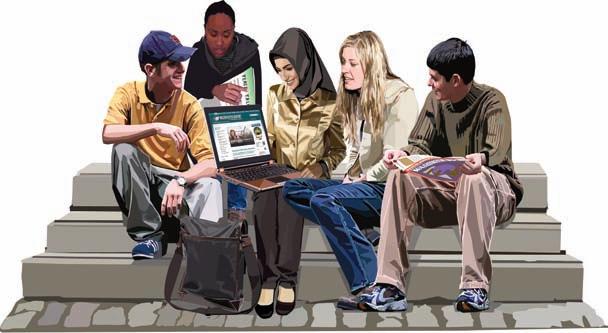
By remembering the WashingtonReport in your will, you can:
• Make a significant gift without affecting your current cash flow;
• Direct your bequest to a vital purpose—educating readers about U.S. foreign policy in the Middle East;
• Receive a charitable estate tax deduction & Leave a legacy for future generations.
Bequests of any size are honored with membership in the American Educational Trust’s “Choirmasters,” named for angels whose foresight and dedication ensured the future of the WashingtonReport and Middle East Books and More. For more information visit www.wrmea.org/donate/bequests.pdf, contact us at circulation@wrmea.org, write: American Educational Trust, PO Box 292380 • Kettering, OH 45429, or telephone our new toll-free circulation number 800-368-5788 • Fax: 202-265-4574.
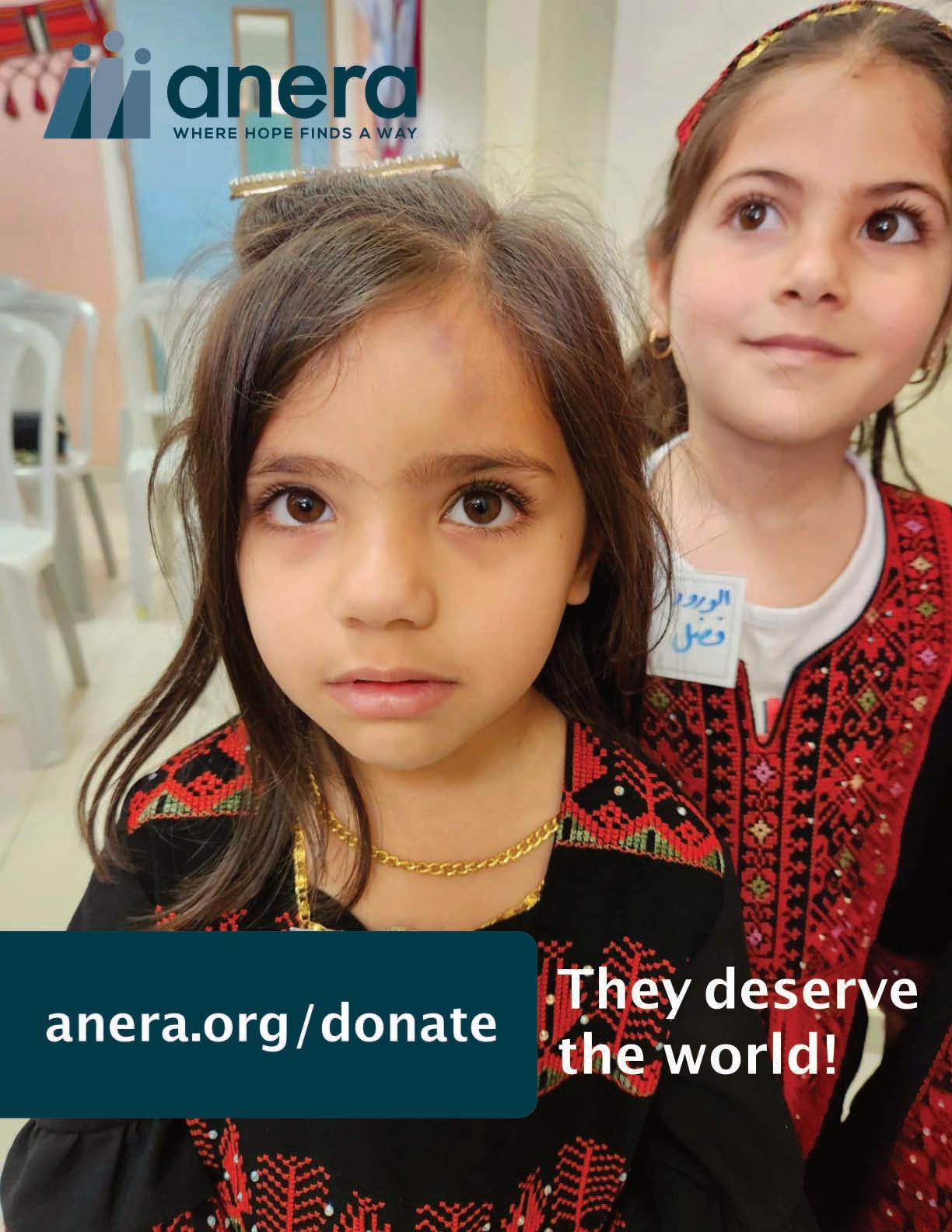
American Educational Trust
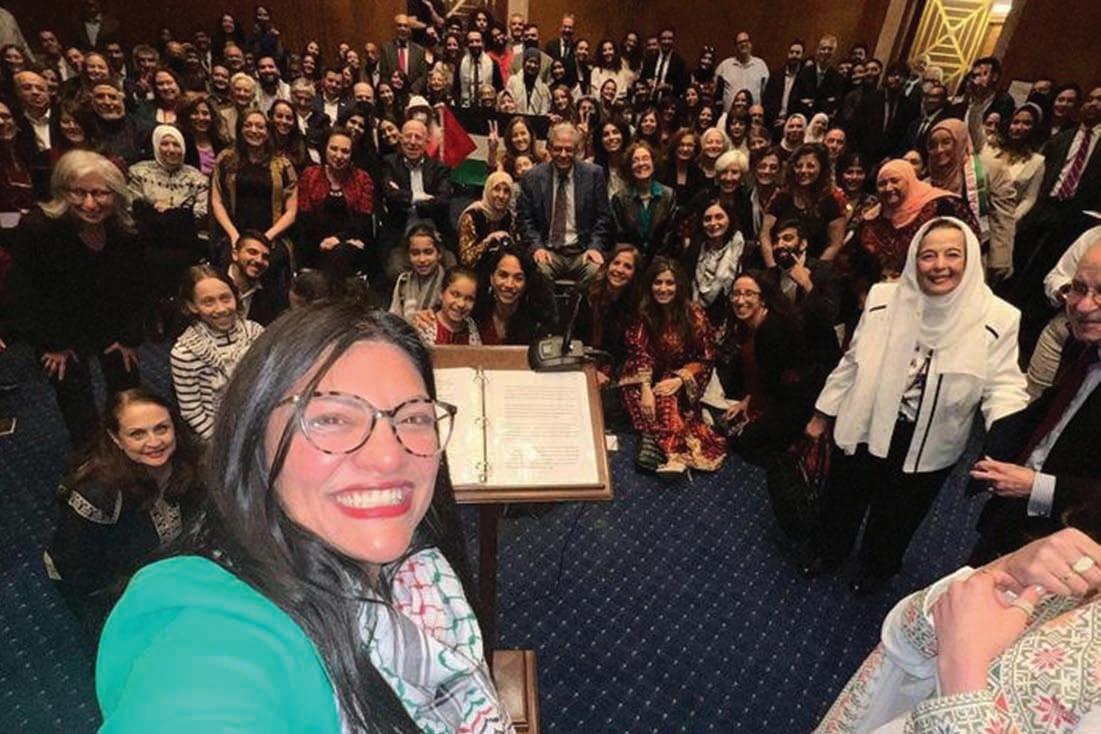
Washington Report on Middle East Affairs
P.O. Box 53062
Washington, DC 20009
June/July 2023
Vol. XLII, No. 4
House Speaker Kevin McCarthy (R‐CA) tried to block an educational event on the Nakba scheduled to take place at the Capitol Visitor Center on May 10. McCarthy’s shenanigans backfired. Not only did the event take place, with moving testimony from Rep. Rashida Tlaib (D‐MI), activists and Nakba survivors, but there was a huge spike in Google search interest for the Nakba. (TWITTER.COM/REPRASHIDA)